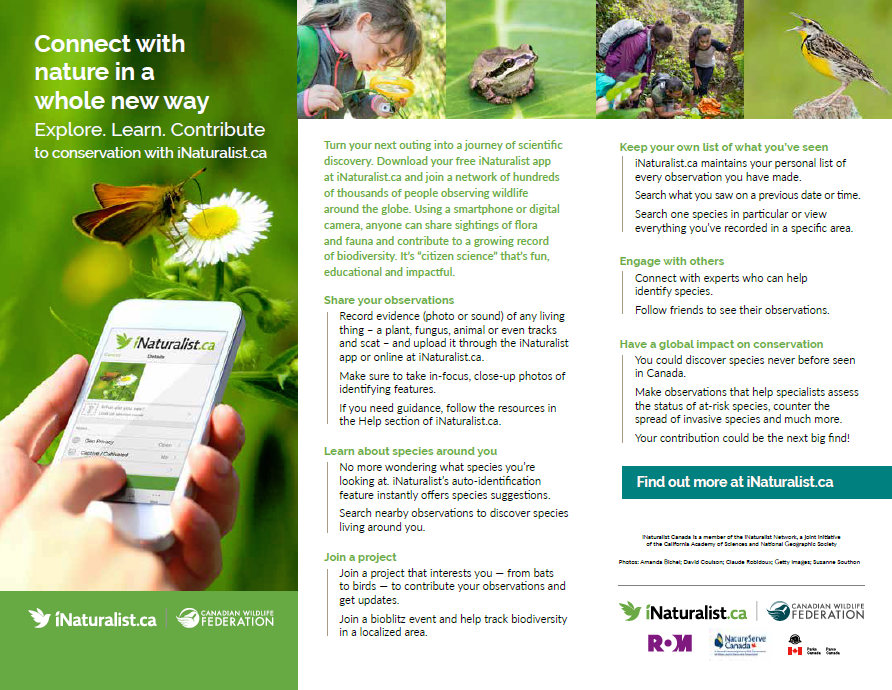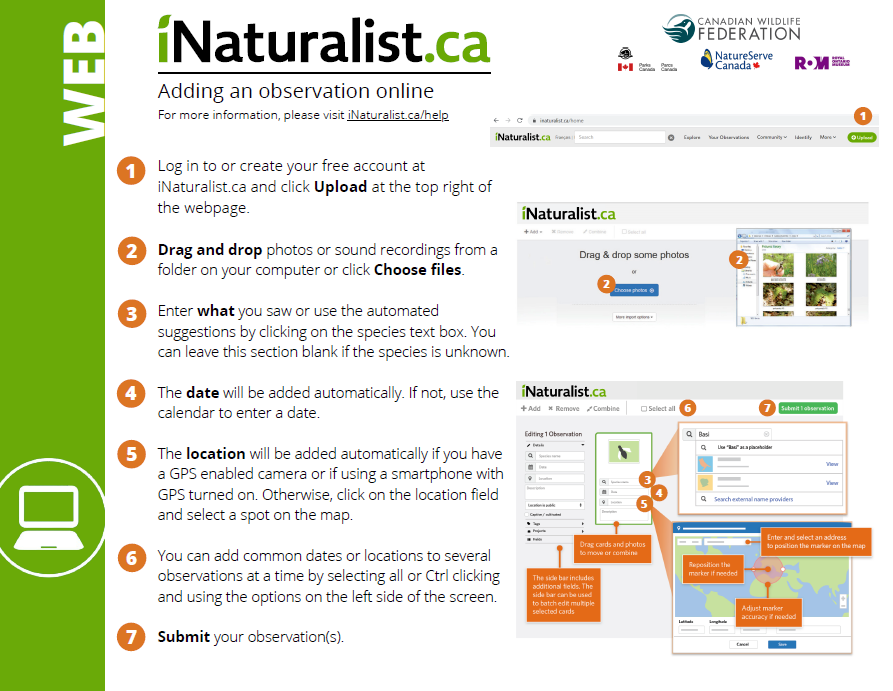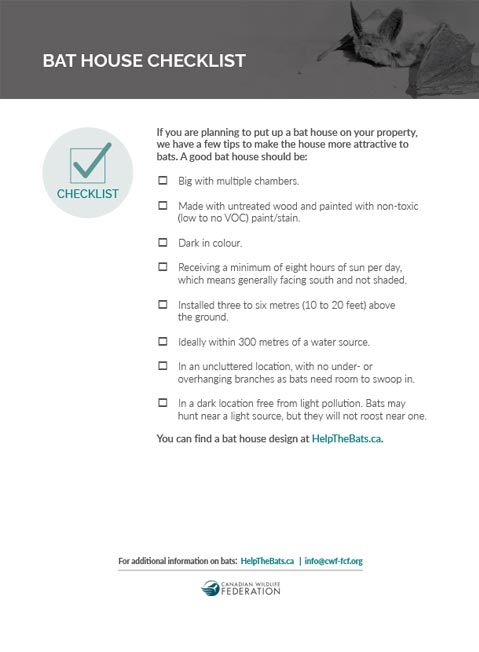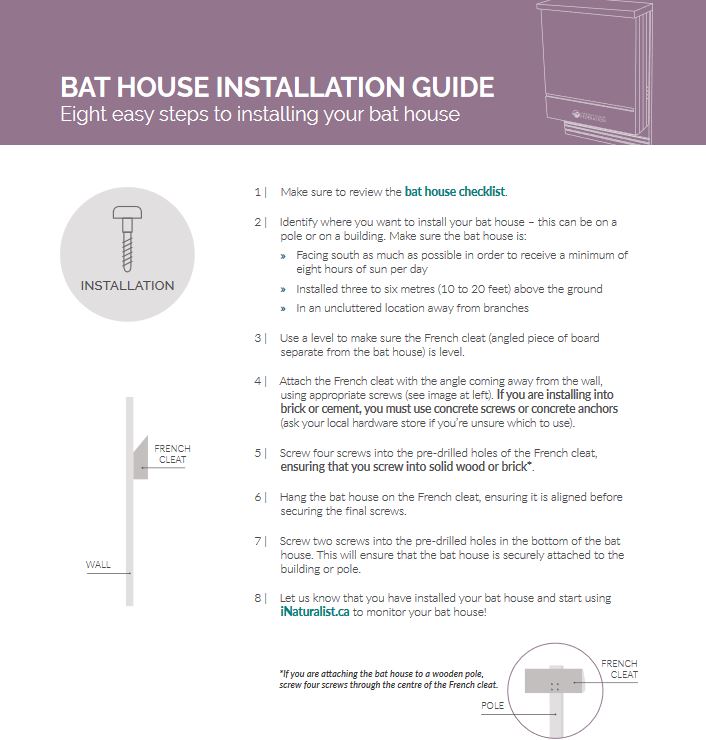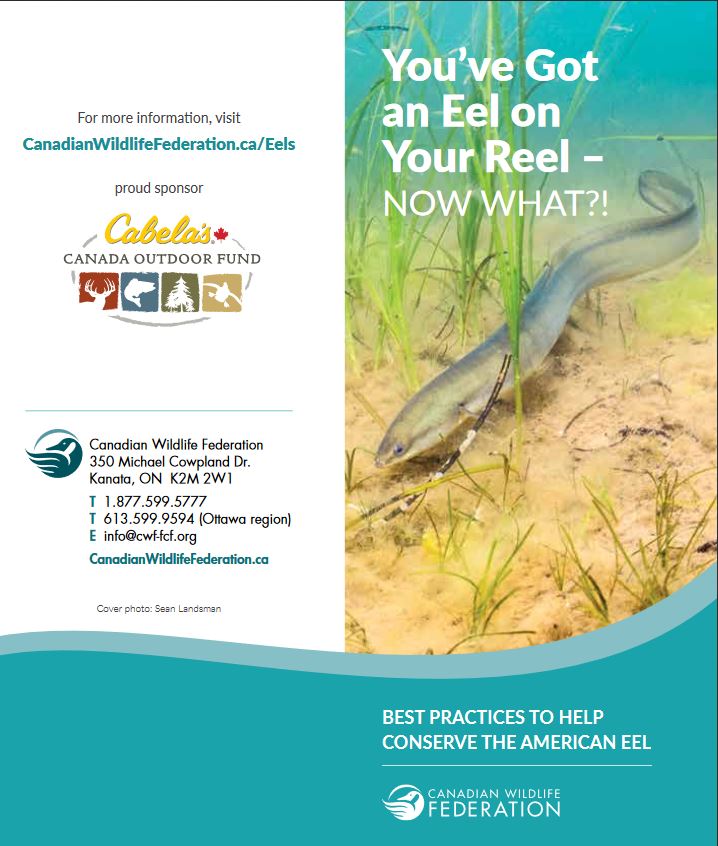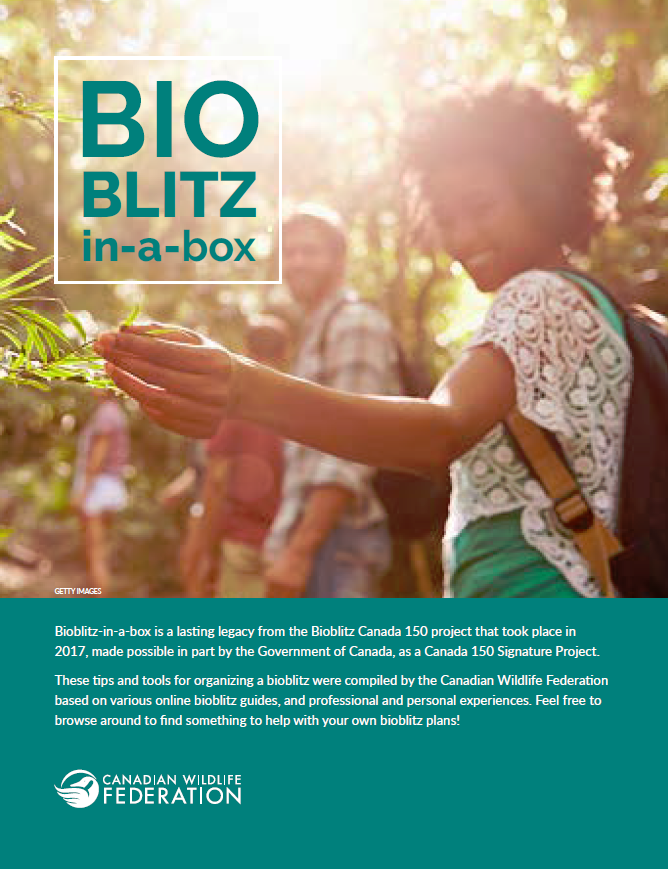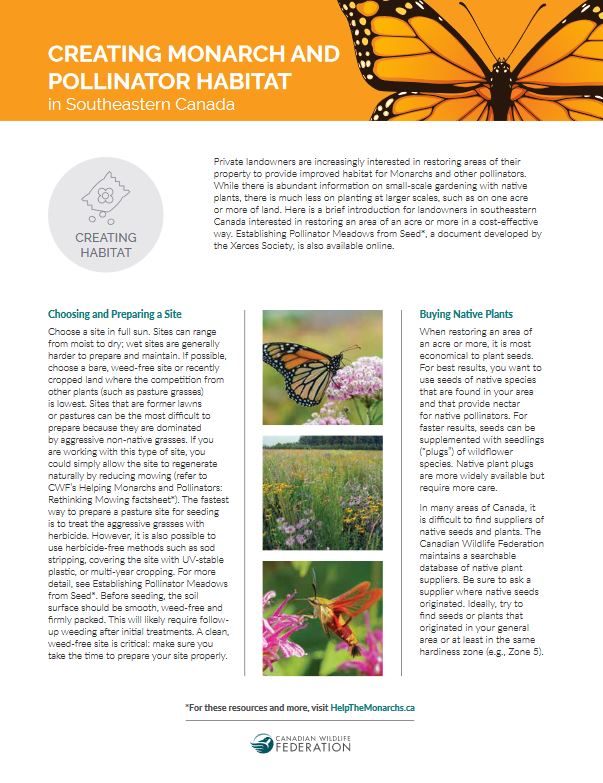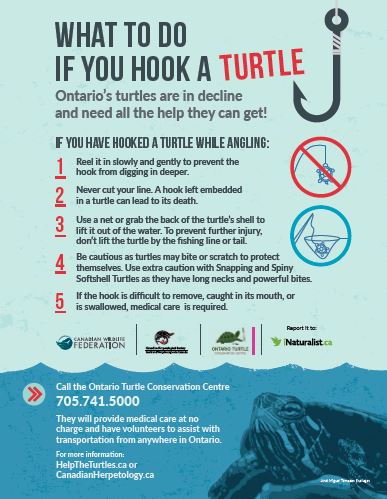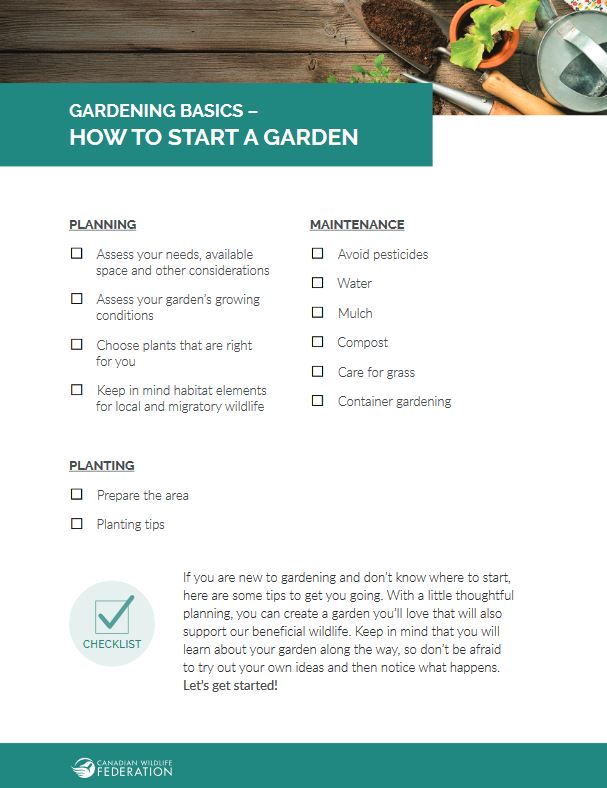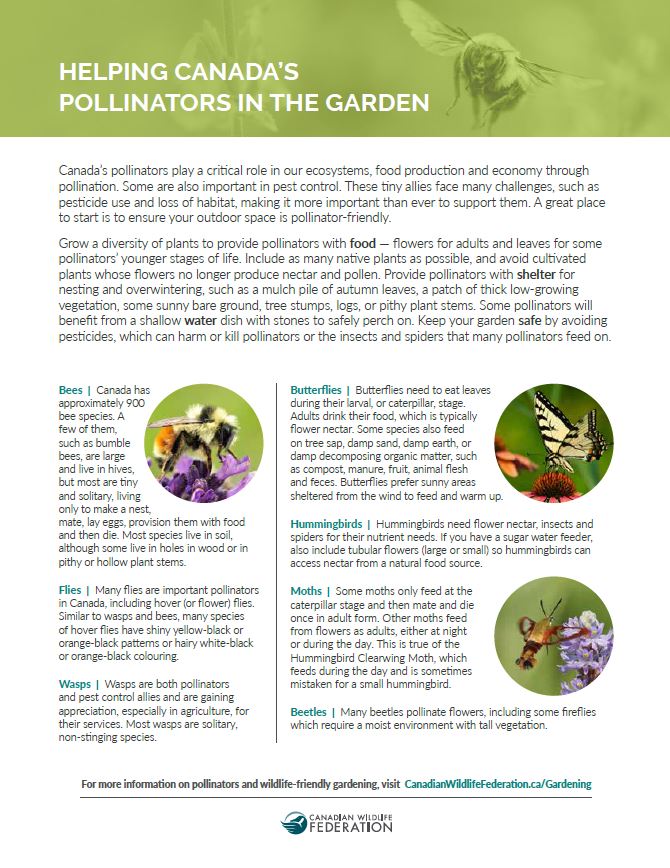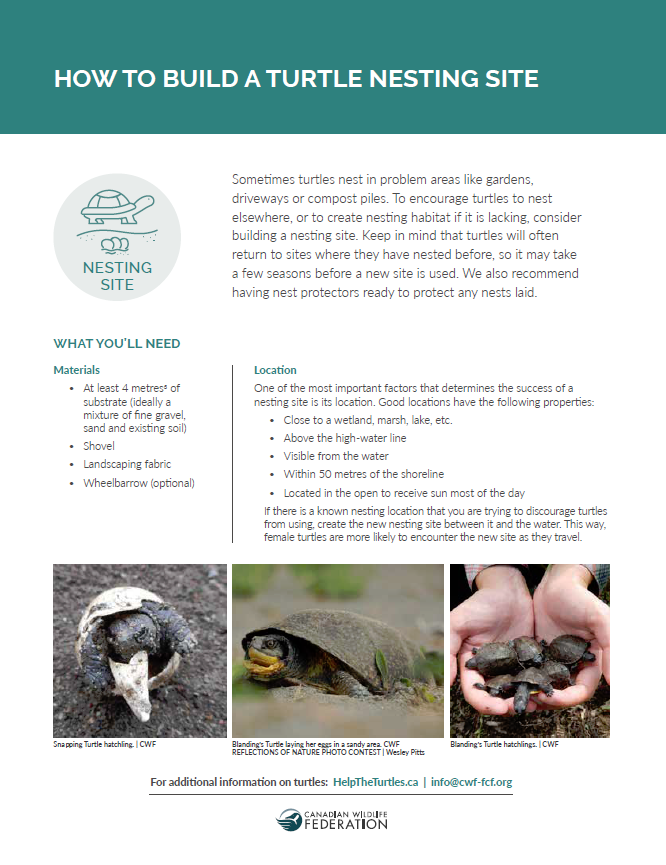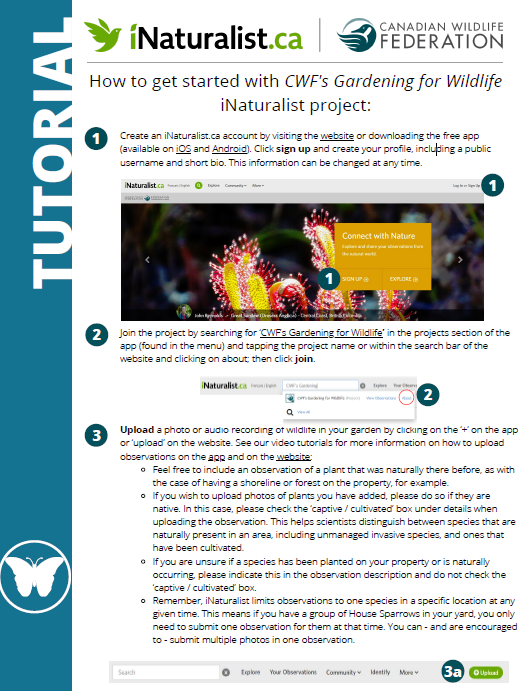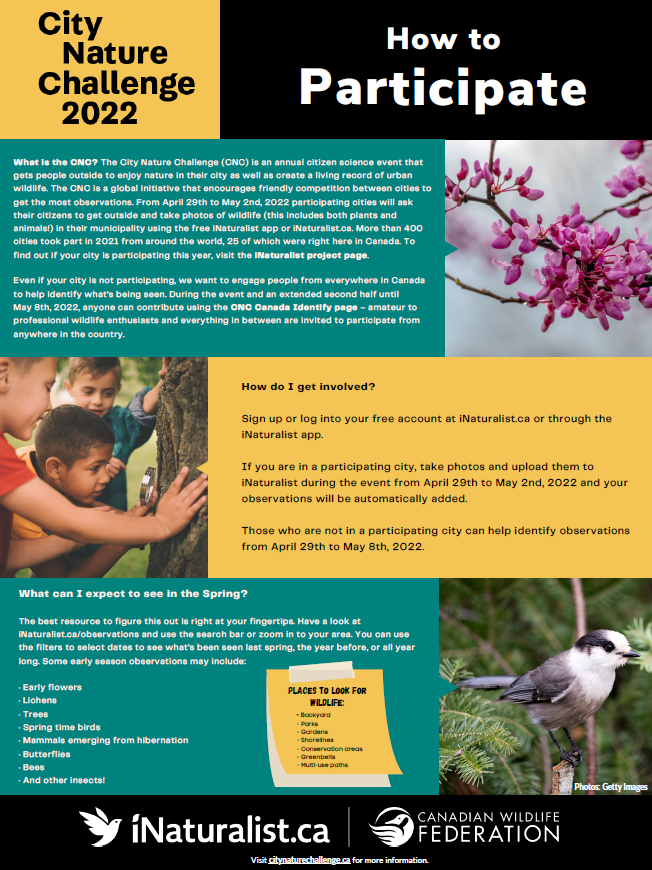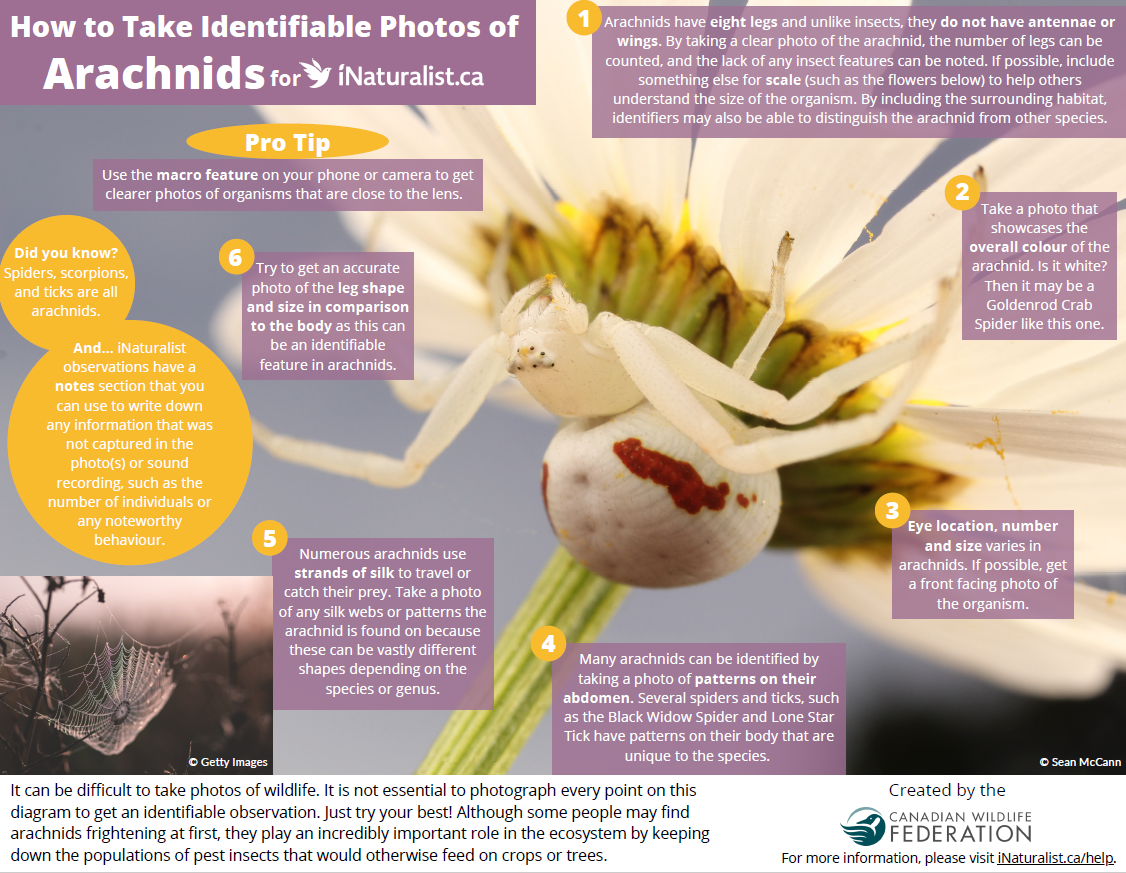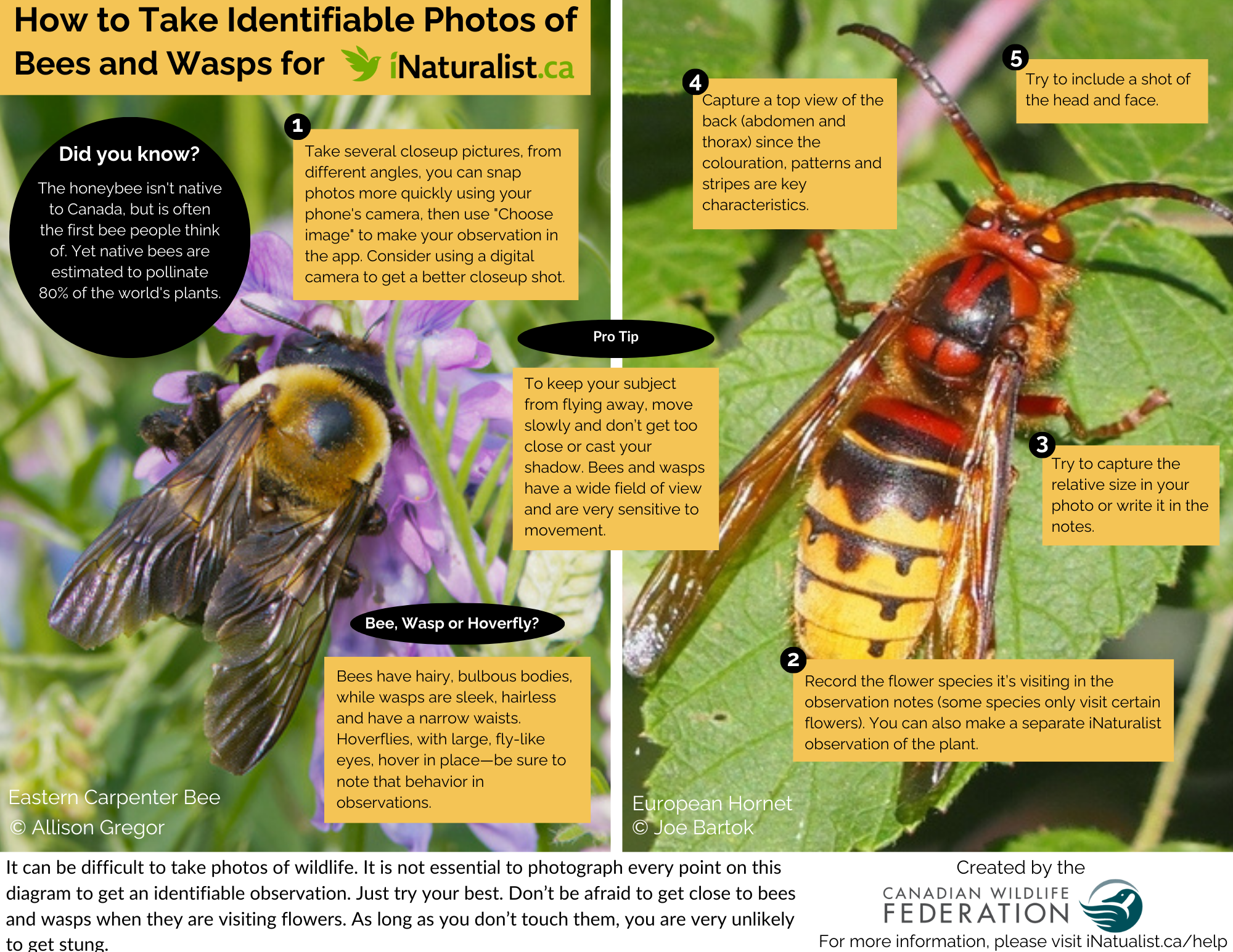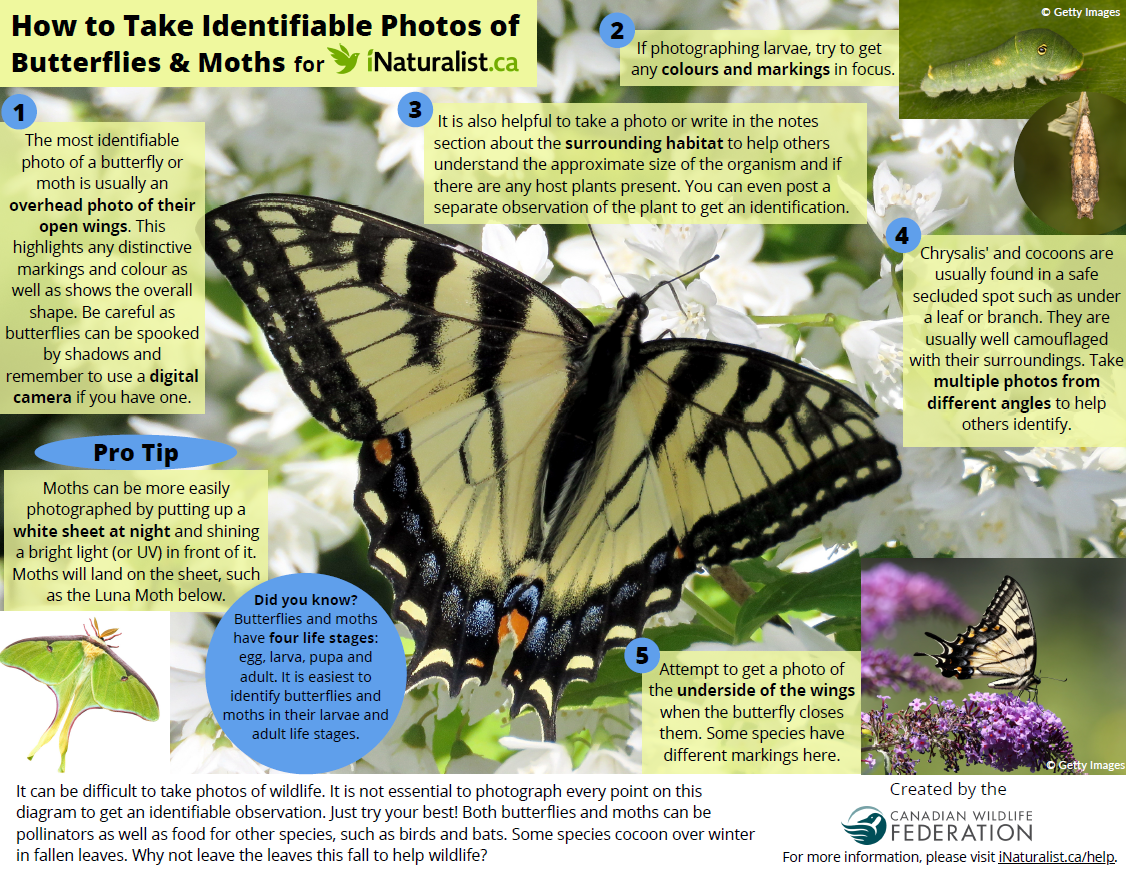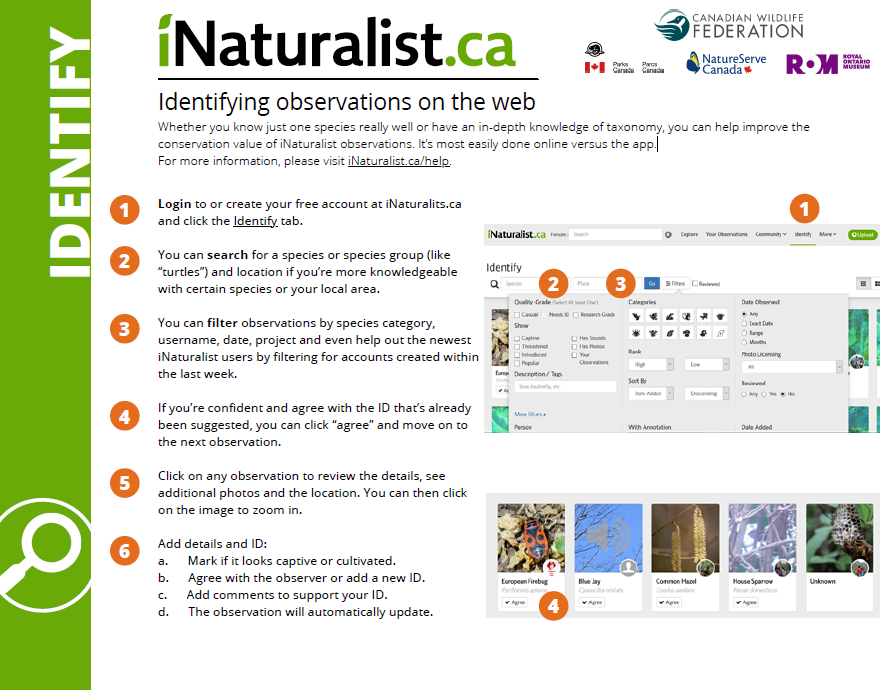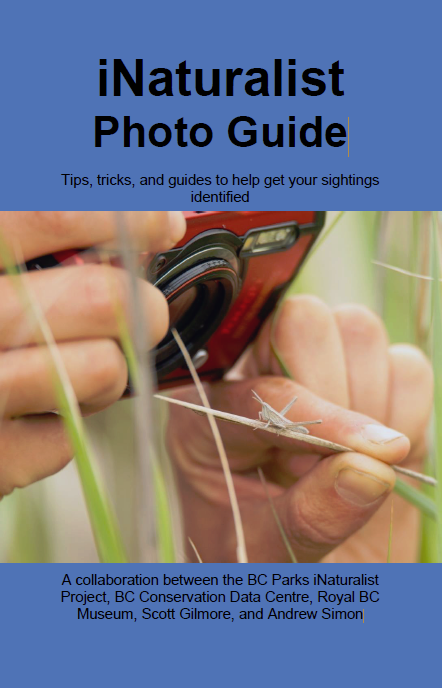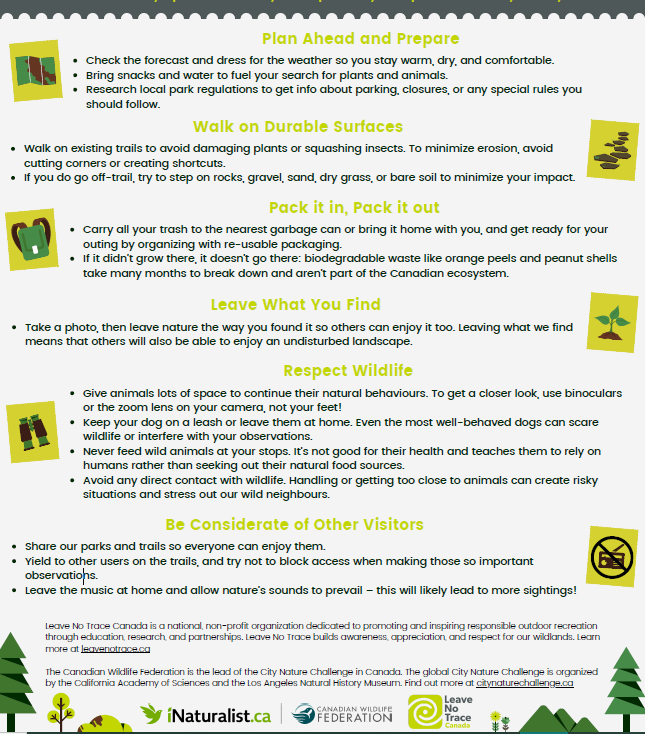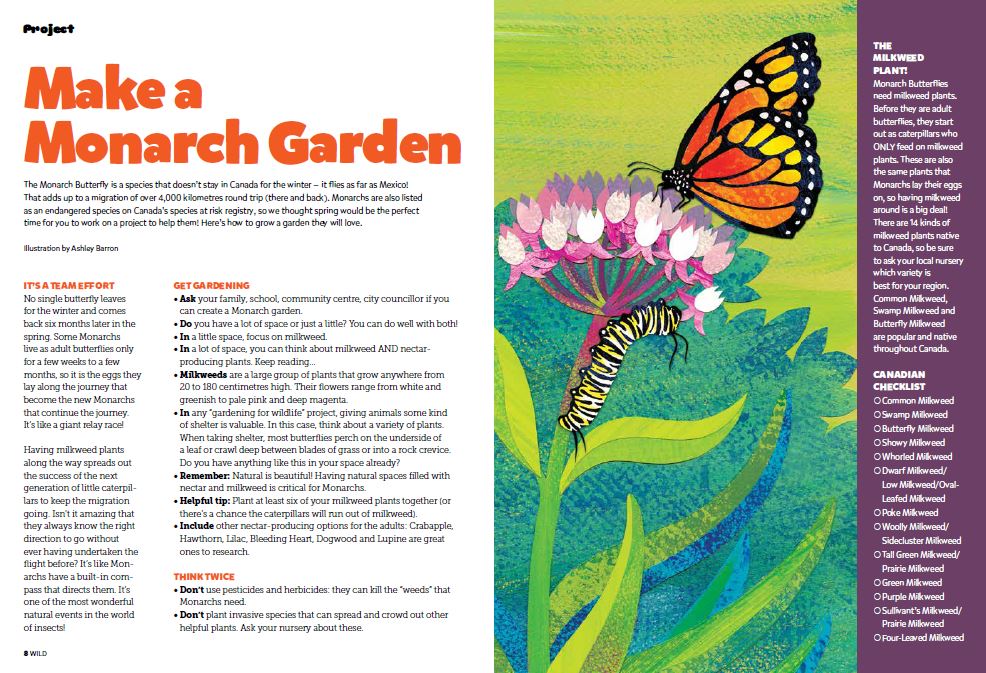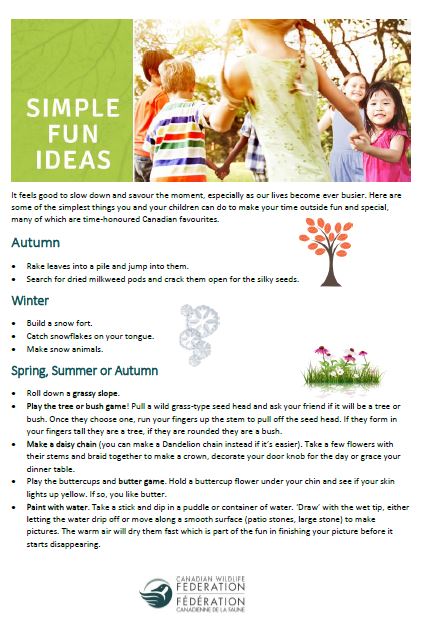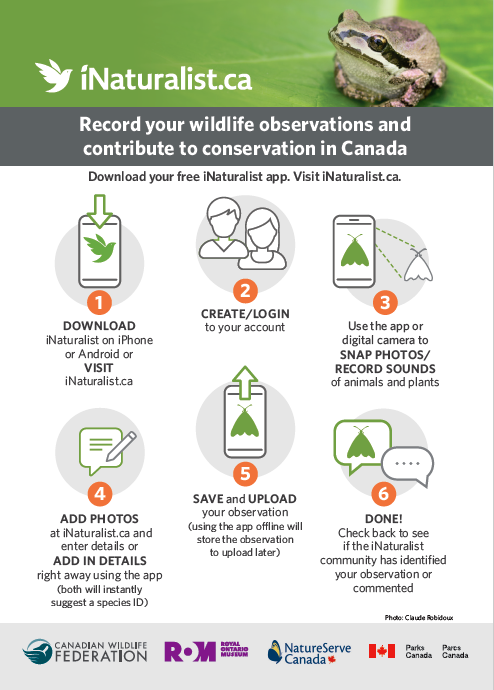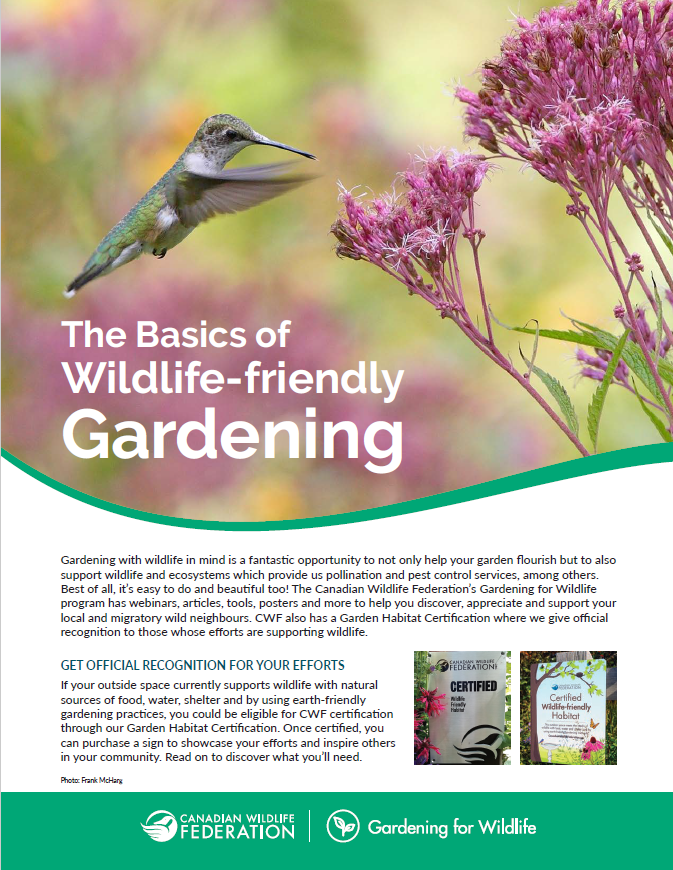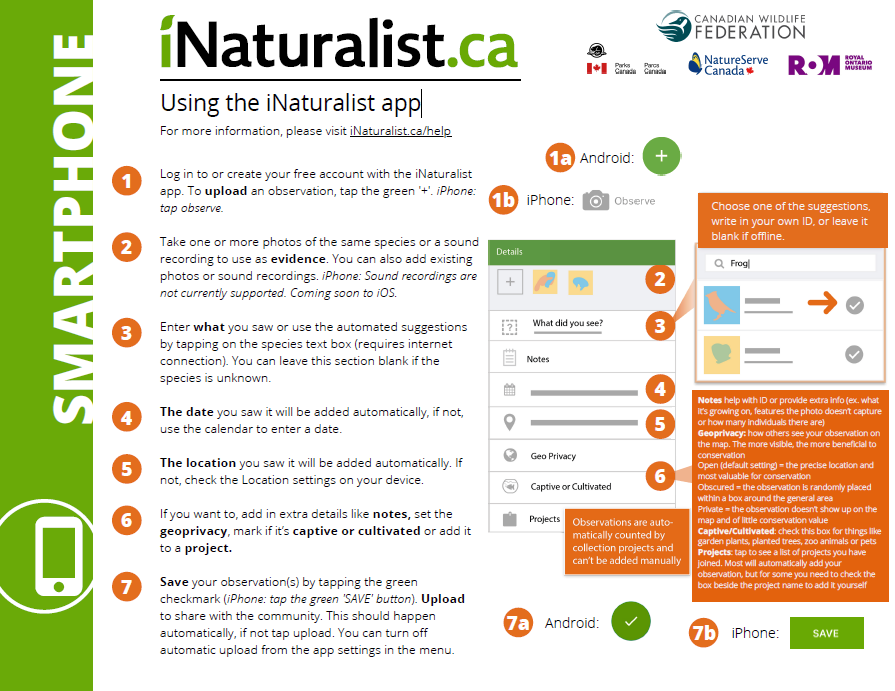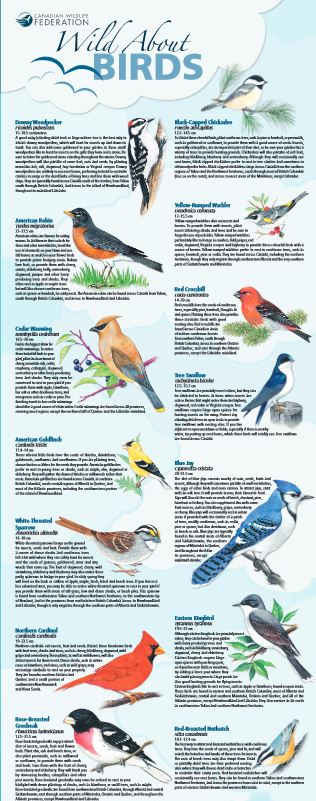From easy-to-use apps designed as tools for your citizen science projects to picturesque wallpaper images for your computer, CanadianWildlifeFederation.ca offers a variety of useful downloads for your PC and mobile devices.
-
About iNaturalist.ca
2021-03-01
Turn your next outing into a journey of scientific discovery. Download your free iNaturalist app at iNaturalist.ca and join a network of hundreds of thousands of people observing wildlife around the globe. Using a smartphone or digital camera, anyone can share sightings of flora and fauna and contribute to a growing record of biodiversity. It’s “citizen science” that’s fun, educational and impactful.
-
Adding an observation online
2021-04-13
-
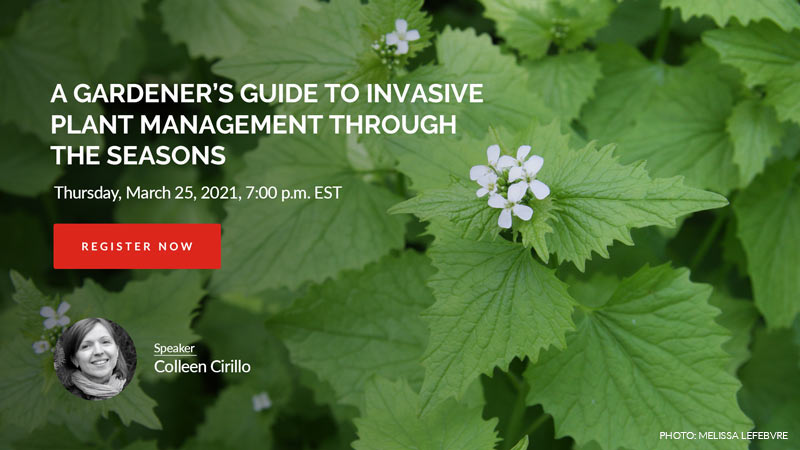
A Gardener's Guide to Invasive Plant Management Through the Seasons
2021-03-25
Gardens contribute to our mental and physical well-being, as well as the ecological health of our communities. If left unchecked, invasive plants can diminish these benefits. Join the Canadian Wildlife Federation on March 25 at 7:00 pm EST as invasive plant expert, Colleen Cirillo, provides guidance for the careful identification and removal of some of Canada's most invasive plants from early spring through to late fall. Species to be addressed include Dog-Strangling Vine, Garlic Mustard, Japanese Knotweed, Common Buckthorn and three invasive groundcovers.
-
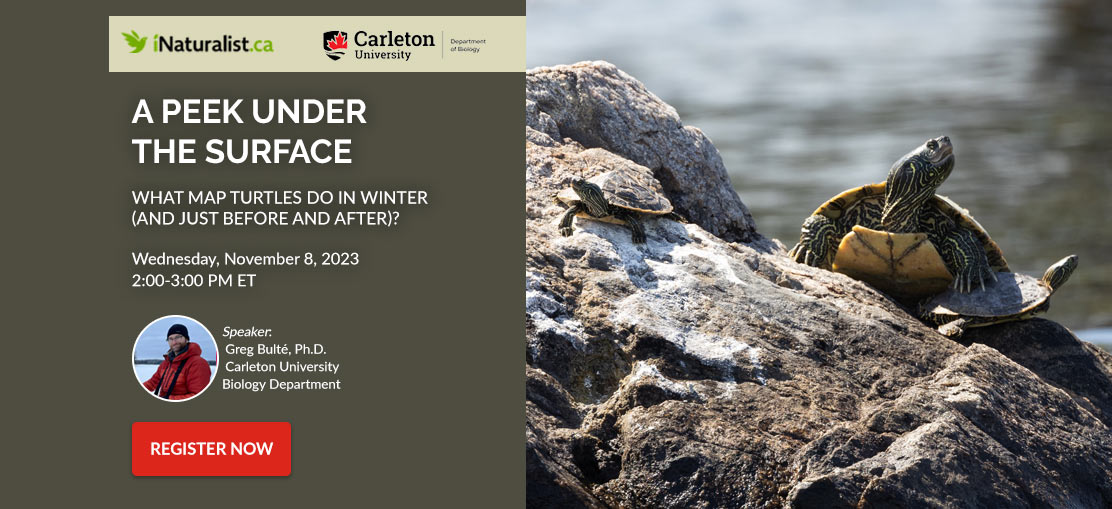
A Peek Under the Surface
2023-11-08
Join us for a look at what map turtles do in winter (and just before and after)? Each fall, Northern Map Turtles get together. In Opinicon Lake, found in eastern Ontario, they come from all over the lake to meet where they will spend the winter months under the ice. From November to April, they are nowhere to be seen. What are they doing under the surface of the water? Under the ice? Contrary to common belief, they are not just buried in the muck waiting for spring. This is a time of love, physiological challenges, and sometimes death.
-
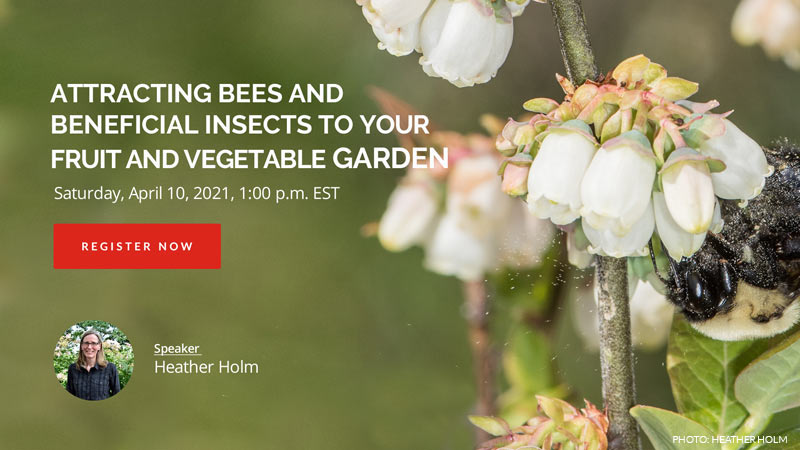
Attracting Bees and Beneficial Insects to Your Fruit and Vegetable Garden
2021-04-10
Saturday, April 10, 2021 at 1:00 p.m. EST. Join the Canadian Wildlife Federation as Heather Holm, researcher and award-winning author, shares her valuable insights on supporting bees and other beneficial insects. Learn about the importance of insect pollination and the bees responsible for pollinating the fruits and vegetables we grow in both home and commercial landscapes. Heather will discuss the genera of bees responsible for the majority of the pollination and the additional forage (flowering plants) you need to provide to ensure that the 'flower buffet' is always open, even when the fruit or vegetable plants are not in flower. You’ll also learn about the beneficial insects that the native flowering plants will attract and how these insects can help reduce insect pest populations in your fruit or vegetable garden.
-
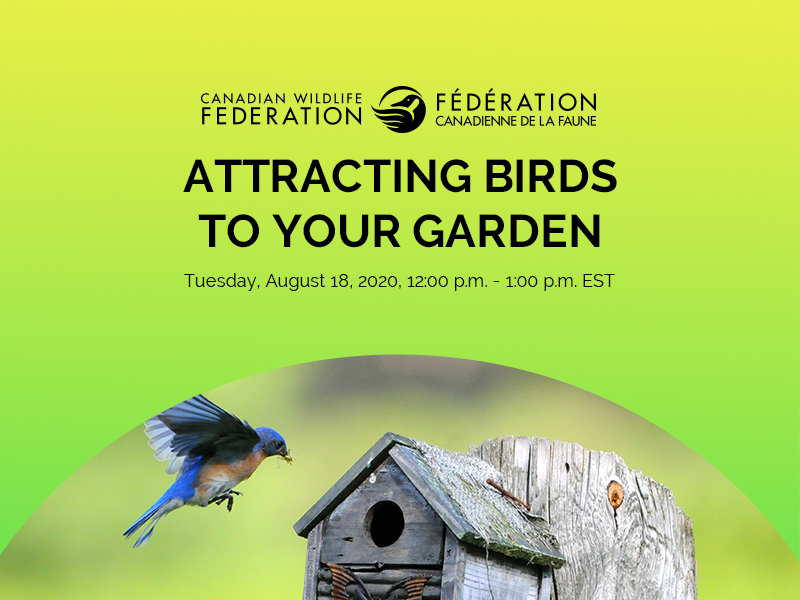
Attracting Birds to Your Garden
2020-08-18
Join the Canadian Wildlife Federation as we share tips and tricks to support your local and migratory birds. Adding certain habitat features to your garden can also enhance the visual appeal of your outdoor space. As a result, we get to enjoy the beauty and antics of our winged neighbours as well as benefit from their important pest control services and, in the case of hummingbirds, some pollination help as well.
-
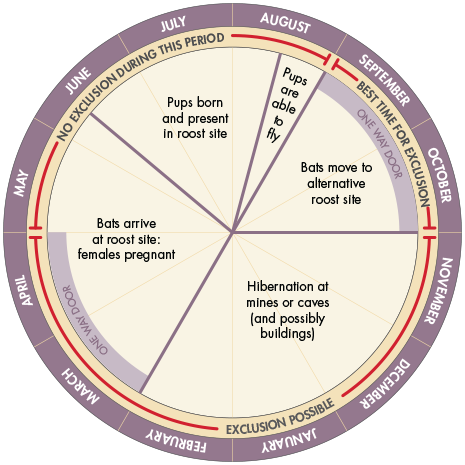
Bat Exclusion Calendar
2016-03-13
If you must exclude bats from your property, take a look at this calendar which outlines the most and least desirable times to do so.
-
-
-
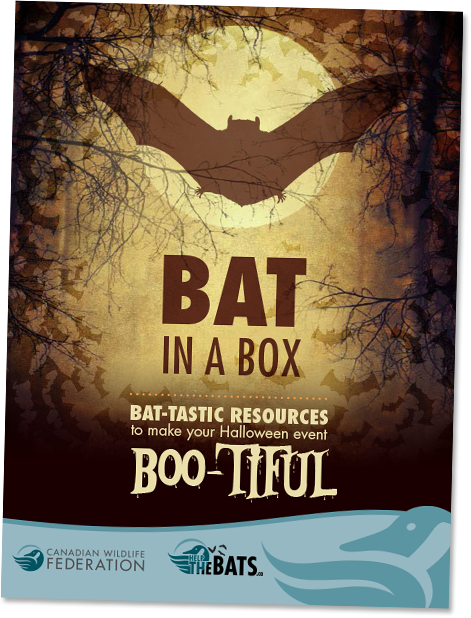
-
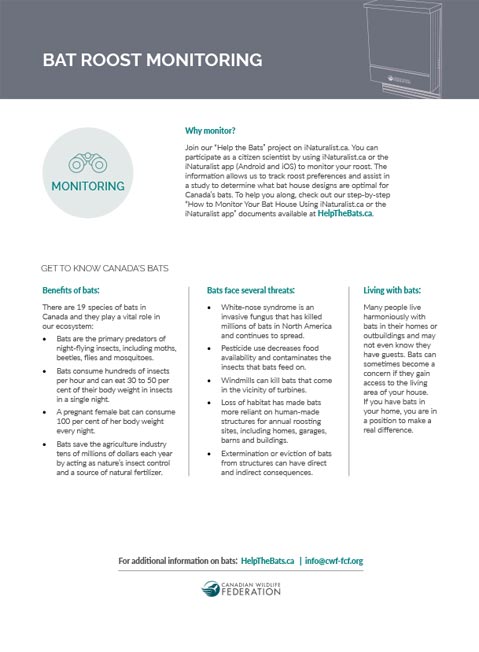
BAT ROOST MONITORING
2025-12-05
oin our “Help the Bats” project on iNaturalist.ca. You can participate as a citizen scientist by using iNaturalist.ca or the iNaturalist app (Android and iOS) to monitor your roost. The information allows us to track roost preferences and assist in a study to determine what bat house designs are optimal for Canada’s bats. To help you along, check out our step-by-step “How to Monitor Your Bat House Using iNaturalist.ca or the iNaturalist app” documents available at HelpTheBats.ca
-
BEST PRACTICES TO HELP CONSERVE THE AMERICAN EEL
2019-05-31
You’ve Got an Eel on Your Reel – NOW WHAT?!
-
Bioblitz in a Box
2021-09-24
Bioblitz-in-a-box is a lasting legacy from the Bioblitz Canada 150 project that took place in 2017, made possible in part by the Government of Canada, as a Canada 150 Signature Project. These tips and tools for organizing a bioblitz were compiled by the Canadian Wildlife Federation based on various online bioblitz guides, and professional and personal experiences. Feel free to browse around to find something to help with your own bioblitz plans!
-
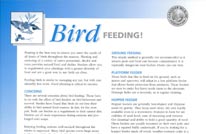
-
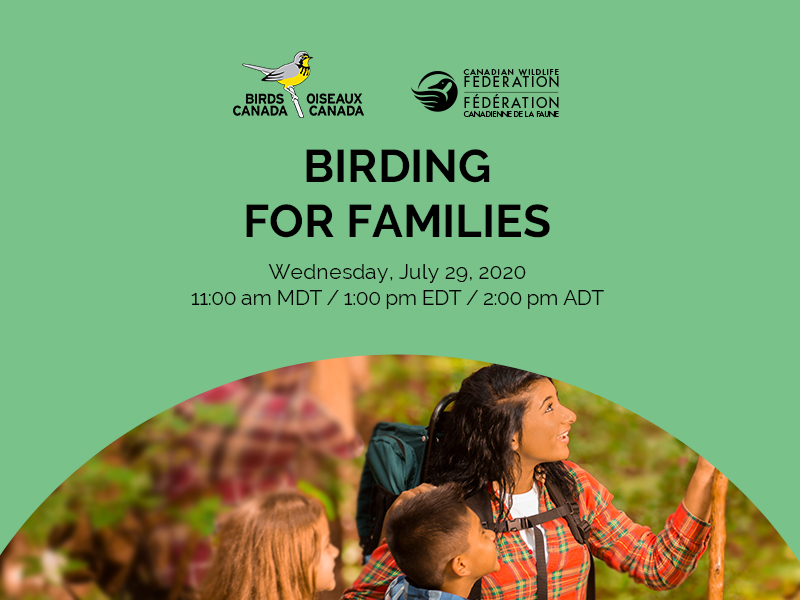
Birding for Families
2020-07-29
Looking for new ways to get outside with your family this summer? Birdwatching offers a great opportunity for you and your kids to connect with nature close to home. The best part? Birds can be found everywhere! Whether you live in a downtown high-rise or in the country, you’ve likely seen or heard one of our feathered friends close by. Join Birds Canada and the Canadian Wildlife Federation for a family-friendly introduction to the world of birds and gain practical tips and resources to help you get started with birding. All that you need is a keen eye, a few basic resources, and your curiosity! Both adults and children are welcome to attend!
-
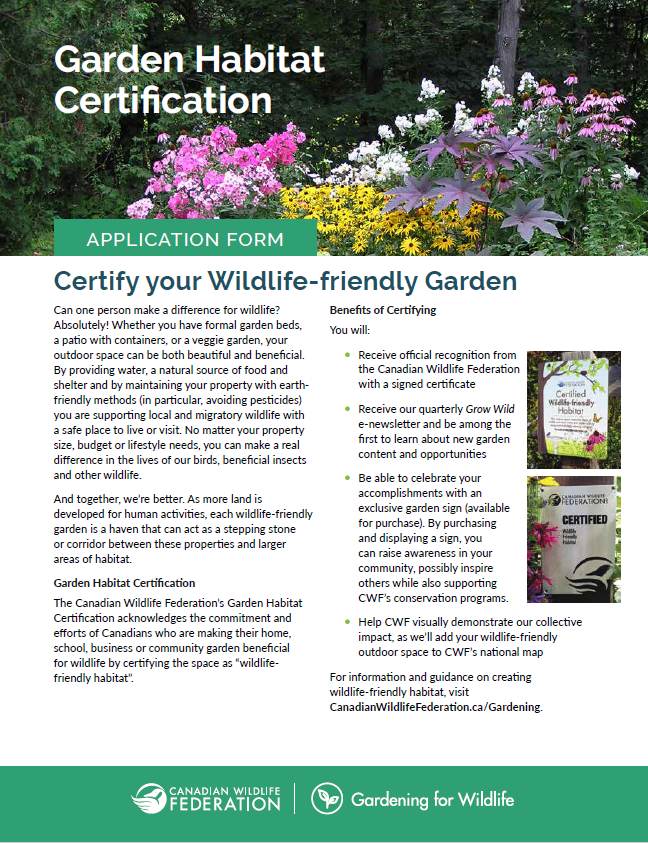
Certify Your Garden Handout
2025-12-05
Whether you are limited to a small patio or have hectares of land, CWF would like to acknoledge your efforts in welcoming wildlife to your garden.
-
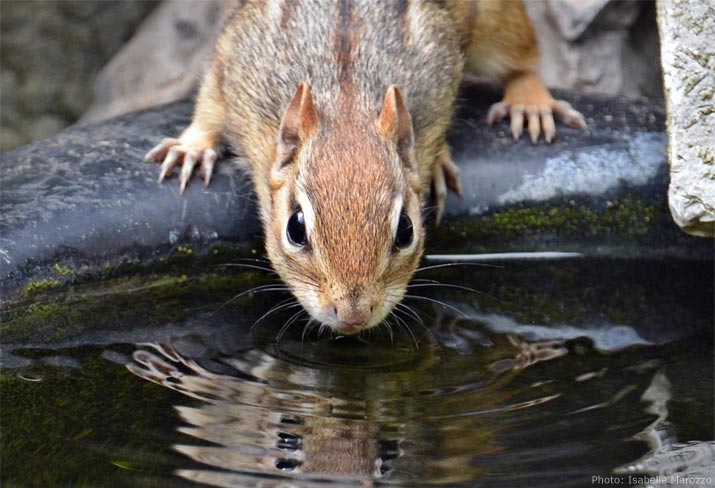
-
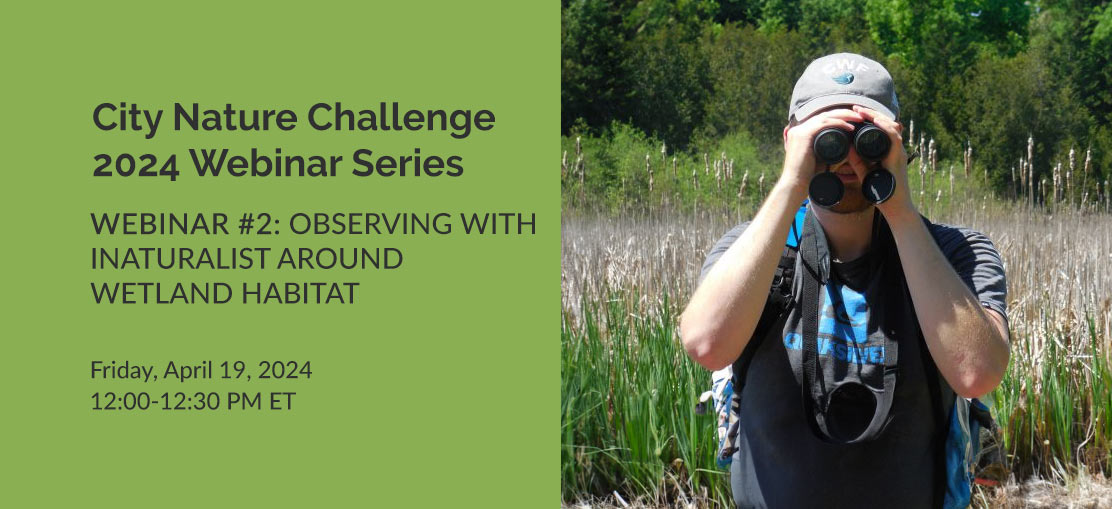
City Nature Challenge 2024 Series: #2 - Observing with iNaturalist Around Wetland Habitat
2024-04-19
Delve into the rich ecosystems of wetlands during our Wetland Focus webinar. From birds to plants, amphibians, and reptiles, uncover the fascinating biodiversity inhabiting these vital environments. Gain insights into photographing wetland species and learn how to make your observations count in the City Nature Challenge.
-
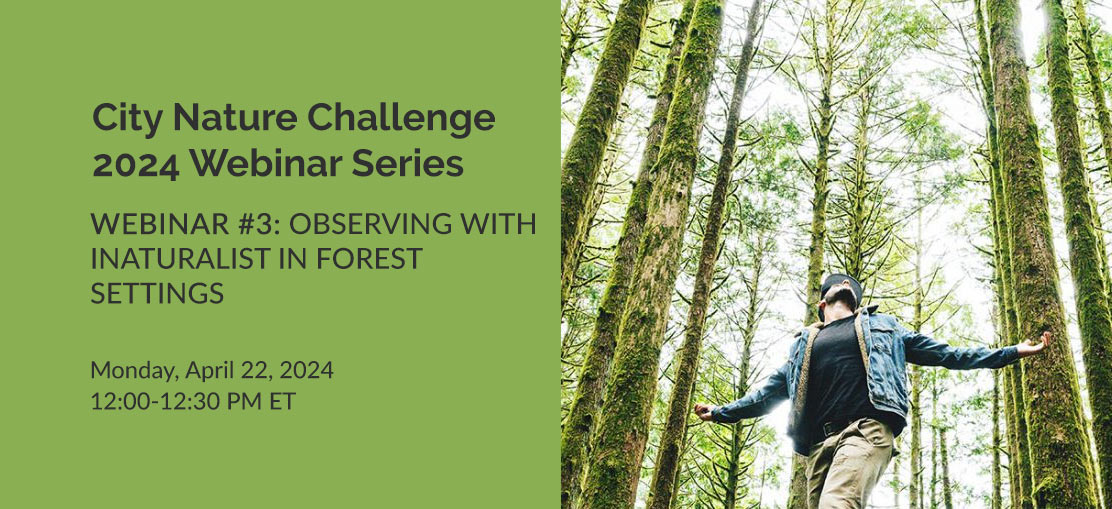
City Nature Challenge 2024 Series: #3 - Observing with iNaturalist in Forest Settings
2024-04-22
Immerse yourself in the tranquility of the forest during our Forest Focus webinar. Explore the world of forest flora and fauna, including plants, fungi, and birds. Discover techniques for capturing the beauty of these ecosystems and prepare to showcase the wonders of the forest in the upcoming City Nature Challenge.
-
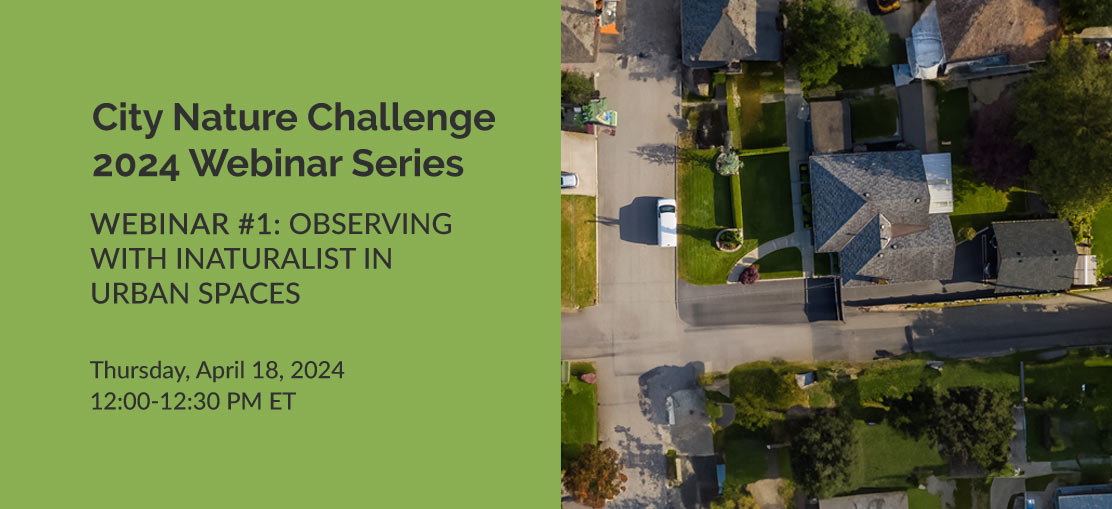
City Nature Challenge 2024 Webinar Series: #1 - Observing with iNaturalist in Urban Spaces
2024-04-18
Explore the vibrant biodiversity thriving in our urban landscapes during our City Focus webinar. Discover the diverse array of species, from plants to birds and mammals, that call the city home. Learn tips and techniques for capturing images to showcase the urban wildlife in the upcoming City Nature Challenge.
-

City Nature Challenge Canada Info Session For Potential City Organizers
2023-10-19
Are you an organization, city, or group with a passion for nature and community engagement? Are you interested in hosting a City Nature Challenge (CNC) event in 2024? If so, this is your chance to discover how you can be part of an exciting initiative that celebrates biodiversity, citizen science, and community collaboration. This session is hosted by James Pagé, Species at Risk Specialist, David DeRocco and Acacia Frempong-Manso, iNaturalist Engagement Coordinator. In this engaging and informative session, the Canadian Wildlife Federation (CWF), the leading organization for CNC in Canada, guides you through the City Nature Challenge. By attending this information session, you will gain a deeper understanding of the City Nature Challenge, discover the potential it holds for your organization or city, and learn how you can make a meaningful impact on biodiversity conservation. This session is tailored for potential organizers, not just participants, so you can gain the knowledge and resources needed to successfully host a CNC event in 2024.
-

Climate and Wildlife
2022-11-30
How is climate change impacting wildlife? Join the Canadian Wildlife Federation for an interactive webinar where we’ll discuss the four components of habitat that wildlife (and humans!) need to survive, and explore what happens when these things are impacted by climate change. We’ll also share some hands-on projects to inspire you to take action for wildlife in your own schools and communities! Nov 30, 2022 - 12:00 PM-13:00 PM (Eastern)
-
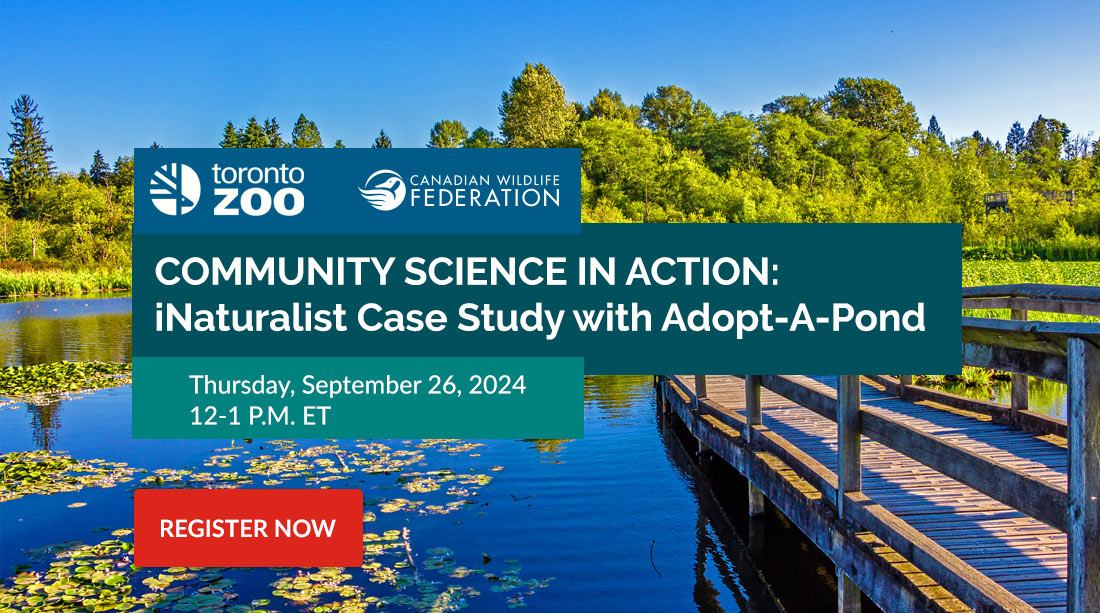
Community Science in Action: iNaturalist Case Study with Adopt-A-Pond
2024-09-26
Join the Canadian Wildlife Federation (CWF) for an insightful webinar that showcases how iNaturalist can be a powerful tool for citizen science programs. This session will highlight the Adopt-A-Pond (AAP) program by the Toronto Zoo as a case study, demonstrating the practical application of iNaturalist in conservation efforts. During this webinar we will guide you through the essential features of iNaturalist, using real-world examples from the Adopt-A-Pond program. You'll learn how iNaturalist supports environmental monitoring, enhances data collection, and contributes to research and conservation. Whether you're a seasoned user or new to the platform, this webinar will provide valuable insights and tips for using the iNaturalist app and website effectively. Don’t miss this opportunity to see how iNaturalist can elevate your citizen science initiatives!
-

Connecting People, Planet, and Prosperity: A Webinar Series for Earth Week 2025
2025-12-05
Earth Day 2025 provides an ideal platform to inspire global action and foster collaboration for a sustainable future. To mark this significant occasion, we propose a four-part webinar series during Earth Week, focusing on the intersections between biodiversity and critical global issues. This series will bring together leading experts, practitioners, and stakeholders to explore practical solutions and promote action-oriented dialogue.
-
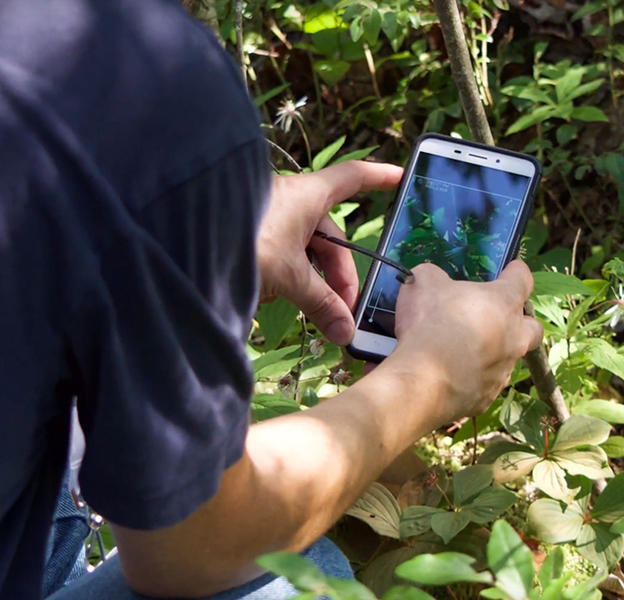
Contributing to a Global Biodiversity Database with iNaturalist Canada
2020-04-06
With the outbreak of COVID-19, the interconnection between people and nature has been brought to the forefront through increased awareness on the impacts we have on wildlife. Some areas in Canada may see an increase in visible wildlife while human activity is temporarily reduced. Whether this is a result of wildlife being more present or people are simply taking notice remains to be seen. You can help answer this question. Uploading photos of wildlife to iNaturalist.ca or using the free iNaturalist app will provide researchers with valuable information on where species are found during this time of decreased human presence on roads, in our towns and on trails. James Pagé, CWF Species At Risk and Biodiversity Specialist, will walk you through the ins and outs of using iNaturalist.ca and the iNaturalist app to record an observation as well as how to learn about what others are seeing around you during this time of isolation and physical distancing. Let’s stay connected with each other and nature.
-
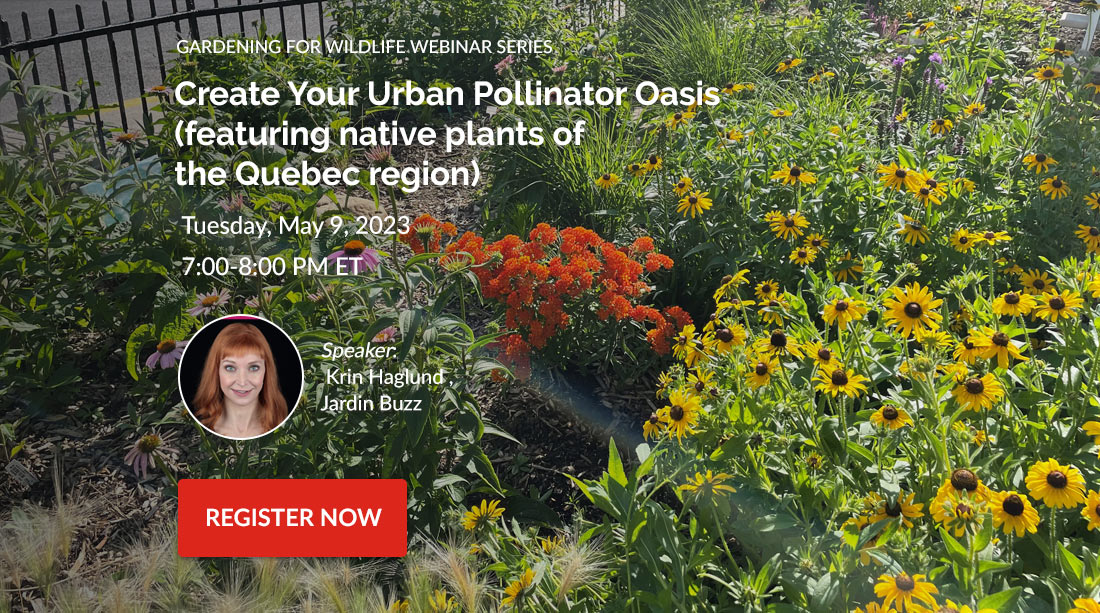
Create Your Urban Pollinator Oasis (featuring native plants of the Quebec region)
2023-05-09
Join CWF May 9 at 7:00 p.m. ET as special guest, Krin Haglund of Jardin Buzz will profile some of Quebec’s beautiful native plants and share how you can use them in your garden. The situation of our native pollinators may be grim, but being part of the solution doesn’t have to be! Let Krin help you bring joy, life and “buzz” to your urban garden! You will learn how to create an exuberant native pollinator garden, even in small spaces. Krin will also share inspiring examples and discuss helpful techniques for special situations such as lawn alternatives and container gardening. You will also learn techniques for saving, starting and planting native plant seeds. While the plants featured are from the Quebec area, the tips and techniques are applicable to all. We hope you can join us! Please note – this webinar will only be available as a recording for those who register for a few days afterwards. Please register to avoid missing out!
-
Creating Monarch and Pollinator Habitat
2025-12-05
Private landowners are increasingly interested in restoring areas of their property to provide improved habitat for Monarchs and other pollinators. While there is abundant information on small-scale gardening with native plants, there is much less on planting at larger scales, such as on one acre or more of land. Here is a brief introduction for landowners in southeastern Canada interested in restoring an area of an acre or more in a cost-effective way. Establishing Pollinator Meadows from Seed*, a document developed by the Xerces Society, is also available online
-
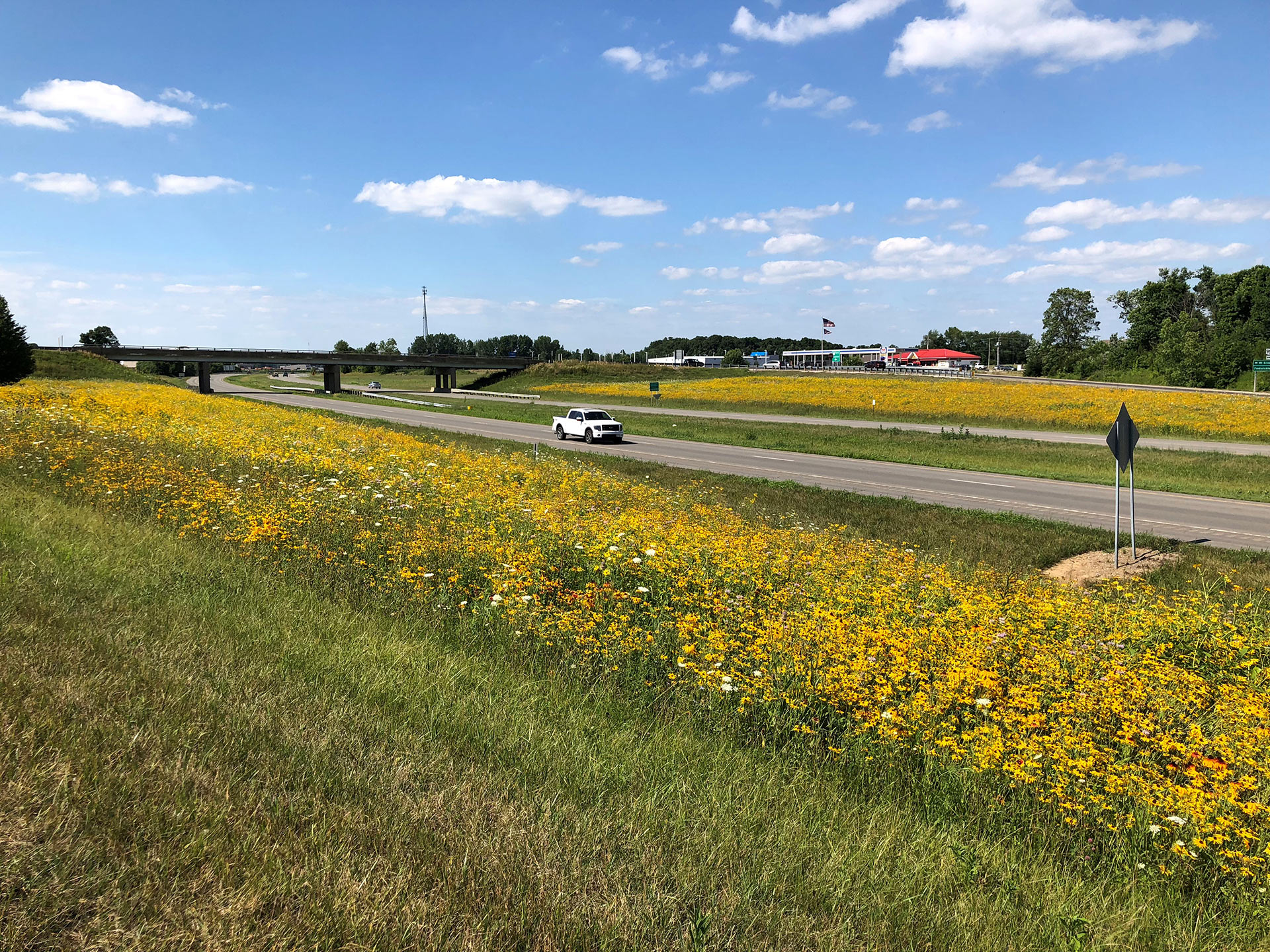
Creating Pollinator Habitat: Opportunities and Examples from Roadsides and other Right-of-Ways
2019-12-12
Pollinating insects are in crisis across North America, with steep declines in some groups. This introductory webinar in our 2019-2020 Pollinator Series will discuss the opportunities that transportation, utility and other corridors present to increase and improve available pollinator habitat across the landscape. Examples from all sectors will be discussed, and the highlights of CWF’s 2019 pilot project in eastern Ontario will be presented.
-
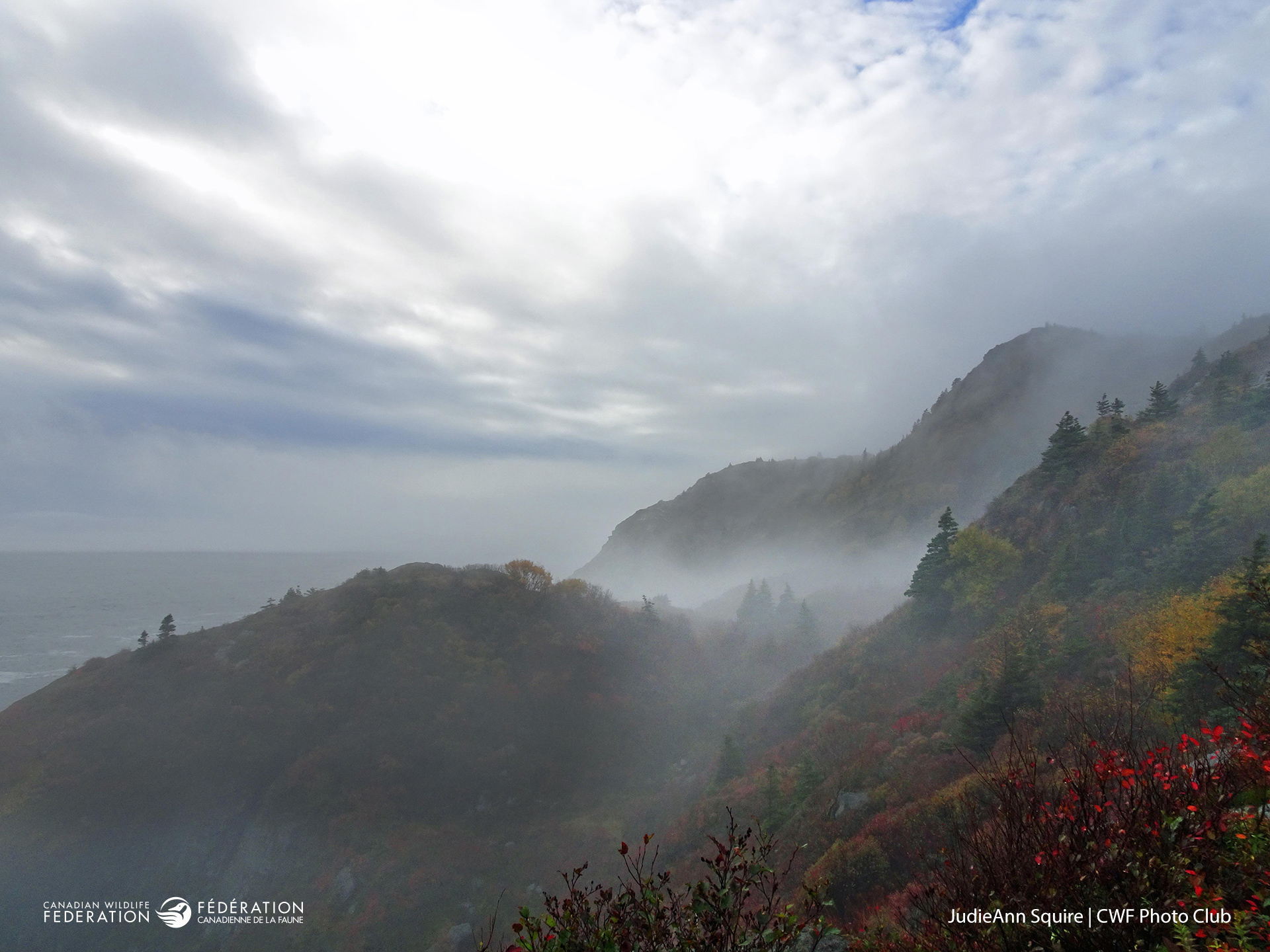
-
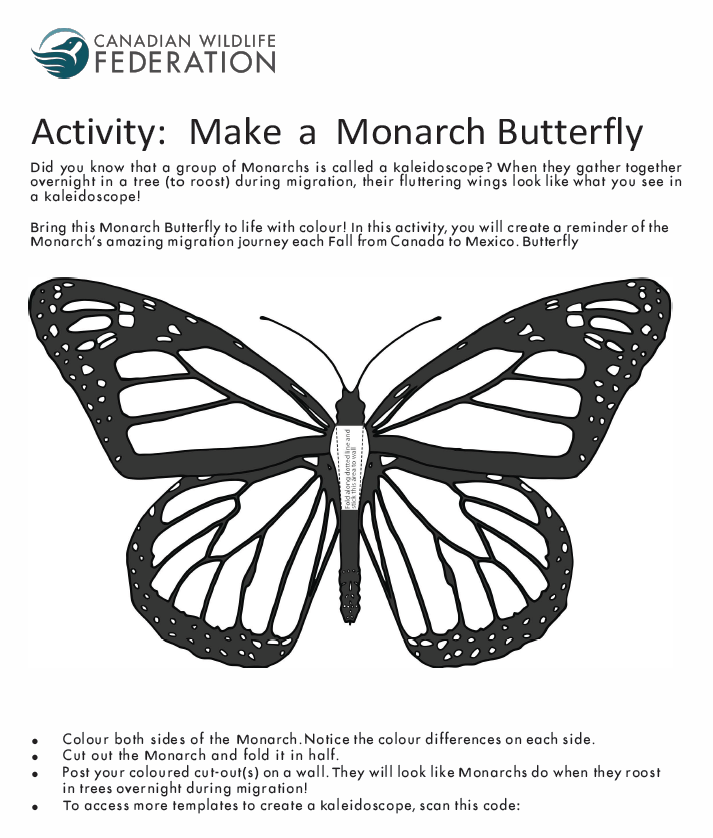
CWF Kaleidoscopes Monarch Colouring Page
2025-12-03
-
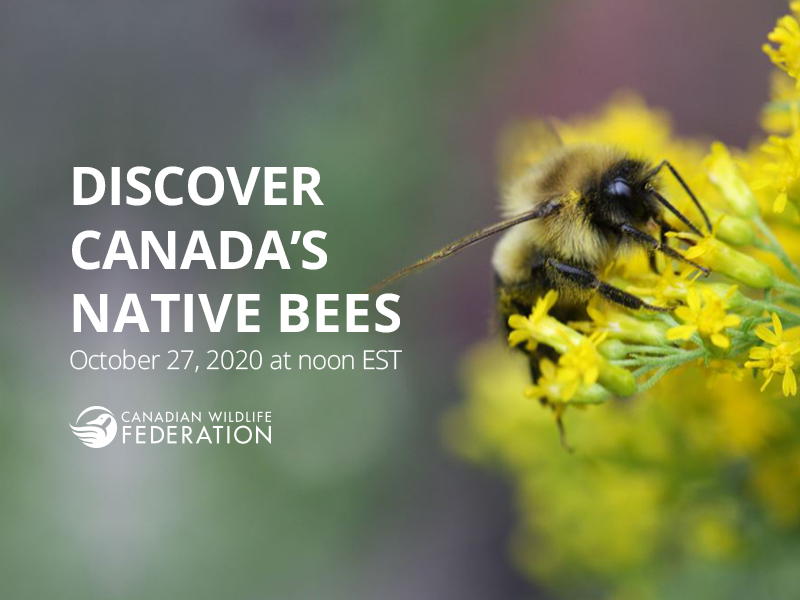
Discover Canada’s Native Bees
2020-10-27
Join Cécile Antoine - PhD Candidate in Biology at UOttawa – in discovering some of Canada’s native bees that you may encounter in your garden or local park. Cécile will speak about the biology and ecology of our native bees. She will also explain her research findings on bees that nest in the ground, which represent 75% of Canada’s bees, and is the focus of her studies. Learn more on how to support our bees by attending this webinar! Cécile presented this topic in French earlier this year and due to popular demand is returning to present it in English. October 27, 2020 at noon EST
-
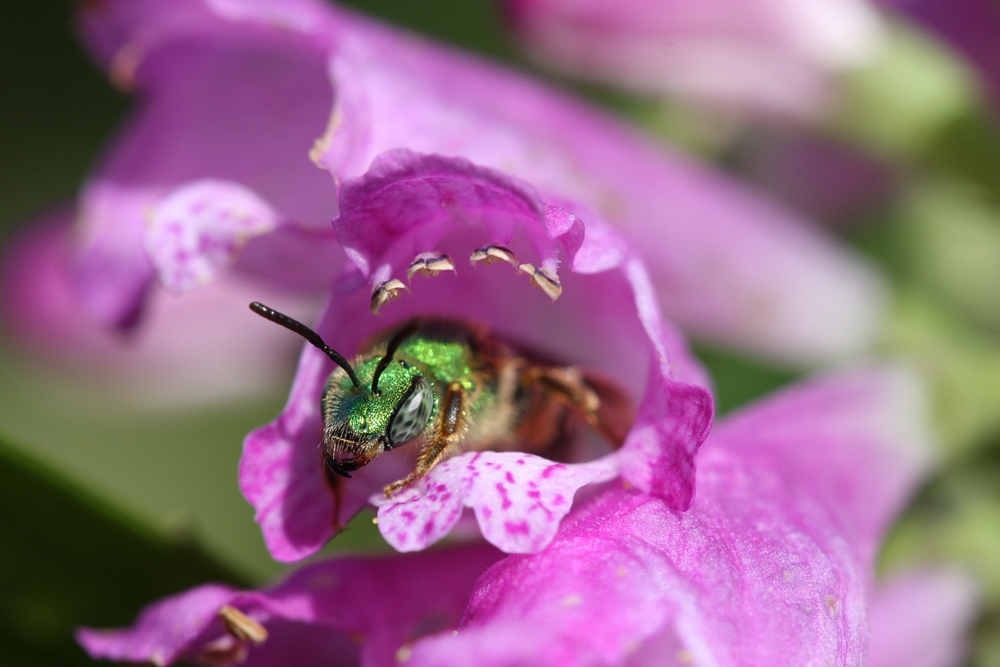
Discover Canada’s Native Bees (French Only)
2020-07-21
Join Cécile Antoine -PhD Candidate in Biology at UOttawa- on her journey to discover native bees that you may encounter in your gardens and parks around Ottawa, or the rest of the country. Cécile will share her passion by giving details on the biology and ecology of wild bees. She will also explain her research findings on bees that nest in the ground, which represent ¾ of the species, and is the focus of her studies. Learn more on how to support wild bees by attending this webinar!
-
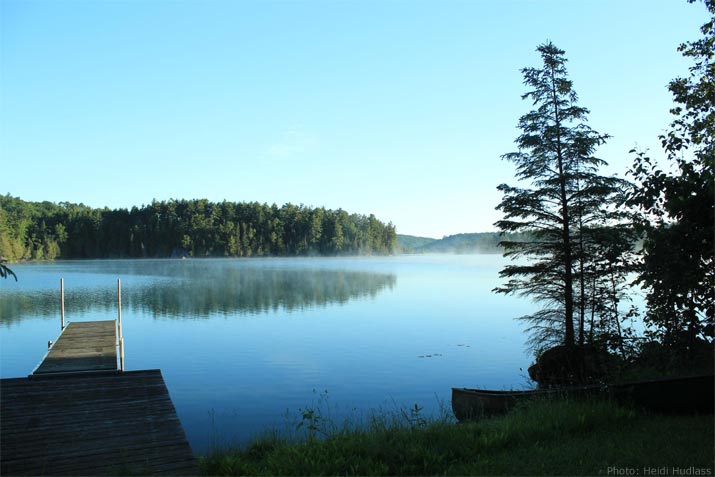
-

-
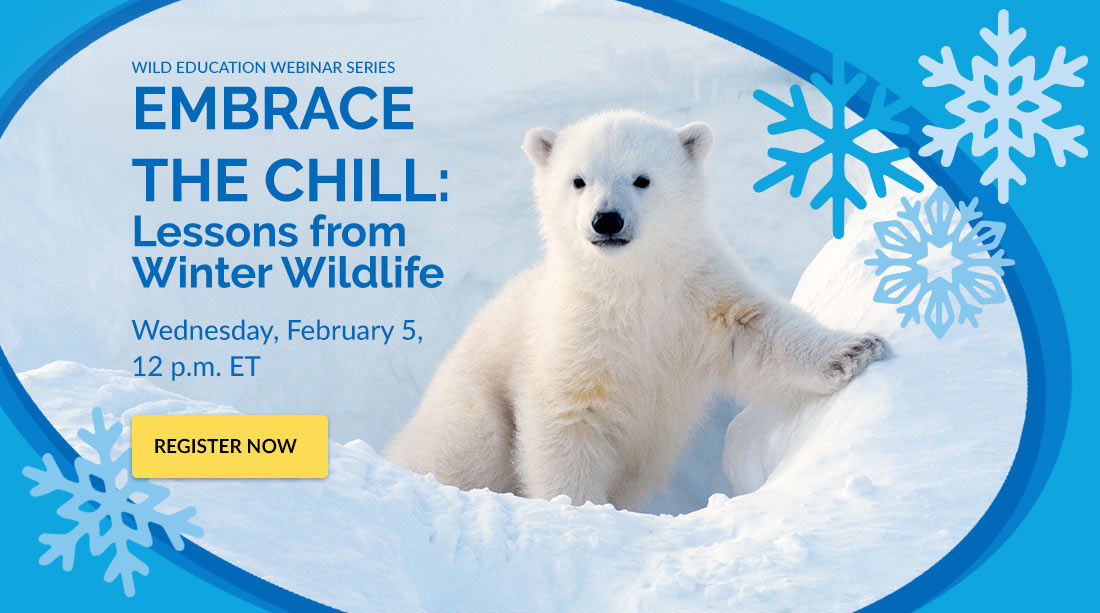
Embrace the Chill: Lessons from Winter Wildlife
2025-02-05
Ever wondered what animals do when the temperature drops? Join us as we dive into the fascinating world of winter wildlife! From hibernation to migration to adaptation, we’ll explore the strategies our furry friends use to thrive in the cold. As humans, we don’t hibernate or migrate (well, some of us do!), but we do adapt to winter conditions in our own unique ways. Get inspired to bundle up and head outside through this interactive lesson with the Canadian Wildlife Federation! All registrants will receive a Winter Resource Kit containing activities to inspire further outdoor exploration!
-
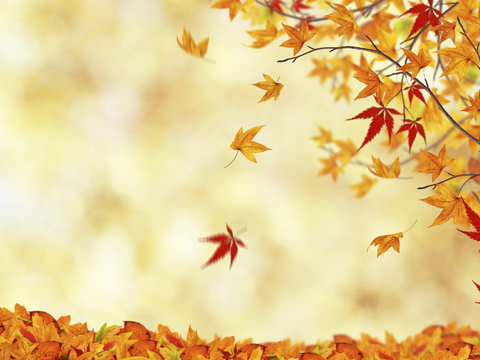
-
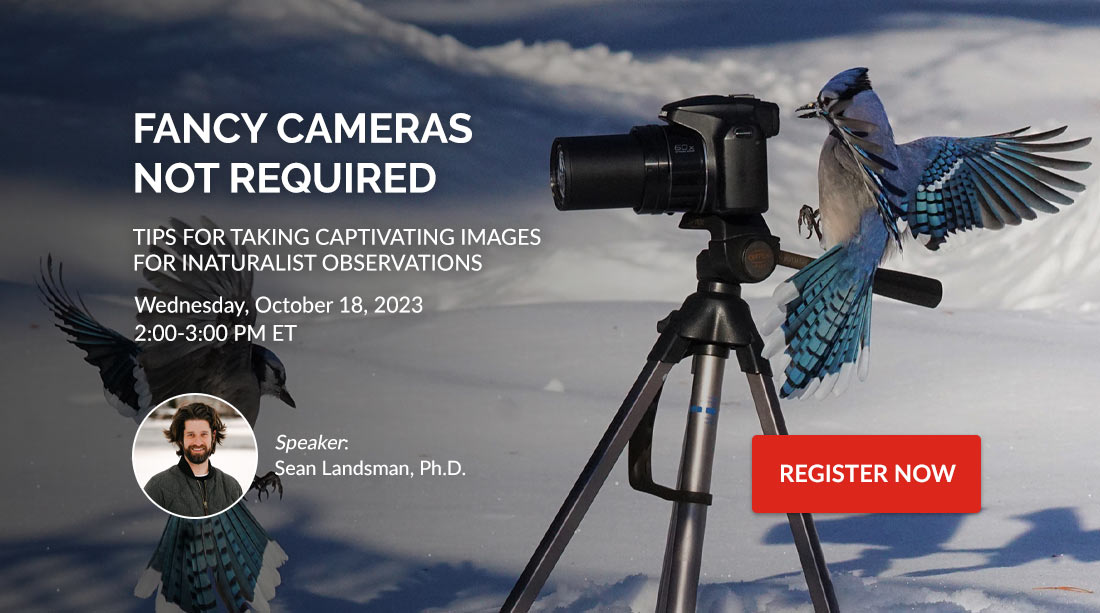
Fancy Cameras Not Required: A Webinar
2023-10-18
October 18, 2023 at 2-3 pm ET, get tips for taking captivating images for iNaturalist observations. "Gear lust” is a term in photography used to describe the feeling people have when they pine after the latest and greatest camera equipment. People often conflate having expensive equipment with being a good photographer, but in reality this thought is mostly a fallacy. Taking strong, captivating images requires knowledge of compositional techniques, a little understanding of psychology, visual processing, and – especially in nature photography – knowledge of your subject. In this talk, I will give you tips and tricks you can use in the field with whatever camera you have at your disposal, no matter its cost.
-
Fishing Hooks Can Hurt or Kill Turtles
2019-05-31
Ontario’s turtles are in decline and need all the help they can get!
-
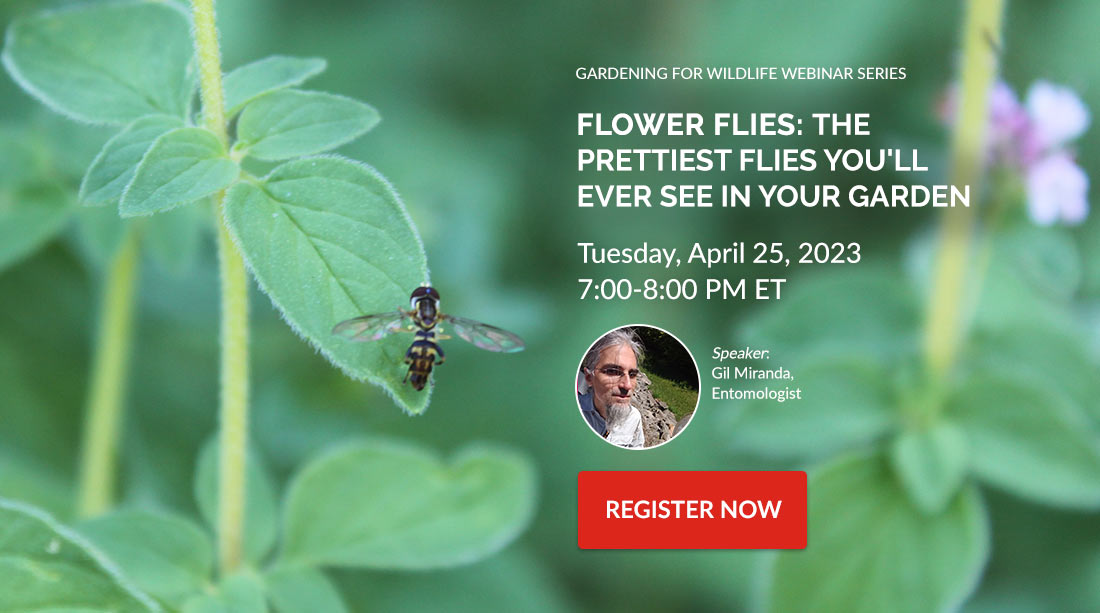
Flower Flies: The prettiest flies you'll ever see in your garden
2023-04-25
Join CWF Tuesday, April 25th at 7:00 p.m. ET to discover the wonderful world of flower flies with our guest entomologist, Gil Miranda. When talking about pollinators in your garden, you might immediately think of a bee going about its business to feed its colony. But often overlooked, if not mistaken for a bee, are the beautiful flower flies. These colorful and variably shaped flies are common flower visitors and can be as abundant and important as bees when it comes to pollinating your flowers. Please join us as Gil gives you some tips on how to spot and identify some common flower flies that might be around your gardens!
-
-
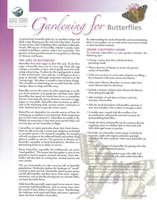
Gardening for Butterflies Handout
2025-12-05
Nearly 300 species of butterflies inhabit Canada, some cloaked in brilliant colours, others less noticeable. The presence of these graceful creatures in our gardens is a blessing of vibrancy and beauty.
-
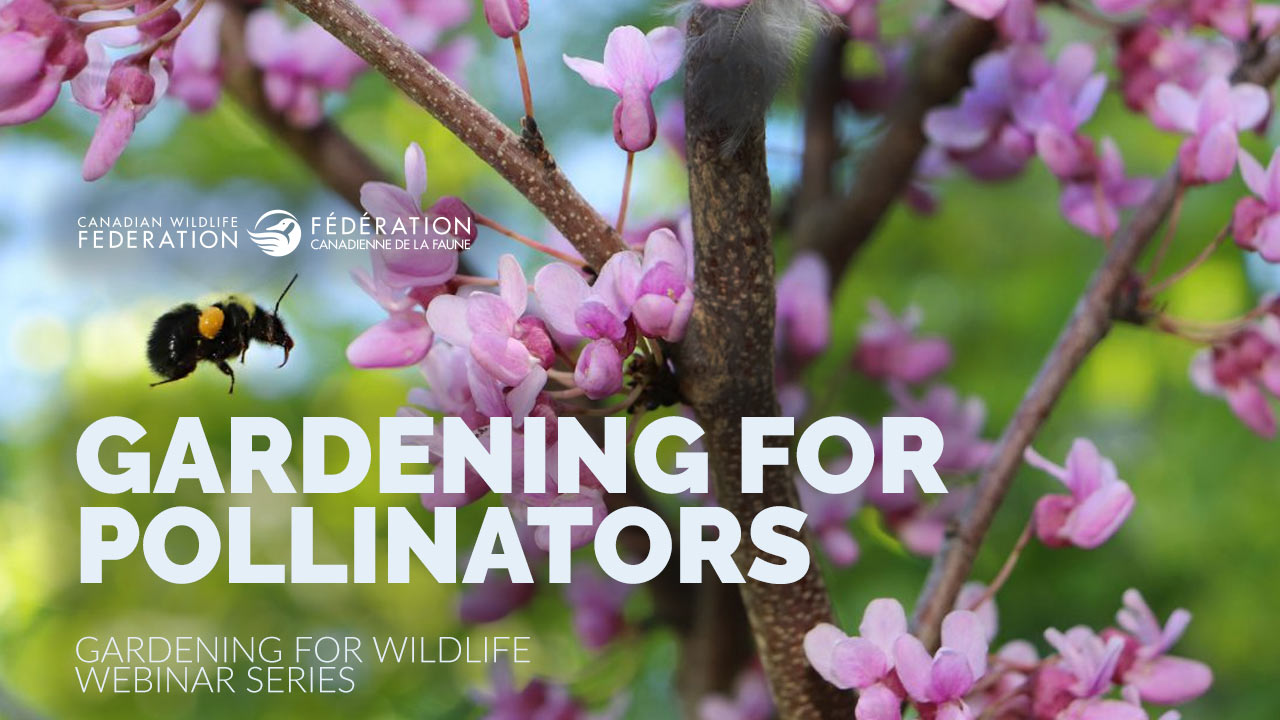
Gardening for Pollinators
2023-03-28
Learn about Canada’s seven kinds of pollinators and their importance in our daily lives. We’ll also give you lots of simple yet powerful tips to help these tiny allies in your garden and resources to help you along. We hope to see you there! Speaker: Sarah Coulber is CWF’s Gardening for Wildlife Program Coordinator, helping Canadians connect to the nearby nature right outside their door. Before CWF, Sarah held a variety of naturalist and environmental roles and has been a gardener and nature lover most of her life.
-
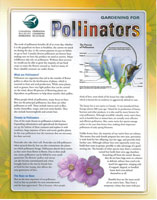
-
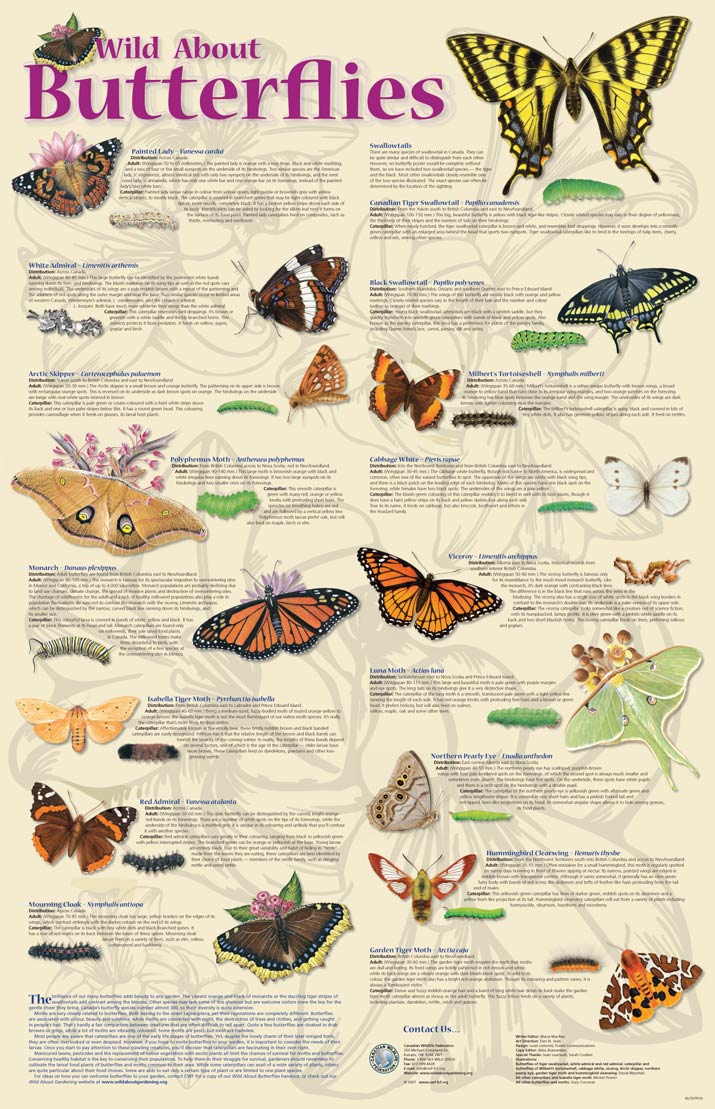
Gardening for Wildlife Handouts and Posters
2025-12-05
Download a variety of handouts including Gardening for Pollinators and Natural Insect Control. Or order a poster on Canada’s birds, bees, butterflies and much more!
-
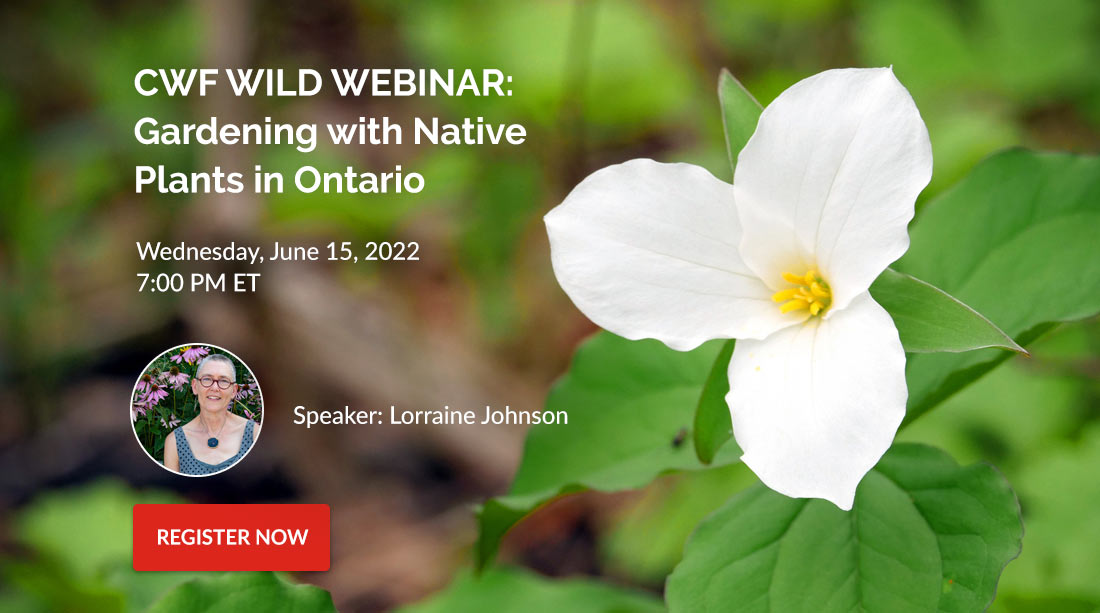
Gardening with Native Plants in Ontario
2022-06-15
Join CWF for another in our native plant webinar series, Wednesday, June 15, at 7:00 p.m. ET, this time with our special guest, Lorraine Johnson! Highly respected author and long time plant and ecology/sustainability expert, Lorraine will help you appreciate the world of Ontario’s native plants. Discover their many benefits, versatility and how to weave them into your existing garden, to both delight the eye and support birds and beneficial insects alike. Lorraine has been a pioneer in encouraging Canadians to use their outdoor space as an opportunity to support the nature we both need and love. Her newest book, “A Garden for the Rusty-patched Bumblebee – Creating Habitat for Native Pollinators,” co-authored with Sheila Colla, is due in stores this June.
-

Gardening with Wildlife in Mind
2024-05-22
Join CWF as we explore the key ‘ingredients’ in a beautiful yet beneficial garden that will support local and migratory wildlife right outside your door. In addition to learning these important components, you’ll come away with ideas in how to apply them that will suit any property, lifestyle, budget or space.
-
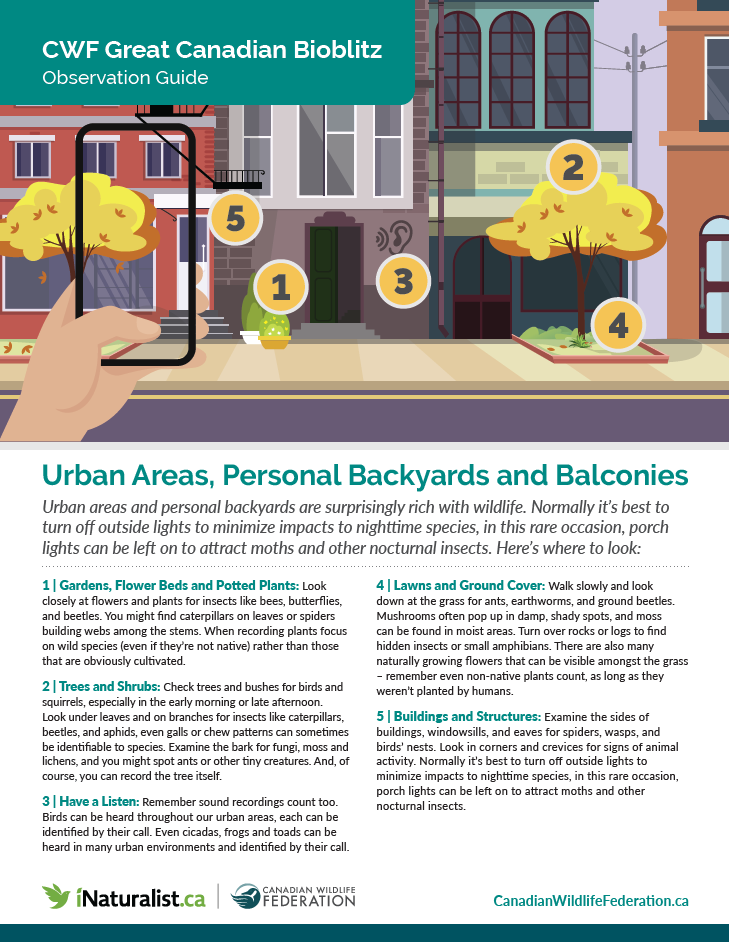
Great Canadian Bioblitz Observation Guide
2025-12-03
-
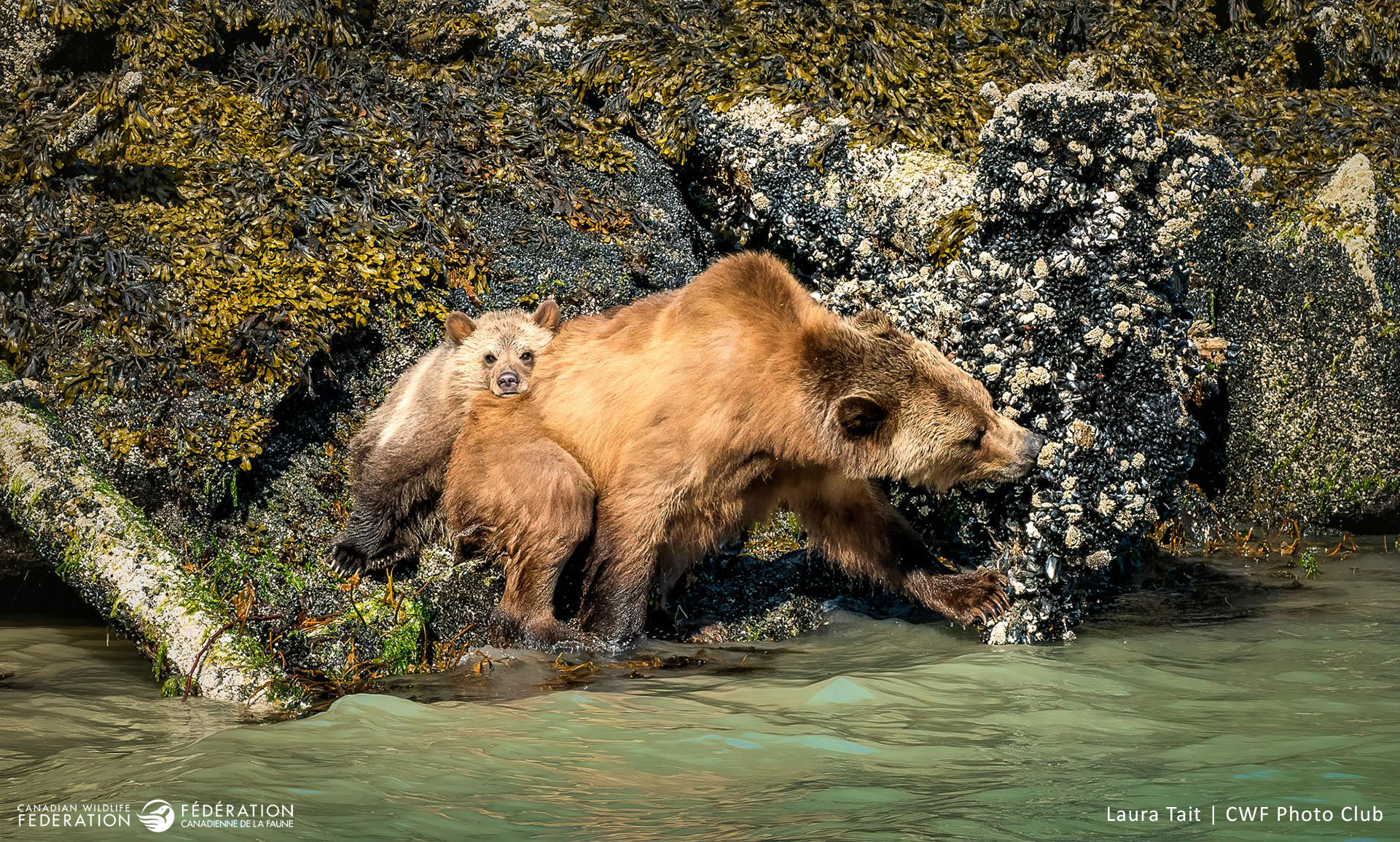
-

-
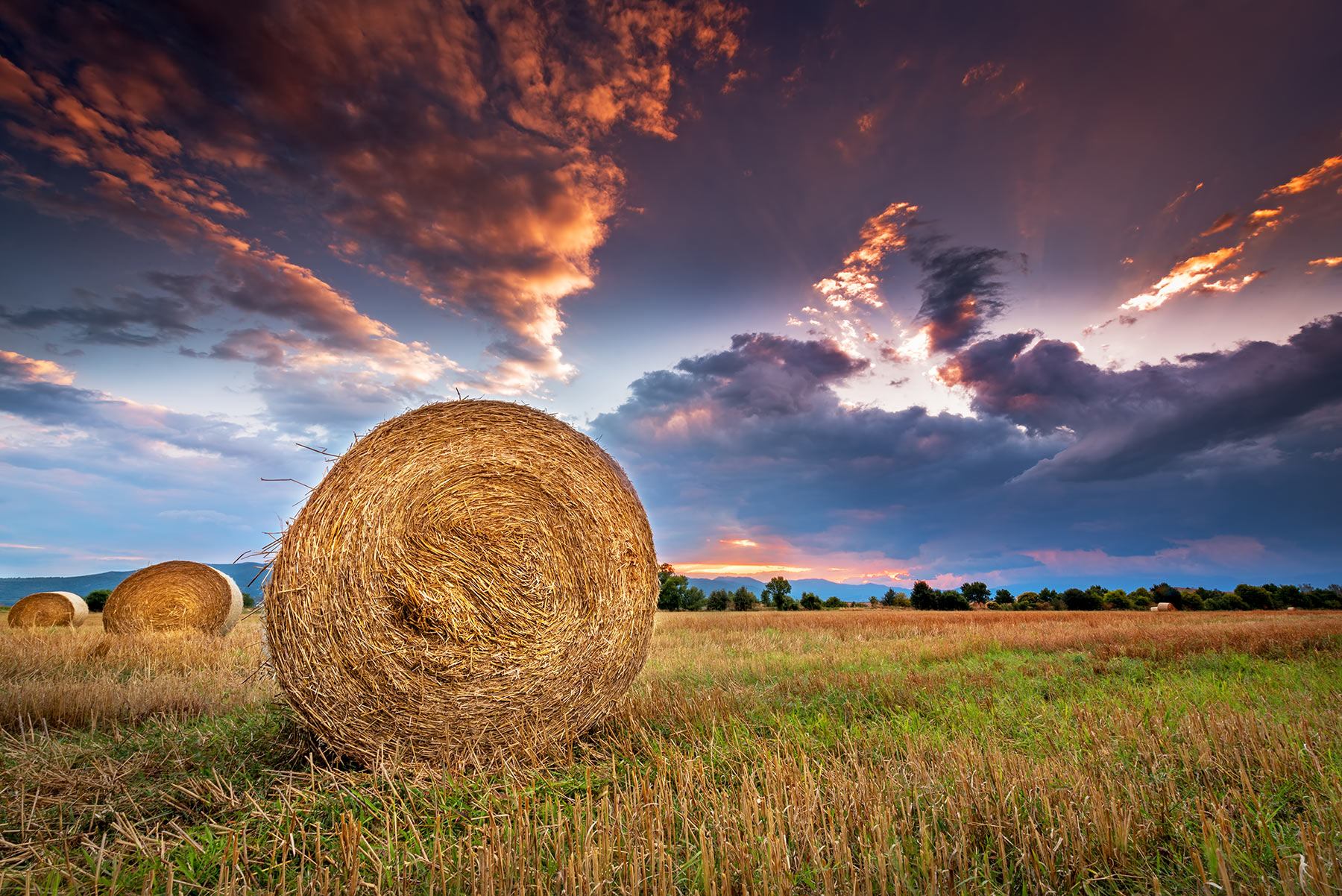
-
Helping Canada’s Pollinators in The Garden
2025-12-05
Canada’s pollinators play a critical role in our ecosystems, food production and economy through pollination. Some are also important in pest control. These tiny allies face many challenges, such as pesticide use and loss of habitat, making it more important than ever to support them. A great place to start is to ensure your outdoor space is pollinator-friendly.
-
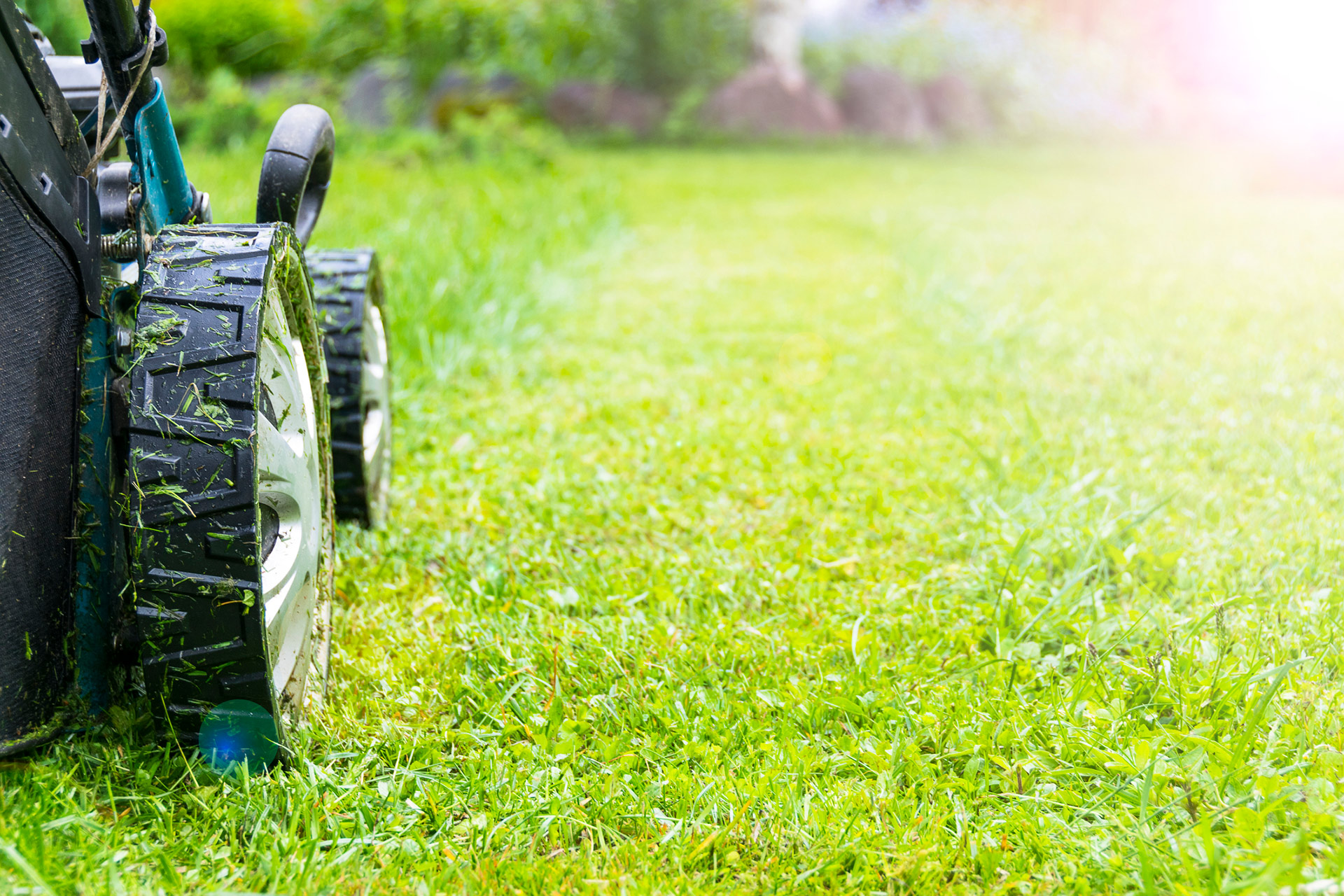
Helping Monarchs and Pollinators: Rethinking Mowing
2019-05-07
Pollinators are a priority resource concern for many conservationists and farmers. The Xerces Society conducted field trials throughout the Easter, Midwestern and Western United States to inform best practices.
-
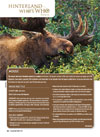
Hinterland Who's Who Fact Sheets
2025-12-05
Check out the facts for amphibians and reptiles, birds, fish, mollusks, insects, pollinators and mammals! We’ve even got information specific to species at risk, the boreal forest species, and species affected by climate change! So why not learn a little bit more about these Canadian creatures
-
-
How To Build a Turtle Nesting Site
2025-12-05
Sometimes turtles nest in problem areas like gardens, driveways or compost piles. To encourage turtles to nest elsewhere, or to create nesting habitat if it is lacking, consider building a nesting site. Keep in mind that turtles will often return to sites where they have nested before, so it may take a few seasons before a new site is used. We also recommend having nest protectors ready to protect any nests laid.
-
How to get started with CWF's Gardening for Wildlife iNaturalist project
2021-04-09
Create an iNaturalist.ca account by visiting the website or downloading the free app(available on iOS and Android ). Click sign up and create your profile, including a publicusername and short bio. This information can be changed at any time.
-
How to Participate in the City Nature Challenge
2025-12-05
What is the CNC? The City Nature Challenge (CNC) is an annual citizen science event thatgets people outside to enjoy nature in their city as well as create a living record of urbanwildlife. The CNC is a global initiative that encourages friendly competition between cities toget the most observations. From April 29th to May 2nd, 2022 participating cities will asktheir citizens to get outside and take photos of wildlife (this includes both plants andanimals!) in their municipality using the free iNaturalist app or iNaturalist.ca. More than 400cities took part in 2021 from around the world, 25 of which were right here in Canada. Tofind out if your city is participating this year, visit the iNaturalist project page .
-
How to Take Identifiable Photos of Arachnids
2025-12-05
It can be difficult to take photos of wildlife. It is not essential to photograph every point on this diagram to get an identifiable observation. Just try your best! Although some people may find arachnids frightening at first, they play an incredibly important role in the ecosystem by keeping down the populations of pest insects that would otherwise feed on crops or trees.
-
How to Take Identifiable Photos of Butterflies & Moths
2025-12-05
It can be difficult to take photos of wildlife. It is not essential to photograph every point on this diagram to get an identifiable observation. Just try your best! Both butterflies and moths can be pollinators as well as food for other species, such as birds and bats. Some species cocoon over winter in fallen leaves. Why not leave the leaves this fall to help wildlife?
-
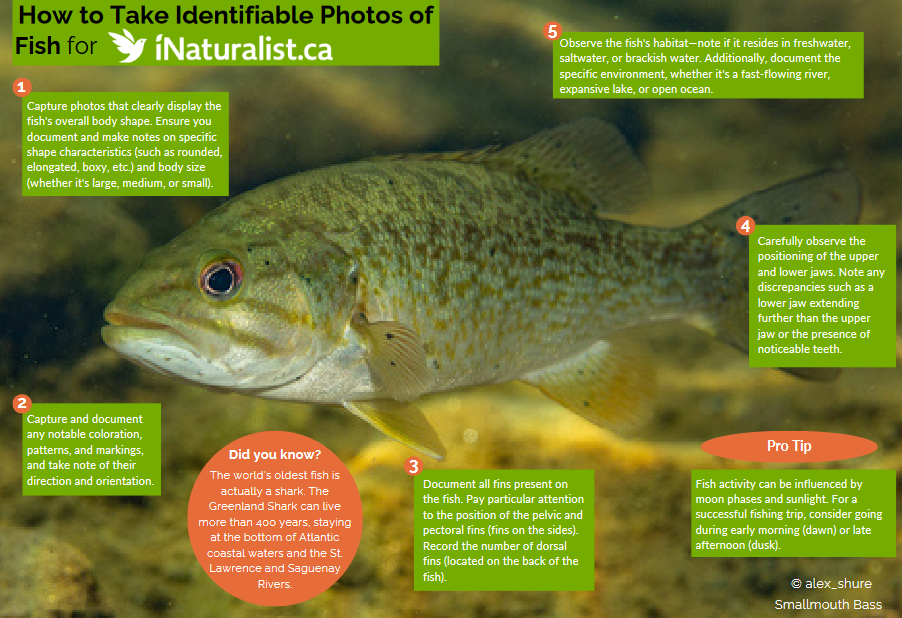
How to Take Identifiable Photos of Fish
2025-12-05
Taking photos of wildlife can be challenging. It is not essential to photograph every point on this diagram to get an identifiable observation. Just try your best! When photographing fish, minimize air exposure by taking an underwater photo whenever possible, allowing them to breathe freely. If taking a picture outside the water, keep the fish near the water and lift it briefly for the photo, limiting air exposure to 10 seconds or less. Be sure to follow local fishing guidelines and regulations.
-
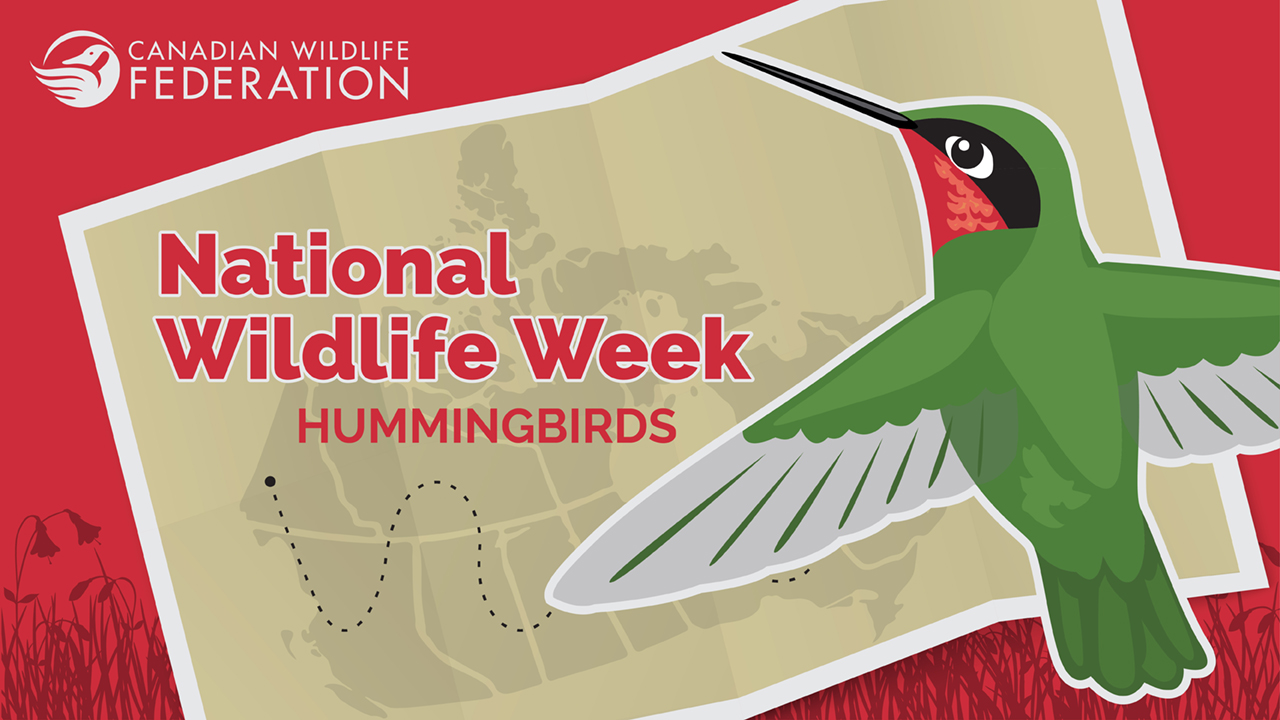
Hummingbirds With Sarah Coulber
2025-04-09
Sarah’s love of nature led to several environmental jobs with municipalities and naturalist volunteer roles before joining the Canadian Wildlife Federation over 20 years ago. Sarah runs the Gardening for Wildlife program where she helps Canadians discover, appreciate and support the incredible nature that surrounds us. Join Sarah to discover the migration, nesting, and feeding habits of Canada’s hummingbird species, and explore simple ways you can help hummingbirds at home or school!
-
Identifying observations on the web
2021-04-13
Whether you know just one species really well or have an in-depth knowledge of taxonomy, you can help improve theconservation value of iNaturalist observations. It’s most easily done online versus the app.
-
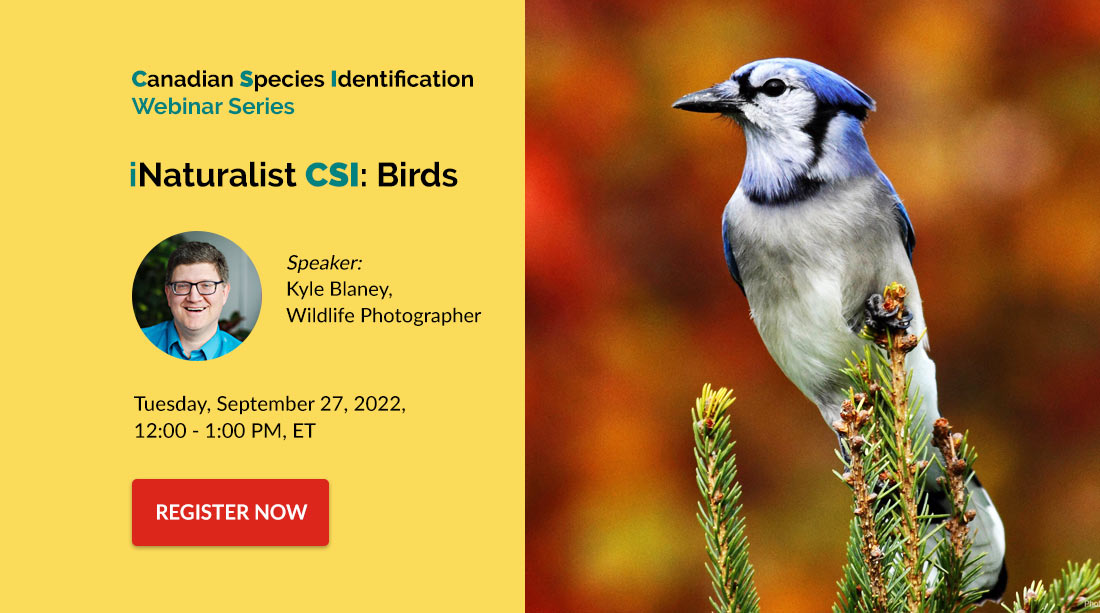
iNat CSI: HOW TO IDENTIFY & PHOTOGRAPH BIRDS
2022-09-27
In this presentation, Kyle will discuss how factors such as size, shape, seasonality, habitat, and field marks can help identify birds. He will use his images of common species to provide examples and specify what to be wary of. Finally, he will give tips and tricks that can lead to better bird photos. Tuesday, September 27, 12-1pm ET.
-
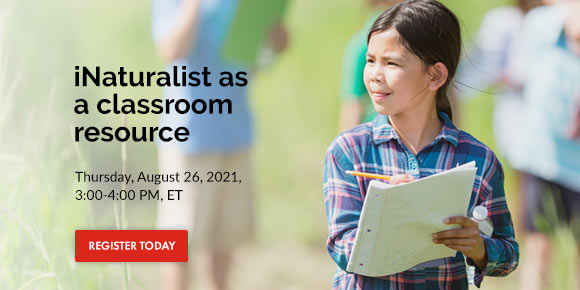
iNaturalist.ca Webinar Series: iNaturalist as a classroom resource
2021-08-26
Join Michael Leveille on Thursday, August 26 at 3:00 pm ET as he showcases how he has incorporated iNaturalist into the classroom. During COVID he created an incredible series of 23 virtual fieldtrips around the Ottawa Area for Grades 5 to 8. Come join our CWF webinar to discuss ways to incorporate outdoor learning and iNaturalist into the classroom. Presenter Bio: Michael Leveille (Swampy on iNaturalist.ca) is a science educator and an artist of prehistoric life. Educated at the University of Ottawa, he has worked at the Canadian Museum of Nature and at St-Laurent Academy School in Ottawa. Mr. Leveille believes that experiential learning across multiple disciplines is a valuable education tool. His Macoun Marsh study site and outdoor classroom is used as a center for conservation, geological, and meteorological studies.
-

iNaturalist Canada: Amateurs to Experts Identifying Observations
2021-04-27
iNaturalist has become one of the world’s most popular nature apps and the Canadian Wildlife Federation has led the charge in bringing it to Canada. But the strength behind iNaturalist is thanks to a wonderful community of people contributing observations and identifications. An observation of a species is most valuable when it comes along with an accurate species ID. And to help with that, thousands of people play an extremely valuable role, helping identify observations across Canada. This webinar will not be teaching how to identify a species, but you don’t have to be an expert to contribute: you can probably tell the difference between an American Robin and a Blue Jay or a squirrel from a chipmunk. But you can be an expert, helping to distinguish between species like an Orange-belted Bumblebee and a Red-belted Bumblebee. You’ll then be equipped and ready to contribute to the City Nature Challenge, the largest annual initiative on iNaturalist, happening April 30 to May 9, 2021.
-
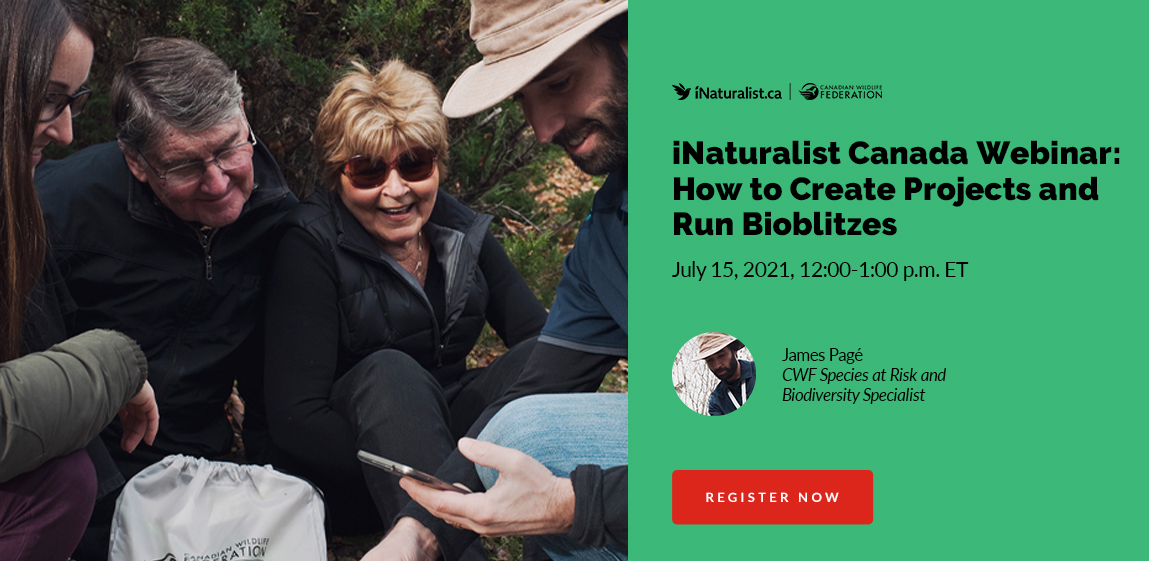
iNaturalist Canada: How to Create Projects and Run Bioblitzes
2021-07-15
July 15, 2021, 12:00-1:00 p.m. ET Join the Canadian Wildlife Federation for a webinar demonstrating how to run your very own Bioblitz using iNaturalist.ca! A Bioblitz is a communal citizen-science effort to record as many species within a designated location and time period. Typically, people gather on a property for a day or more and an event can be as big as a full-scale inventory or as small as a local neighbourhood association. And with the current times, more and more events, including bioblitzes, are going virtual. In this webinar, we will walk through all the steps of running a successful Bioblitz including setting up a project on the website and running a virtual Bioblitz.
-

iNaturalist Canada: How to Record Observations in the App and Online
2021-04-07
iNaturalist has become one of the world’s most popular nature apps and the Canadian Wildlife Federation has led the charge in bringing it to Canada. It’s more than just an app; there’s an entire online platform complete with image recognition technology along with a growing community to support you in your discoveries. Join us in leaning the ins and outs of using the app and iNaturalist.ca to record wildlife observations - from the tiniest bug to the tallest tree and everything in between. You’ll then be equipped and ready to take part in the City Nature Challenge, the largest annual initiative on iNaturalist, happening April 30 to May 3, 2021.
-
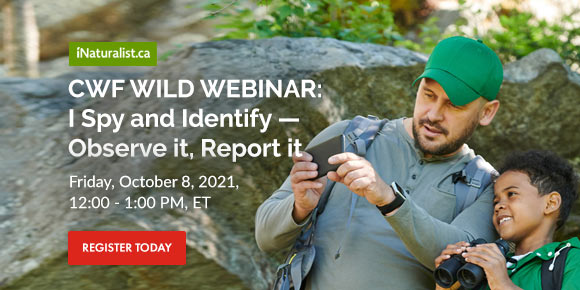
iNaturalist Canada Webinar Series: I Spy and Identify — Observe it, Report it
2021-10-08
Join us Friday, October 8, 12:00-1:00 p.m. ET. iNaturalist has become one of the world’s most popular nature apps and the Canadian Wildlife Federation has led the charge in bringing it to Canada. Join the Canadian Wildlife Federation for a webinar with the Canadian Council on Invasive Species (CCIS) to learn how you can help track and report invasive species across Canada through the national I Spy and Identify project and how uploading your observations of nature can have a real-life impact on biodiversity in Canada. Presenter: Kellie Sherman, Operations Supervisor at CCIS.
-
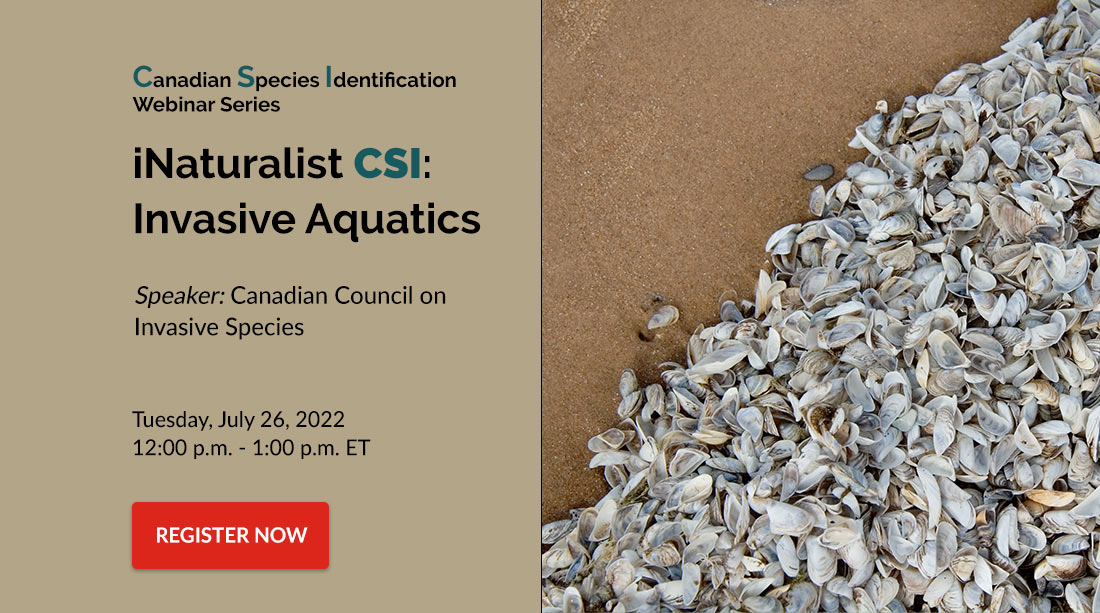
iNaturalist CSI: Invasive Aquatics
2022-07-26
Join the Canadian Wildlife Federation (CWF) July 26th, 12:00-1:00 Eastern for a webinar on how to photograph and identify Canada’s top 10 invasive aquatics using iNaturalist.ca, presented by the Canadian Council on Invasive Species (CCIS). Nearly one-fifth of the Earth’s surface is at risk of plant and animal invasions. Invasive species are threatening Canada’s ecosystems, economy and communities. Climate change is also exacerbating this issue and can make ecosystems more vulnerable to invasive species, and invasive species can worsen the impacts of climate change. The good news is - you can help! Learn how to ID Canada’s top 10 invasive aquatics so you can report them, helping to stop their spread. Every report helps scientists track and protect Canada’s natural spaces and biodiversity from the negative impacts of invasive species. iNaturalist has become one of the world’s most popular nature apps and the Canadian Wildlife Federation has led the charge in bringing it to the forefront of Canadian citizen science.
-
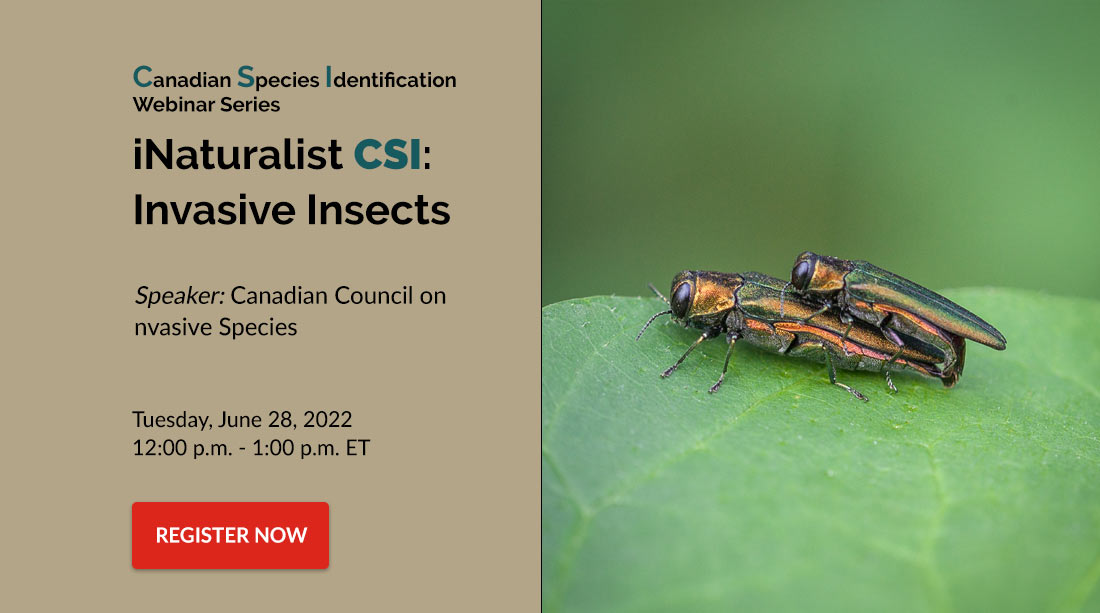
iNaturalist CSI: Invasive Insects
2022-06-28
Join the Canadian Wildlife Federation (CWF) for a webinar on how to photograph and identify Canada’s top 10 invasive insects using iNaturalist.ca, presented by the Canadian Council on Invasive Species (CCIS). Nearly one-fifth of the Earth’s surface is at risk of plant and animal invasions. Invasive species are threatening Canada’s ecosystems, economy and communities. Climate change is also exacerbating this issue and can make ecosystems more vulnerable to invasive species, and invasive species can worsen the impacts of climate change. The good news is - you can help! Learn how to ID Canada’s top 10 invasive insects so you can report them, helping to stop their spread. Every report helps scientists track and protect Canada’s natural spaces and biodiversity from the negative impacts of invasive species. iNaturalist has become one of the world’s most popular nature apps and the Canadian Wildlife Federation has led the charge in bringing it to the forefront of Canadian citizen science. Date: June 28th, 12:00-1:00 Eastern Host: Kellie Sherman, Operations Supervisor at CCIS presenting, James Pagé to host.
-
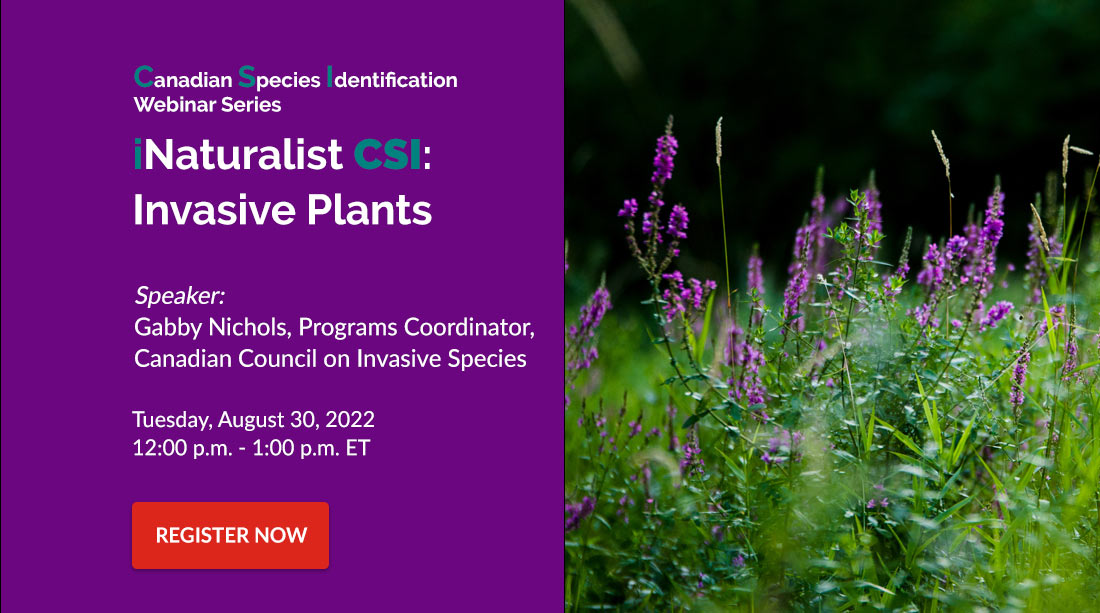
iNaturalist CSI: Invasive Plants
2022-08-30
Join the Canadian Wildlife Federation (CWF) for a webinar on how to photograph and identify Canada’s top 10 invasive plants using iNaturalist.ca, presented by the Canadian Council on Invasive Species (CCIS). Nearly one-fifth of the Earth’s surface is at risk of plant and animal invasions. Invasive species are threatening Canada’s ecosystems, economy and communities. Climate change is also exacerbating this issue and can make ecosystems more vulnerable to invasive species, and invasive species can worsen the impacts of climate change. The good news is - you can help! Learn how to ID Canada’s top 10 invasive plants so you can report them, helping to stop their spread. Every report helps scientists track and protect Canada’s natural spaces and biodiversity from the negative impacts of invasive species. iNaturalist has become one of the world’s most popular nature apps and the Canadian Wildlife Federation has led the charge in bringing it to the forefront of Canadian citizen science. Date: August 30th, 12:00-1:00 Eastern
-
iNaturalist Guide to Taking Photos
2021-04-13
Tips, tricks, and guides to help get your sightings identified
-
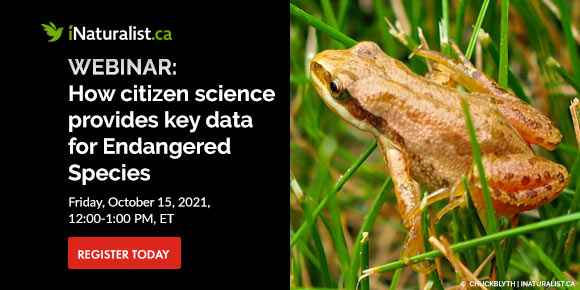
iNaturalist Webinar Series: How citizen science provides key data for Endangered Species
2021-10-15
iNaturalist has become one of the world’s most popular nature apps and the Canadian Wildlife Federation has led the charge in bringing it to Canada. Join us for an insightful webinar with the Committee on the Status of Endangered Wildlife in Canada (COSEWIC) on how iNaturalist can provide key information to help inform the assessment and conservation of endangered species in Canada. Leading the session will be John Reynolds, Chair of COSEWIC as well as Ecology Professor at Simon Fraser University, where he will discuss how citizen science greatly helps in the conservation of nature here in Canada.
-

International Monarch Monitoring Blitz Webinar
2024-08-01
Join us on August 1st, 2024, at noon Eastern Time for an engaging webinar on the International Monarch Monitoring Blitz. The Canadian Wildlife Federation (CWF) and the Commission for Environmental Cooperation will shed light on this incredible tri-national initiative aimed at protecting the endangered monarch butterfly. Discover how you can participate in this vital effort through iNaturalist in Canada, learn about the latest conservation strategies, and find out how you can make a difference in saving this iconic species. Whether you join us live or watch the recording later, this webinar offers valuable insights into the collaborative efforts to conserve monarch butterflies.
-

Into the Bat Cave: The Mysterious World of Bats and Bat Research
2023-10-25
As Halloween approaches bats are often depicted as terrors of the night. But the real threat is that bat populations are in steep declines in Canada… and humans are mostly to blame. Bats are much more terrorized by us than we are by them. Join CWF’s Bat Researcher Bailey Bedard to lean about the different Canadian bat species, the amazing abilities they have and the benefits they provide humans and the ecosystem. You will also be able to find out more about CWF’s bat research and how humans, while the primary threat to bats, can also be part of the solution to helping them recover. Date, Time, Time Zone:Wednesday October 25, 6 pm Eastern Time Host: Bailey Bedard, Bat Researcher, James Pagé Species at risk and Biodiversity Specialist, Emily Becker, Bat Researcher
-
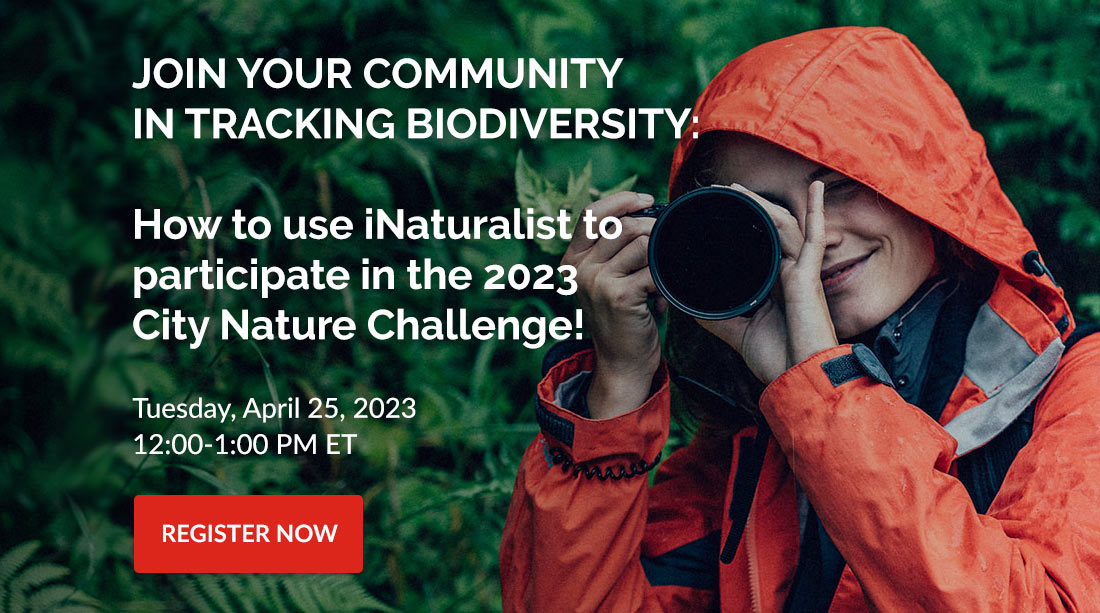
Join your community in tracking biodiversity
2023-04-12
April 12, noon -1:00 ET. How to use iNaturalist to participate in the 2023 City Nature Challenge! Learn how to help your city compete on the world stage in the 2023 City Nature Challenge as 42 Canadian cities compete with each other and over 400 other cities worldwide in a friendly biodiversity challenge. In this webinar, CWF’s James Pagé will explain how to contribute to this annual global event by recording as many wild plants and animals as possible using the iNaturalist Canada platform. If you can take a photo, you can contribute to conservation – find out how, as we approach the start of the City Nature Challenge. Not in a participating city? No problem, you can still contribute to iNaturalist anytime from anywhere throughout the year! Plus, we need everyone’s help in identifying what was found, even if it’s as simple as a Canada Goose.
-
Leave No Trace
2025-12-03
-
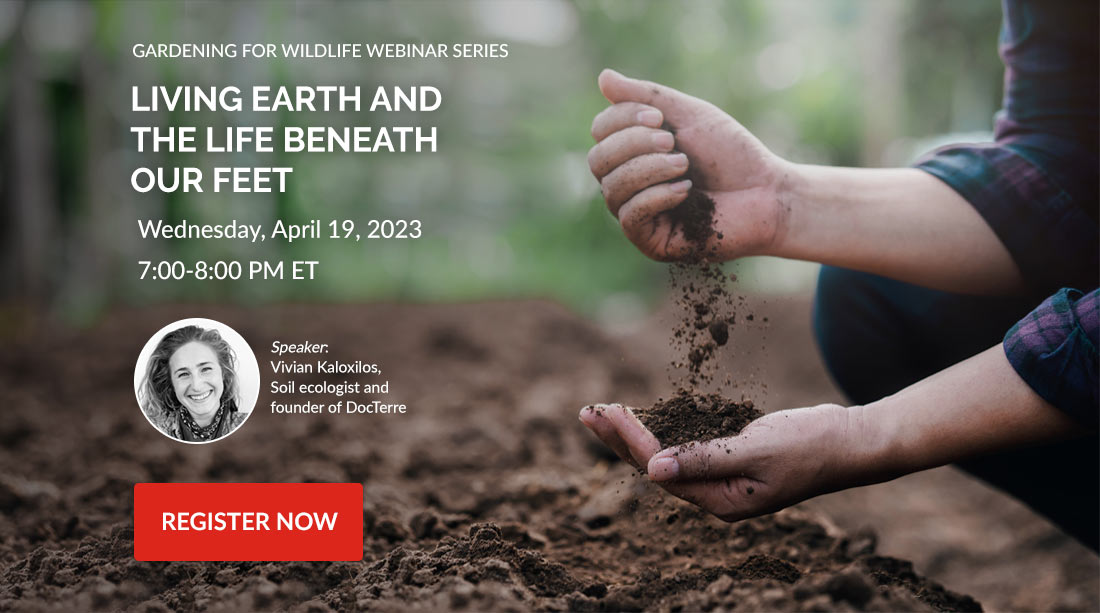
Living Earth and the Life Beneath Our Feet Webinar
2023-04-19
Join CWF Wednesday, April 19th at 7:00 p.m. ET for an eye-opening webinar with Vivian Kaloxilos, soil ecologist and founder of DocTerre, on the incredible interactions between soil organisms and plants. We live on planet Earth, but many people don't understand what soil is and how it functions. We will explore the living ecosystem in the soil and how it supports all life on Earth. You will also discover simple ways you can enhance your plants’ vitality and production in your own outdoor space. We hope you can join us!
-
Make a Monarch Butterfly Garden
2020-04-01
The Monarch Butterfly is a species that doesn’t stay in Canada for the winter — it flies as far as Mexico! That adds up to a migration of over 4,000 kilometres round trip (there and back). Monarchs are also listed as an endangered species on Canada’s species at risk registry, so we thought spring would be the perfect time for you to work on a project to help them! Here’s how to grow a garden they will love.
-

Managing Rural Roadsides for Pollinator Habitat
2020-03-10
Lanark County Lanark County is a rural municipality in eastern Ontario – to the west of Ottawa, Ontario – managing approximately 600 kilometres of county roads. Since 2016, Lanark County has followed an integrated vegetation management (IVM) plan to control invasive plants, especially wild parsnip, that encroach on pollinator habitat. In addition to controlling invasive plants, the goal of the IVM plan was also to re-establish desirable native vegetation along roadsides. To achieve these goals, Lanark County changed mowing practices, implemented integrated control measures to reduce impact to desirable vegetation (i.e. targeted spot spraying, hand control of invasives, reseeding disturbed sites, etc.), and improved hydroseeding practices with native seed to promote pollinators. Lanark County has been successful in reducing invasive plant infestations and improving pollinator habitat on almost 450 hectares of rural roads, and now has the opportunity to share some lessons learned with other municipalities about how they can help improve pollinator habitat along roadsides.
-
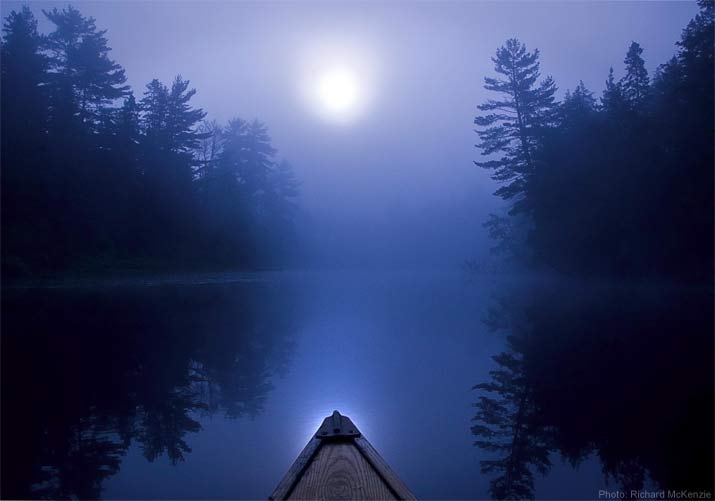
-
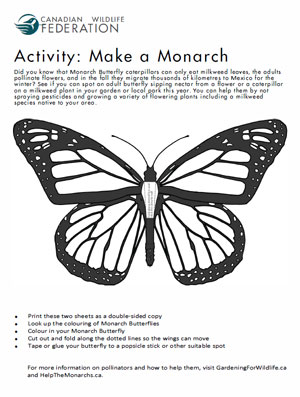
Monarch Butterfly Activity Sheet
2025-12-05
Did you know that Monarch Butterfly caterpillars can only eat milkweed leaves, the adults pollinate flowers, and in the fall they migrate thousands of kilometres to Mexico for the winter? See if you can spot an adult butterfly sipping nectar from a flower or a caterpillar on a milkweed plant in your garden or local park this year.
-
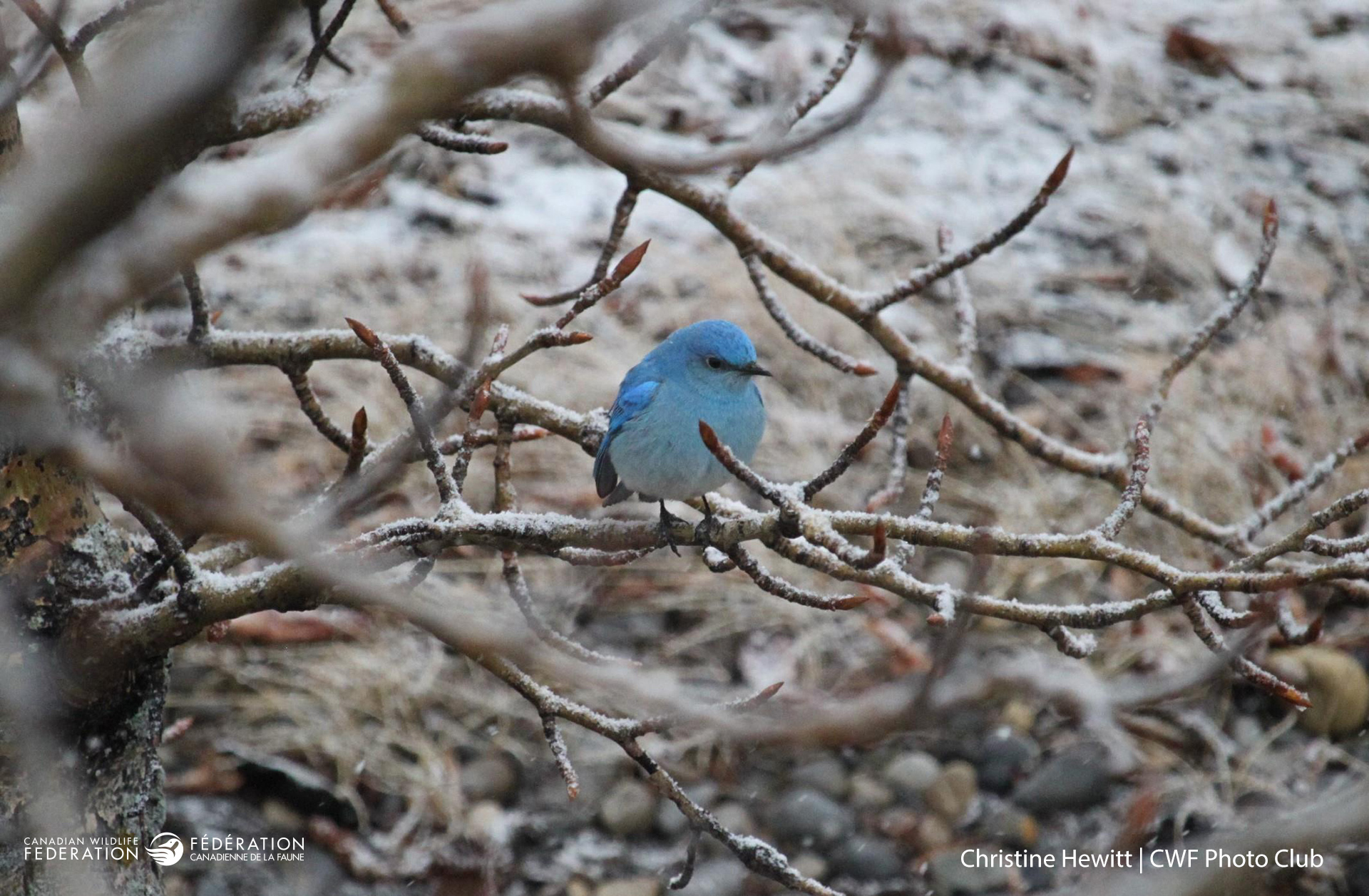
-
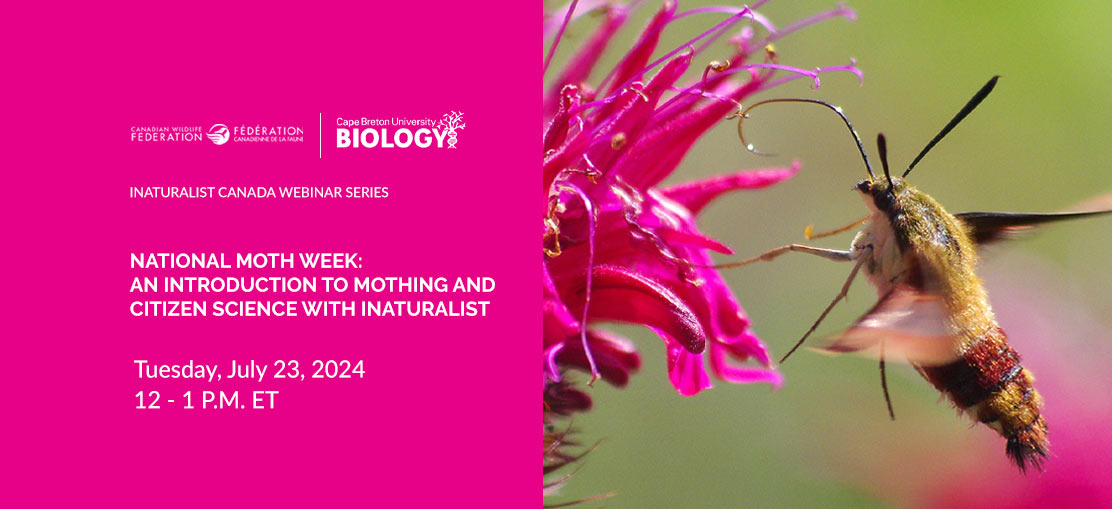
National Moth Week: An Introduction to Mothing and Citizen Science with iNaturalist
2024-07-23
Join us for an enlightening webinar on mothing and citizen science, perfect for beginners eager to explore the fascinating world of moths. Alicia will guide us through the easy steps of mothing, providing tips for taking great photos and identifying key features to differentiate moths from butterflies. She will also share insights on how to recognize general moth groups. Whether you're new to mothing or looking to enhance your skills, this webinar is designed to help you appreciate these incredible insects and contribute to scientific knowledge. Don't miss this opportunity to learn and participate in National Moth Week! For more information, visit the National Moth Week 2024 Canada Umbrella Project on iNaturalist.
-
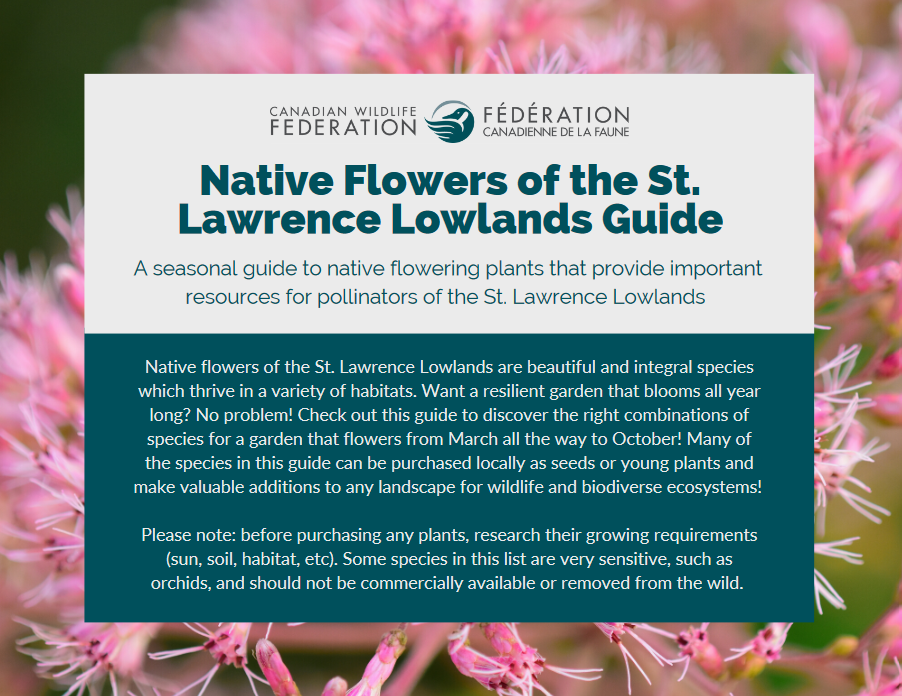
Native Flowers of the St. Lawrence Lowlands Guide
2025-12-05
A seasonal guide to native flowering plants that provide important resources for pollinators of the St. Lawrence Lowlands
-
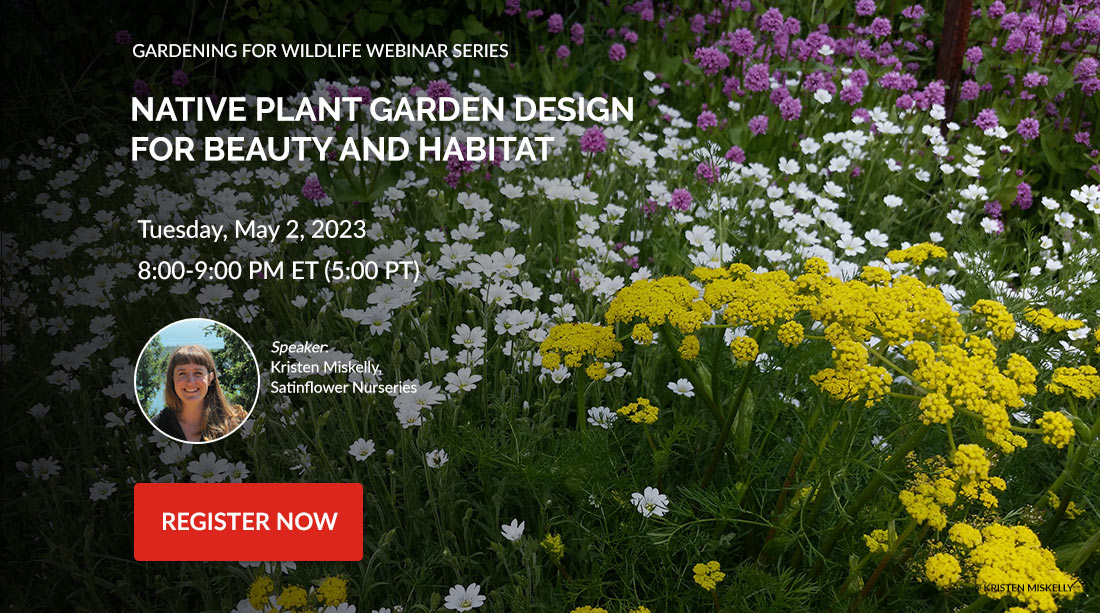
Native Plant Garden Design for Beauty and Habitat
2023-05-02
Join CWF as Kristen Miskelly, biologist and owner of a native plant nursery and consulting business, shares design principles for home gardens. She will also touch upon using native plants in creating green roofs, rain gardens and planting along septic beds and boulevards. Kristen will guide you through various aspects of working with native plants, from choosing the best plants for your spot, site preparation, design considerations, maintenance and timing of activities. Examples from British Columbia will be shared, but the principles can be applied broadly across our Canadian landscapes. We hope you can join us!
-
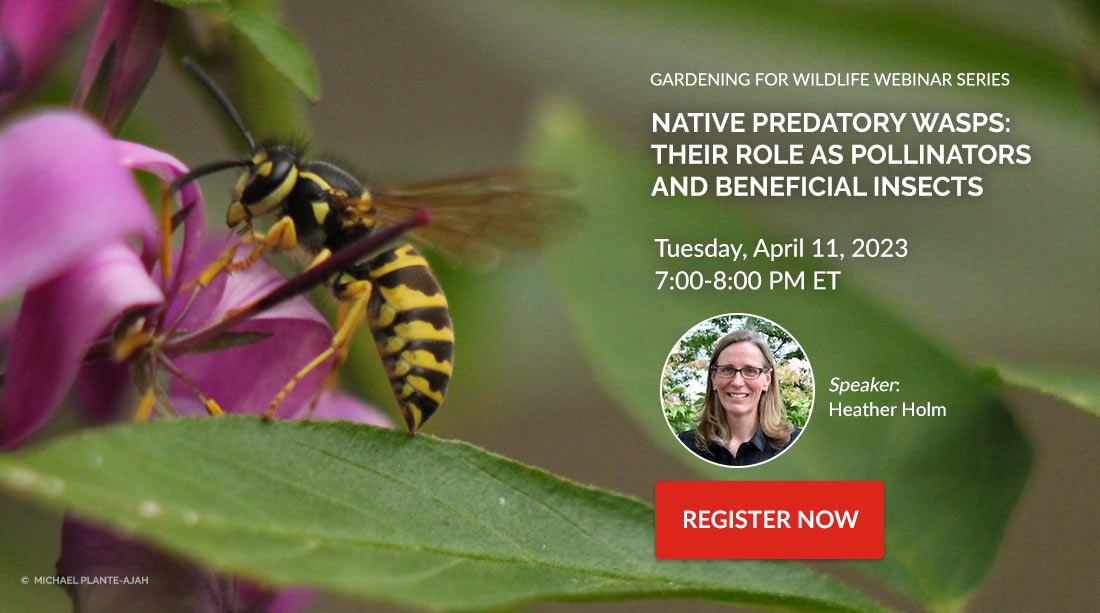
Native Predatory Wasps: Their Role as Pollinators and Beneficial Insects
2023-04-11
Gardening for Wildlife Webinar Series: Join CWF April 11th as Heather Holm, highly-respected researcher and award-winning author, shares her discoveries and beautiful photography of our native wasps. In this webinar, Heather “will highlight many amazing natural history and biology facts about native wasps illustrating their nesting habitat, prey specificity, and the ecosystems services they provide—pest insect population control and pollination.” Please note – this webinar will only be available as a recording for those who register for a few days afterwards. Please register to avoid missing out!
-
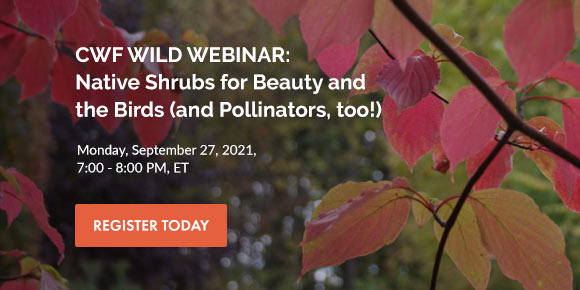
Native Shrubs for Beauty and the Birds (and Pollinators, too!)
2021-09-27
Join the Canadian Wildlife Federation and our guest presenter, Colleen Cirillo, to discover the beauty and functionality of Canada's native shrubs. Delicate flowers, showy fruit and colourful fall leaves make these smaller woody plants ideal additions to any garden. But you will get so much more than beauty. These plants will also attract and support a diversity of native insects and birds, thereby helping you counter biodiversity loss right outside your door.
-
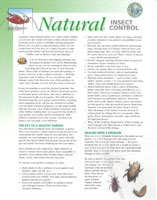
Natural Insect Control Handout
2025-12-05
A garden is more than just plants. It may be tempting to reach for chemical pesticides. But while these products can be an effective short-term answer, they don't contribute to the long-term health of your garden.
-
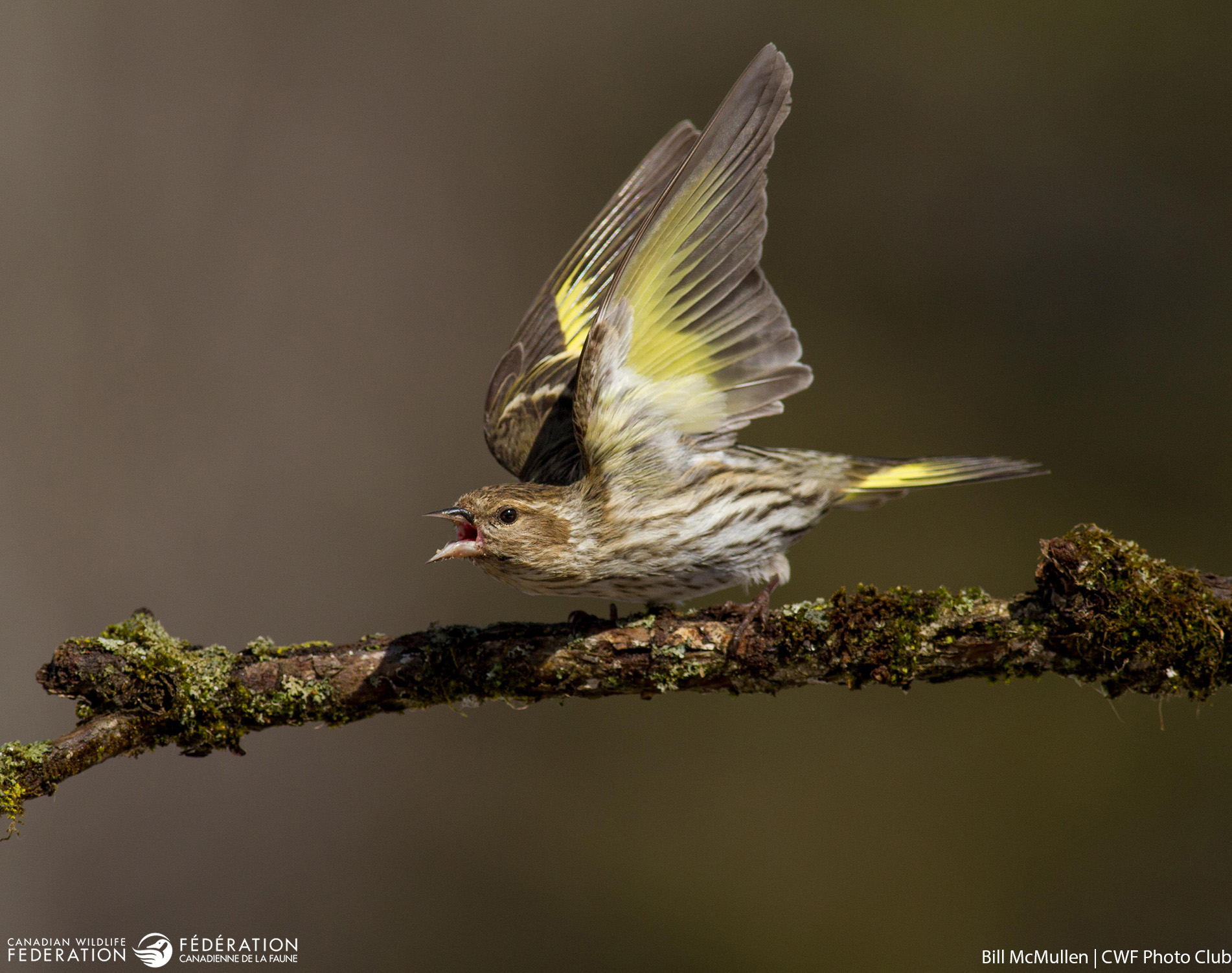
-
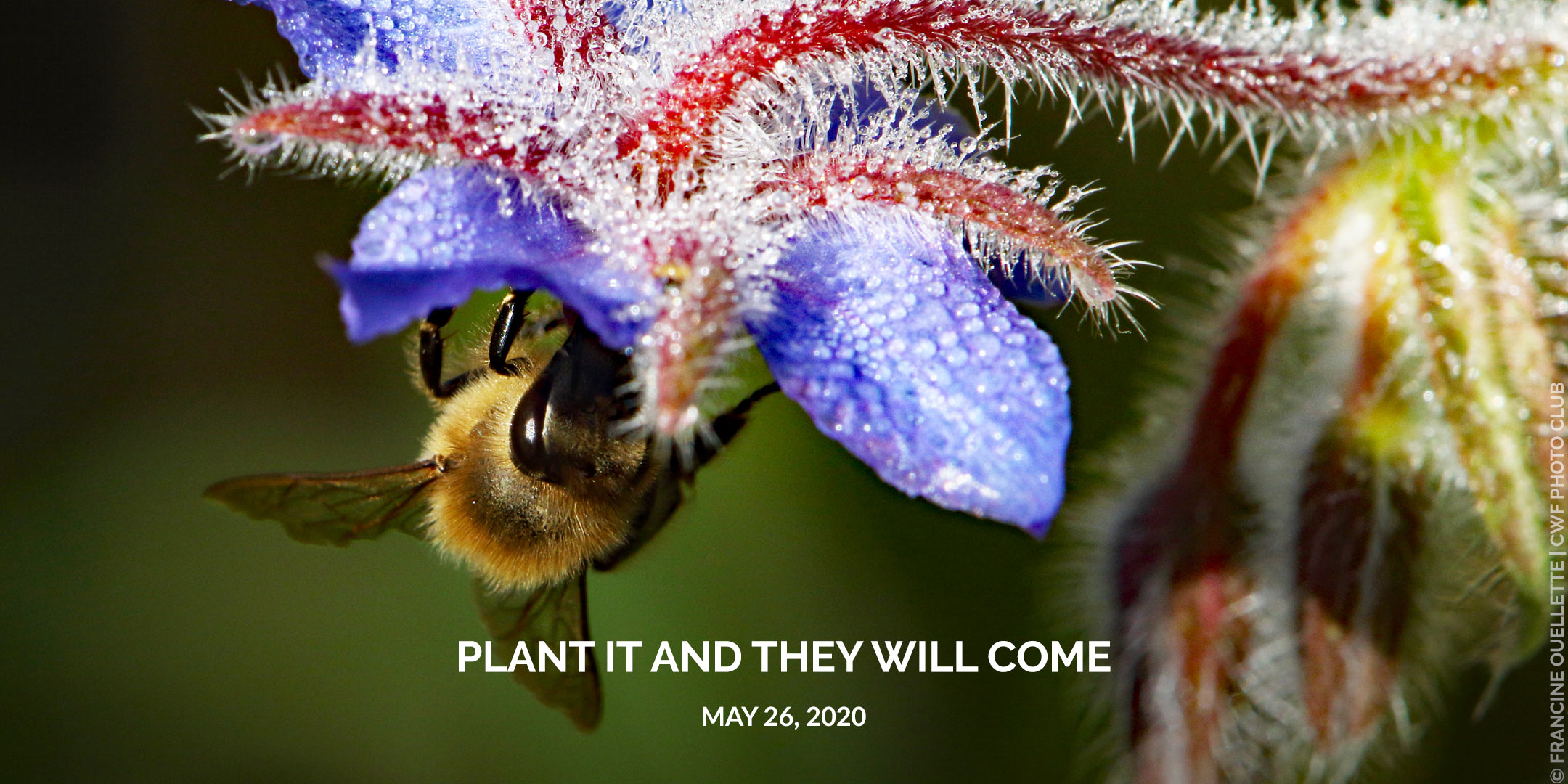
Plant It and They Will Come
2020-05-26
How one woman discovered the joys of creating a wildlife-friendly garden. Join CWF as Berit Erickson, pollinator garden blogger, shares her urban garden’s transformation from ornamental to wildlife-friendly. Discover how much easier it was than she thought and all the benefits she and her family now enjoy. So if the idea of creating a wildlife-friendly garden is daunting to you or you just want to get some new ideas, join us for this informative and inspiring webinar.
-
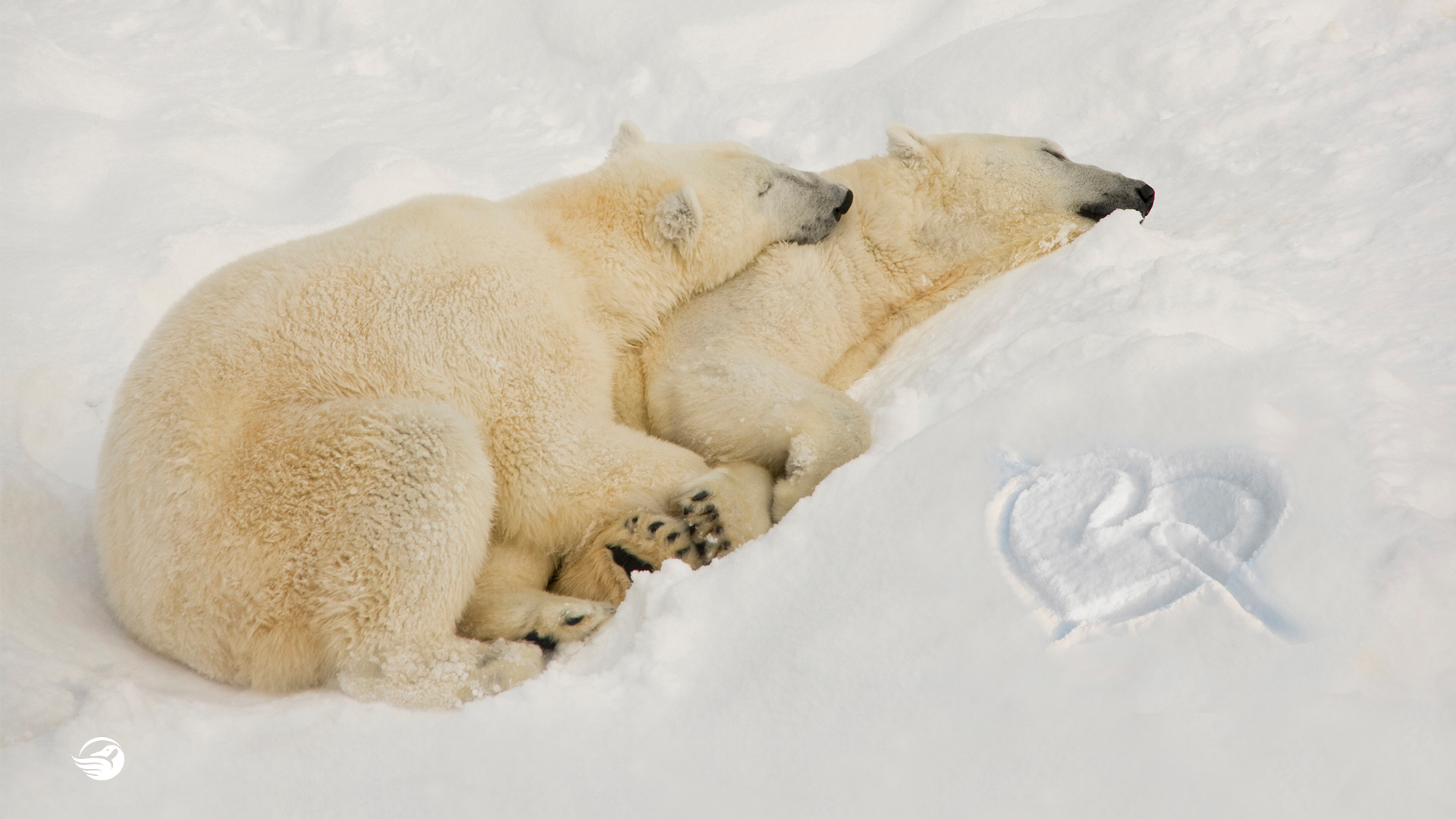
-
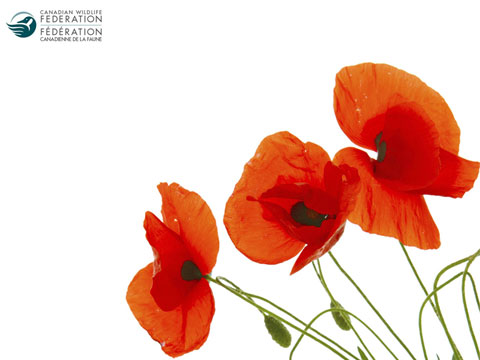
-
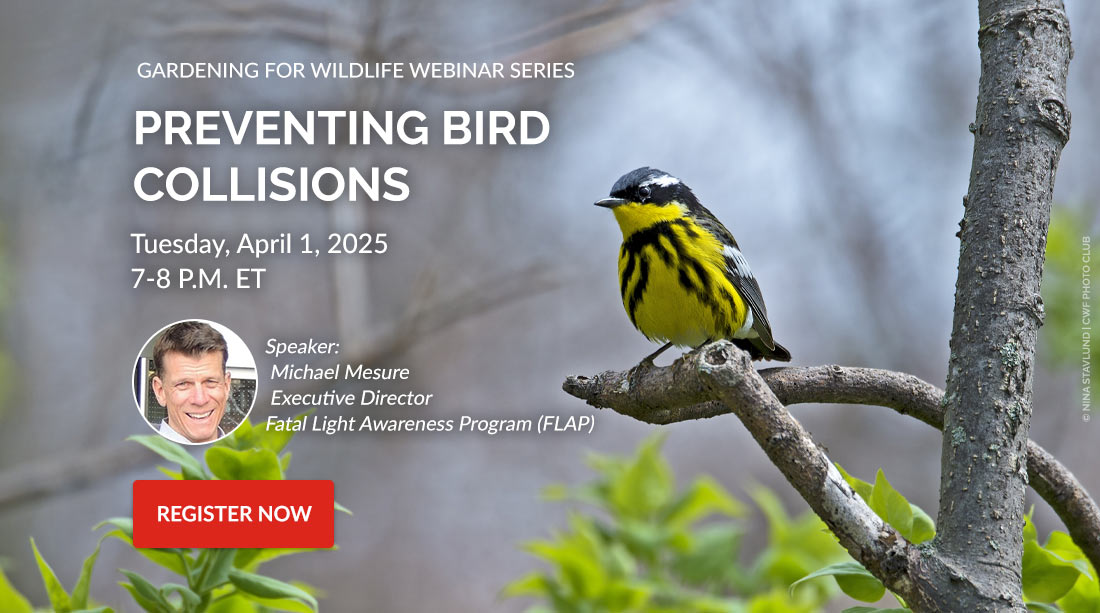
Preventing Bird Collisions
2025-04-01
Each year in Canada approximately 25 million birds die from building collisions. This is not only heartbreaking to witness but is a significant loss to biodiversity and the role these birds play. The good news is that there are solutions! Join the Canadian Wildlife Federation on Tuesday, April 1 at 7:00 p.m. ET to discover effective ways to prevent bird strikes at home, work or at the cottage. Our guest will be Michael Mesure, a founding member and Executive Director of Fatal Light Awareness Program (FLAP) Canada. Michael will speak about the work of FLAP Canada, how human-made structures threatens birds and offer solutions for mitigating building collisions. This will include examples of both effective and ineffective collision deterrent methods and some background on bird-friendly building design guidelines, policies, code and law.
-
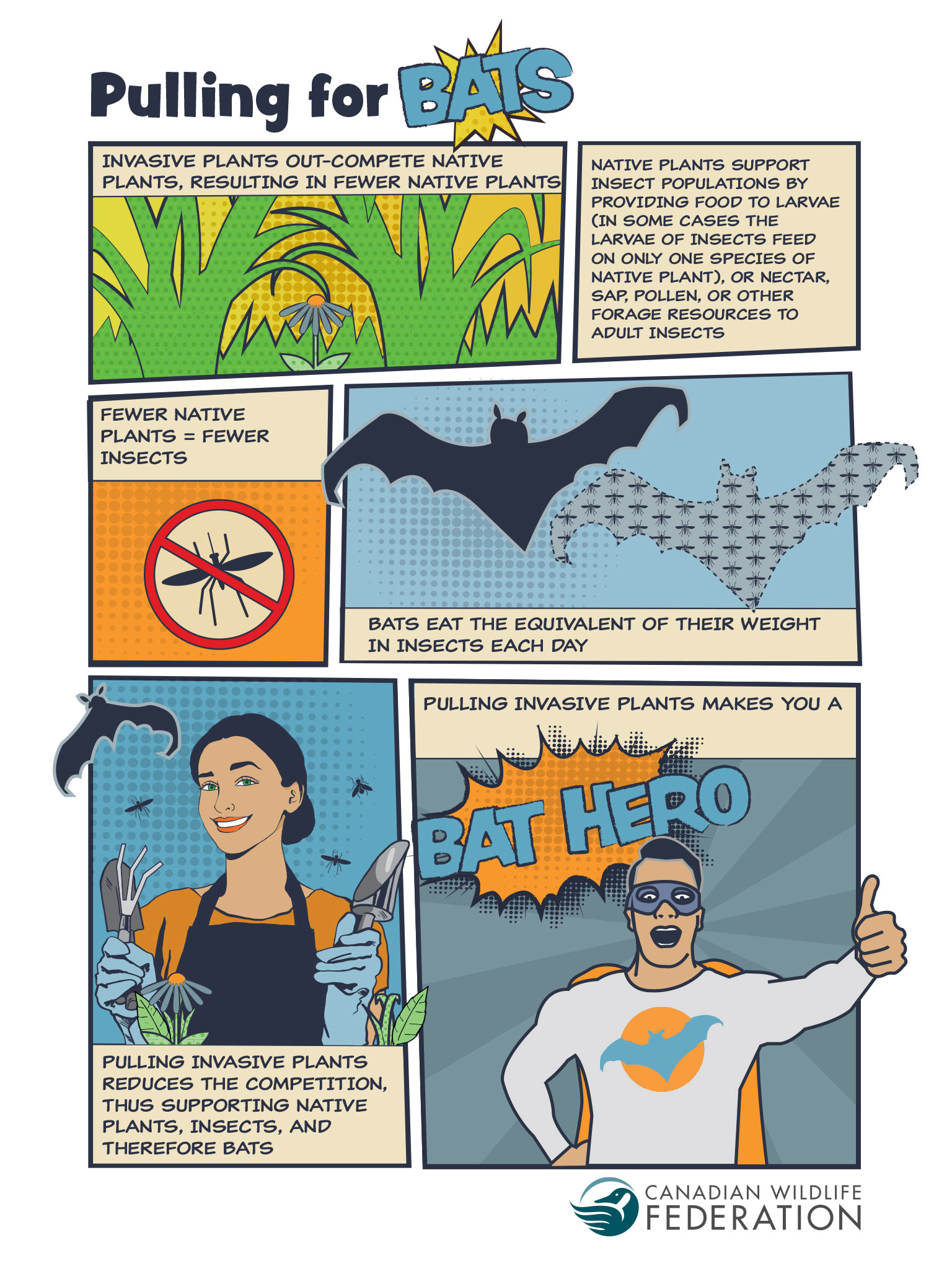
Pulling for Bats
2017-09-13
Native plants support diverse insect populations by providing food for adults and larvae. Insects will feed on nectar, pollen or leaves and some will forage on only one species of native plant!
-
-

-
Simple, Fun Ideas to Get Kids Outside
2025-12-05
It feels good to slow down and savour the moment, especially as our lives become ever busier. Here are some of the simplest things you and your children can do to make your time outside fun and special, many of which are time-honoured Canadian favourites.
-
Six Simple Steps to iNaturalist
2021-04-19
Record your wildlife observations and contribute to conservation in Canada
-
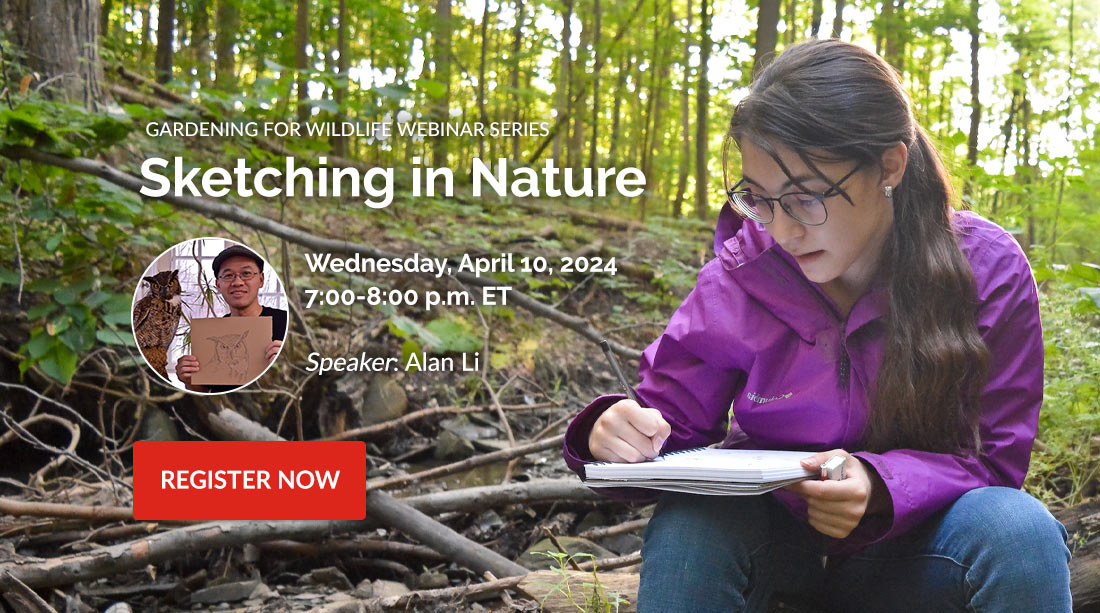
Sketching in Nature
2024-04-10
Join CWF for our webinar “Sketching in Nature”, a creative activity that can enrich your understanding of the natural world. Our guest speaker, Alan Li, is both a brilliant artist and a down-to-earth teacher who will share practical advice on sketching outdoors including which art supplies work best in the field. He will also give you a peek inside his sketchbooks and provide tips on how to make expressive sketches of your subjects, whether it’s a perching bird or fallen leaf, without sacrificing accuracy or realism. Sketching is for all ages and all abilities. You do not require an art degree nor do you need to feel intimidated. The best place to begin your sketching adventures is close to home; your local park, a nearby creek or woodlands are wonderful places to explore.
-
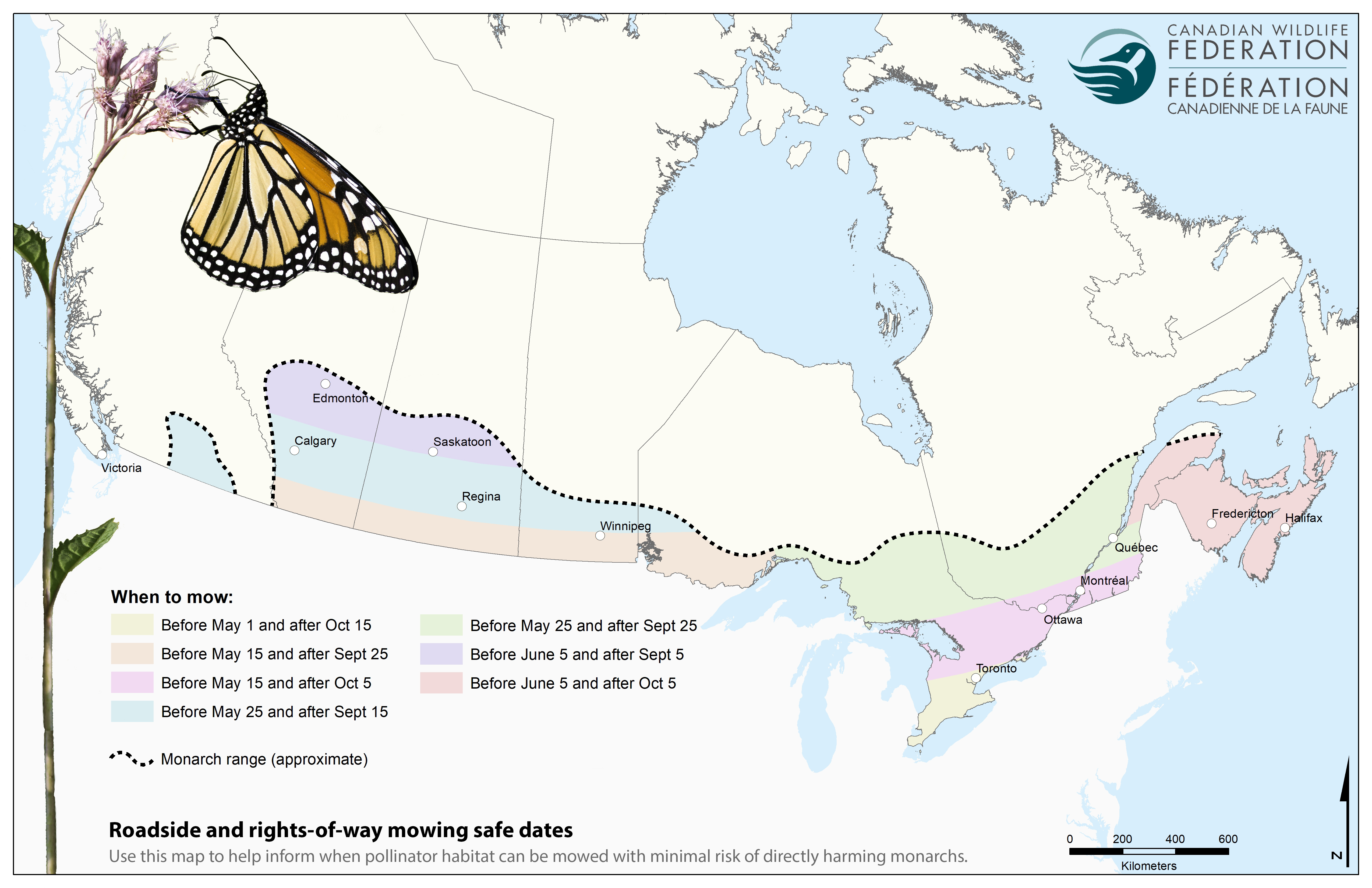
Spring Monarch Mowing Map
2022-05-01
-
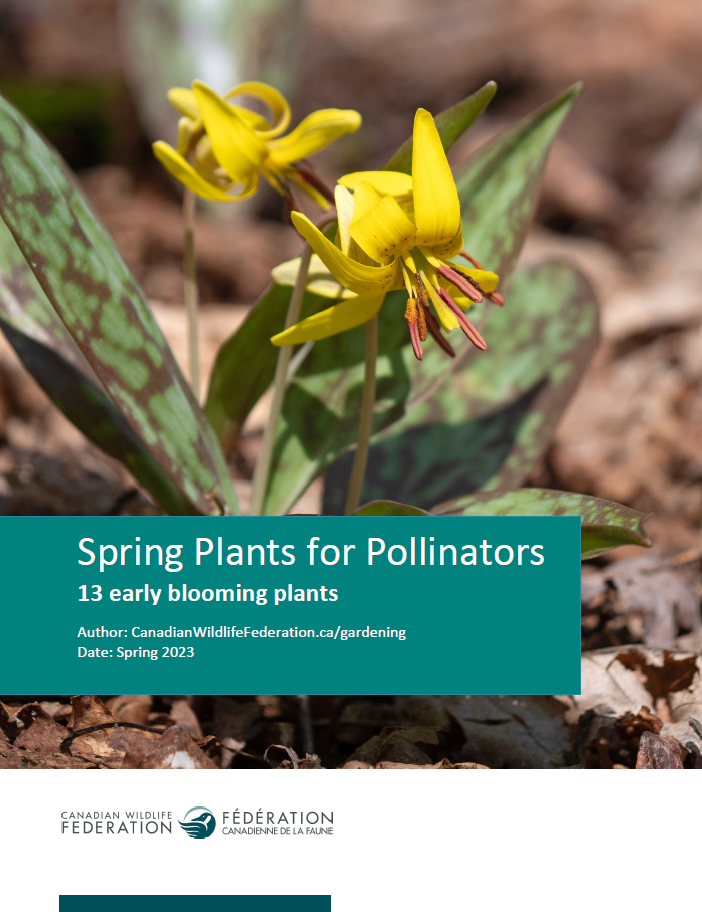
-
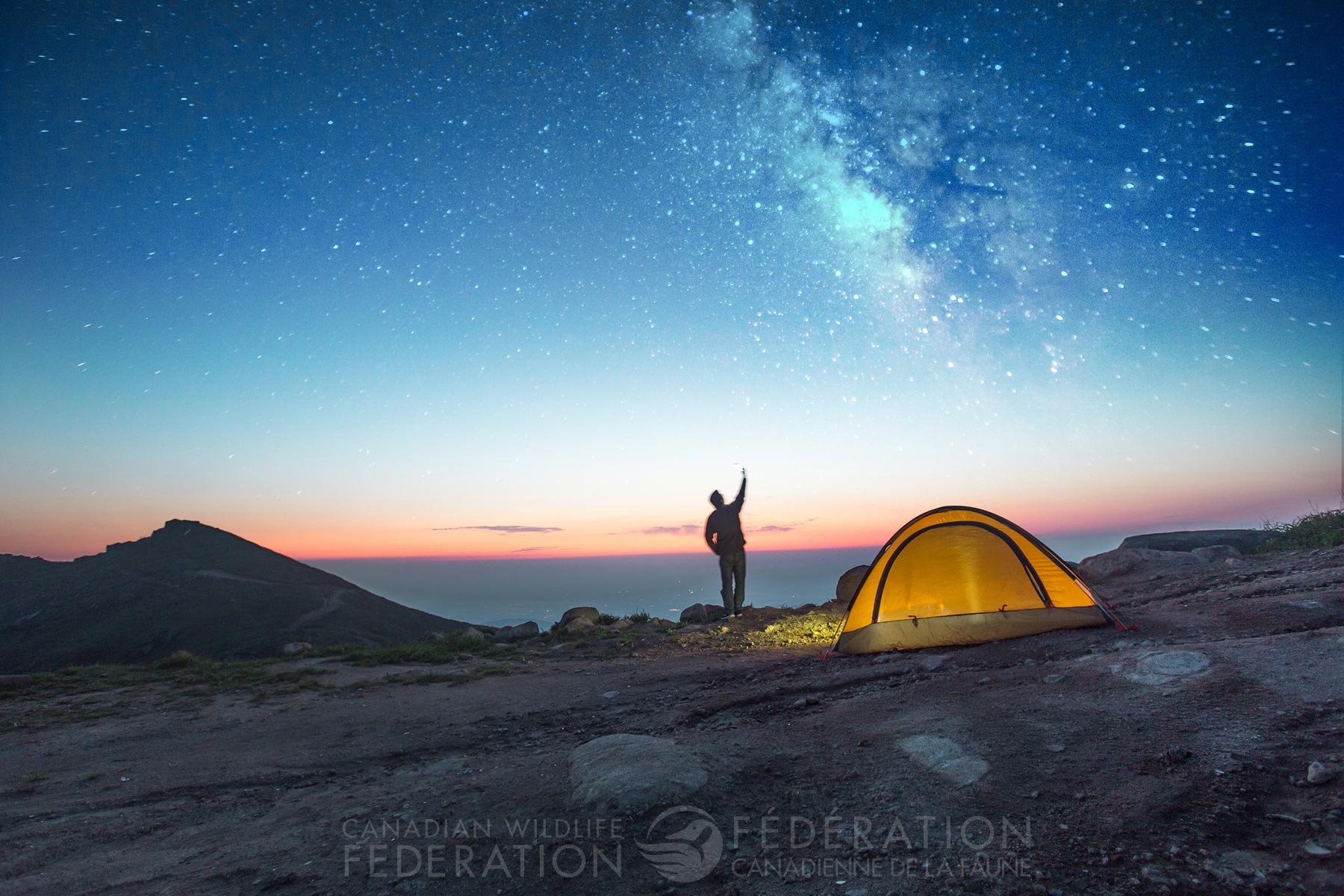
-
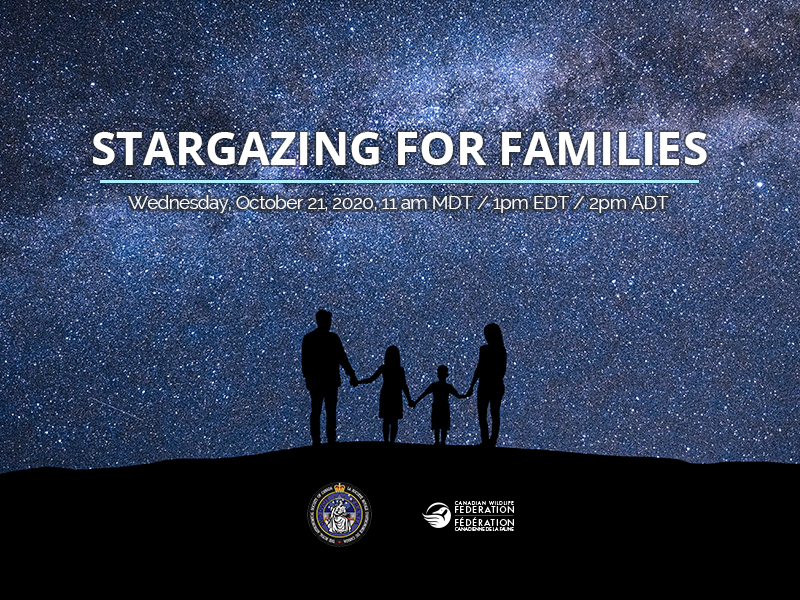
Stargazing for Families
2020-10-21
Wednesday, October 21 11am MT / 1pm ET / 2pm AT Online CWF & RASC Looking for ways to get outside with your family this fall? As the days start to shorten, stargazing offers a great opportunity to take advantage of the early evening hours, connect with nature and learn more about the night sky! Join Ian Wheelband from the Royal Astronomical Society of Canada's Toronto Centre and the Canadian Wildlife Federation (CWF) for a family-friendly introduction to stargazing! Gain practical tips and tools to help you get started and discover what stars, constellations and planets can be seen from your backyard. Family members of all ages are welcome to attend. No experience required - just be sure to bring your curiosity! This webinar is being offered as part of CWF's WILD Family Nature Club program. Check out our online community hub for more family-friendly resources, events and activities!
-
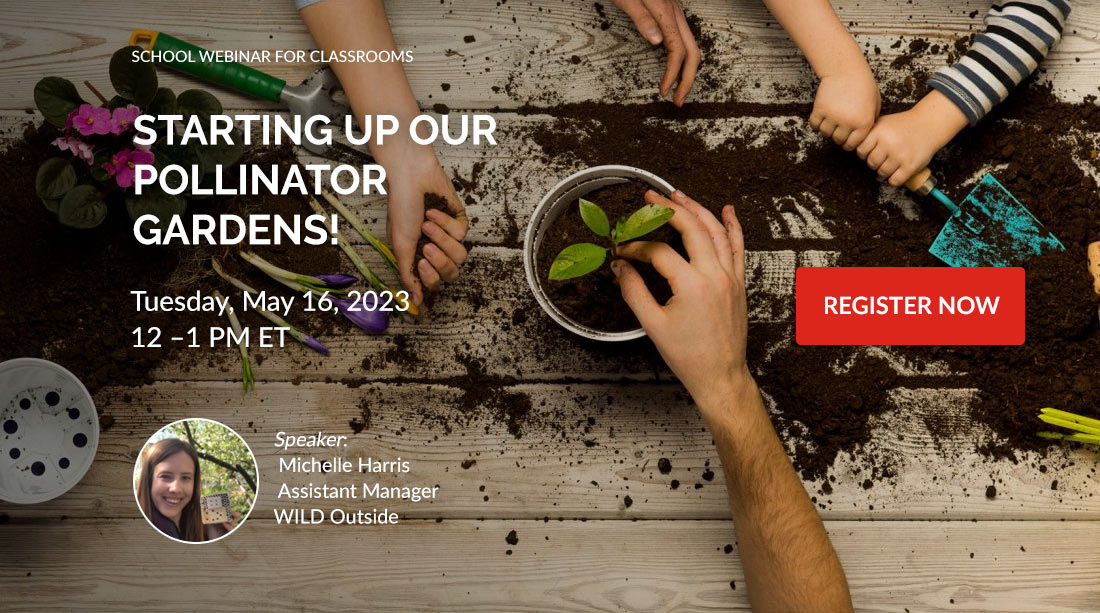
Starting Up Our Pollinator Gardens!
2023-05-16
Calling all grades 3 to 6 teachers! It’s nearly time to start planting in our gardens. This fun and engaging webinar with classes from across Canada will help us learn how to best prepare our gardens before our plants go in, as well as how to take care of our plants so they grow and support pollinators all summer.
-
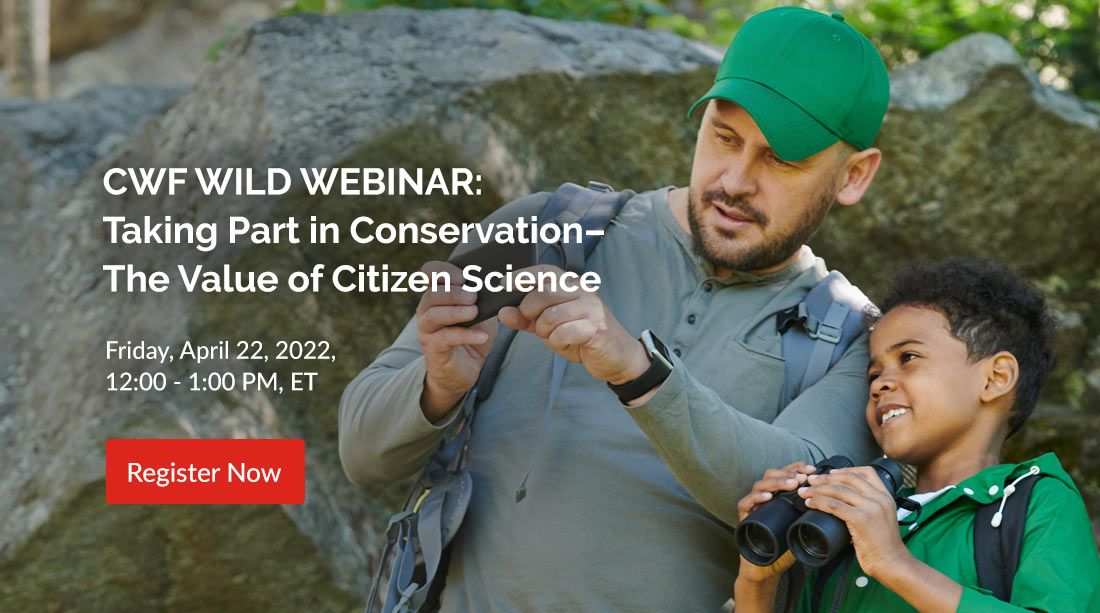
Taking Part in Conservation: The Value of Citizen Science
2022-04-22
April 22, 2022: English 12-1 ET, French 2-3 ET.. Join the Canadian Wildlife Federation in celebration of Earth Day and CWF’s 60th anniversary in learning how you can contribute to conservation using just a phone or digital camera. Ordinary people turned citizen scientists are contributing valuable information every day to help conserve our natural world. Through apps and websites like iNaturalist Canada and initiatives like the City Nature Challenge, thousands of people are contributing millions of observations, filling gaps that scientists can’t accomplish on their own. Join CWF’s English Webinar with James Pagé to hear about the value of citizen science data and how to take part. Join CWF’s French webinar with Alexandre Anctil (of the Centre de données sur le patrimoine naturel du Québec) to hear about the value of citizen science to the Quebec Conservation Data centre and how to take part.
-
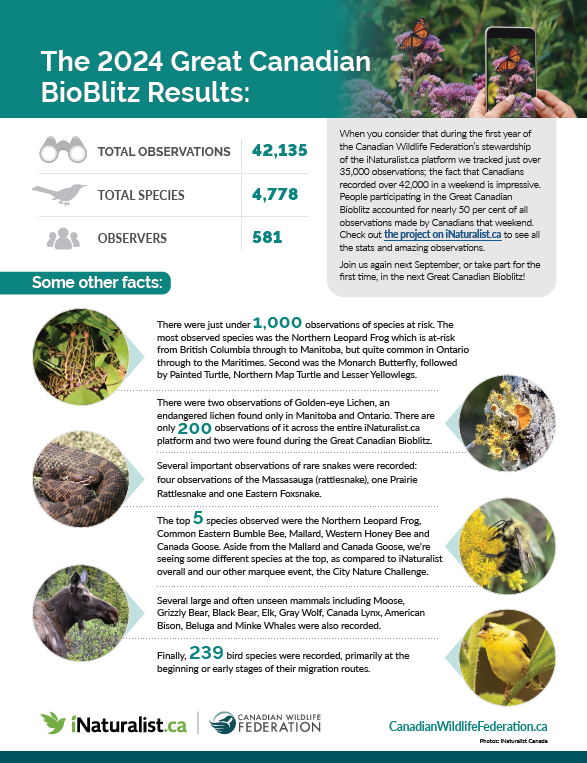
The 2024 Great Canadian Bioblitz Results
2024-10-01
-
The Basics of Wildlife-friendly Gardening
2025-12-05
Gardening with wildlife in mind is a fantastic opportunity to not only help your garden flourish but to also support wildlife and ecosystems which provide us pollination and pest control services, among others. Best of all, it’s easy to do and beautiful too! The Canadian Wildlife Federation’s Gardening for Wildlife program has webinars, articles, tools, posters and more to help you discover, appreciate and support your local and migratory wild neighbours. CWF also has a Garden Habitat Certification where we give official recognition to those whose efforts are supporting wildlife.
-
The Basics of Wildlife-friendly Gardening (printer-friendly version)
2025-12-05
Gardening with wildlife in mind is a fantastic opportunity to not only help your garden flourish but to also support wildlife and ecosystems which provide us pollination and pest control services, among others. Best of all, it’s easy to do and beautiful too! The Canadian Wildlife Federation’s Gardening for Wildlife program has webinars, articles, tools, posters and more to help you discover, appreciate and support your local and migratory wild neighbours. CWF also has a Garden Habitat Certification where we give official recognition to those whose efforts are supporting wildlife.
-
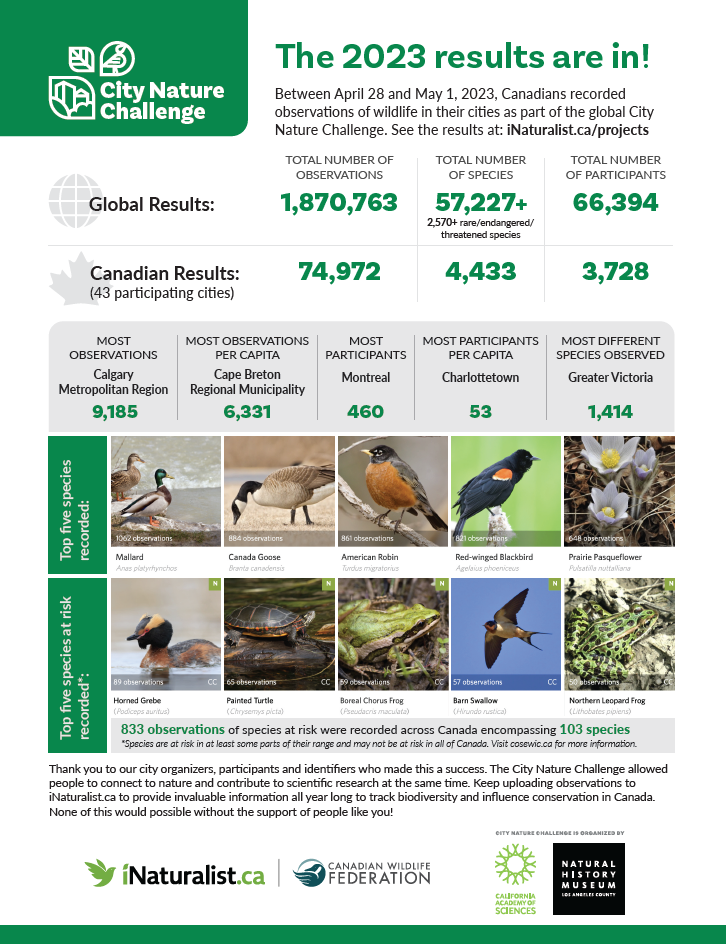
The City Nature Challenge 2023 Results
2023-05-10
Between April 28 and May 1, 2023, Canadians recorded observations of wildlife in their cities as part of the global City Nature Challenge. See the results at: iNaturalist.ca/projects
-
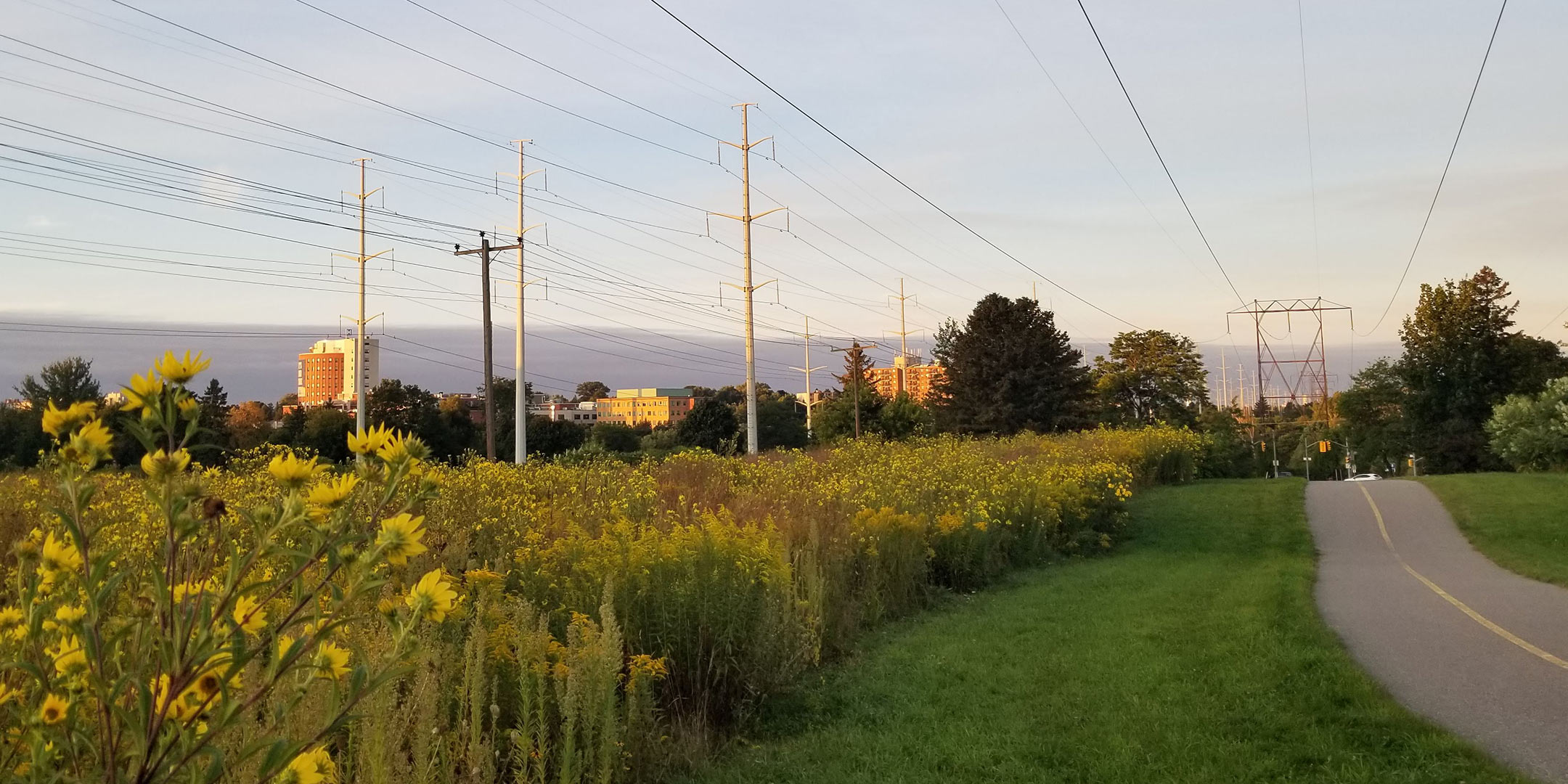
The Meadoway: Planning and Restoring Pollinator Habitat in a utility corridor in Toronto, Ontario
2020-01-30
The Meadoway is transforming a hydro corridor in Scarborough, ON into a vibrant sixteen-kilometre stretch of urban greenspace and meadowlands that will become one of Canada’s largest linear urban parks. Cyclists and pedestrians will soon be able to travel from the heart of downtown Toronto to Rouge National Urban Park without ever leaving nature. Over the next seven years, this site will become a place filled with butterflies, birds and wildflowers – a rich meadow landscape realized on a scale never before seen in Toronto. This webinar will help to showcase and walk you through the overall planning, permits/policies, education/outreach, communication and meadow restoration needed to create a project similar to The Meadoway.
-

-

-
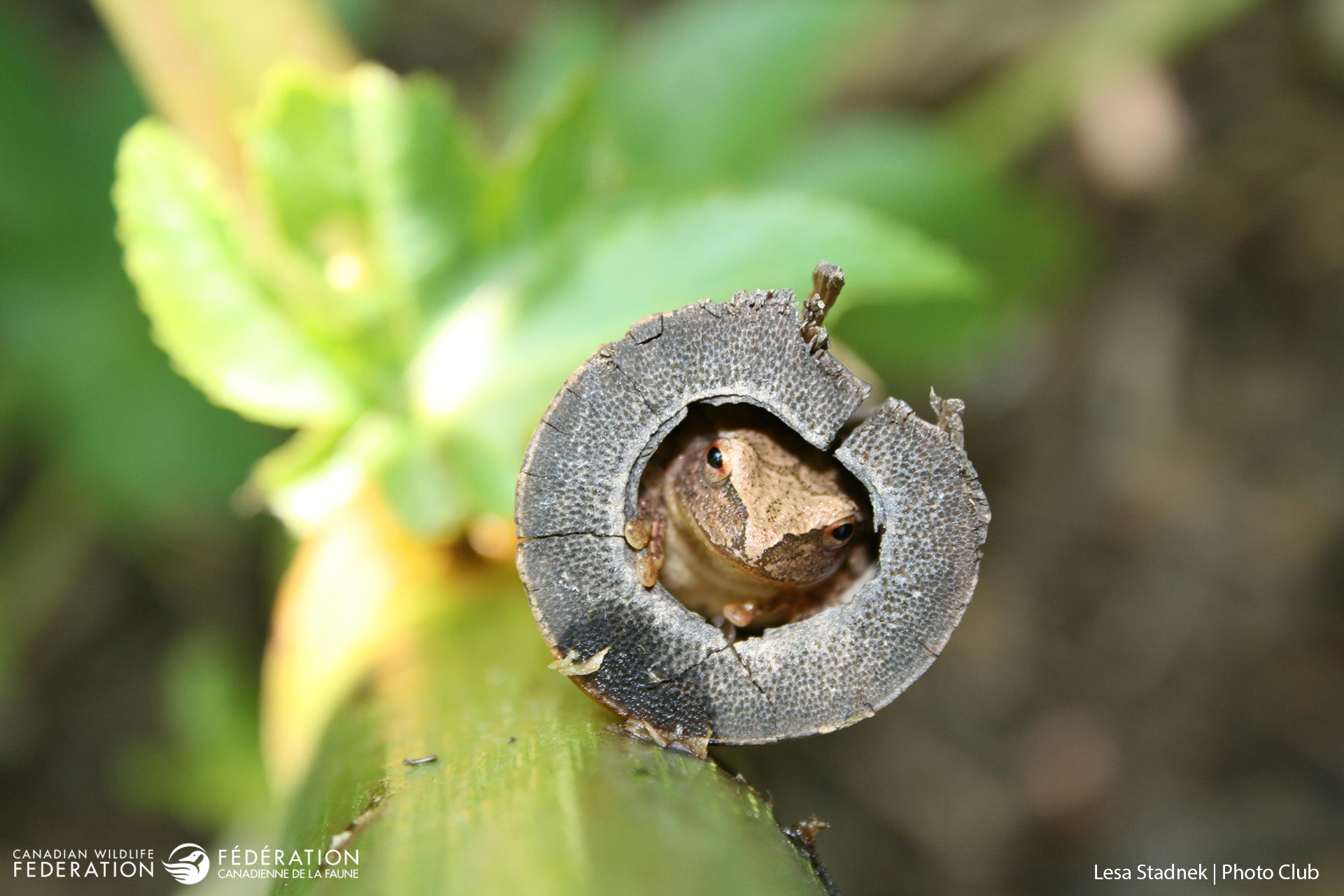
-

Trick or Treat!
2025-12-05
Trick or treat! For Halloween, we’re featuring this illustration of a gobbling chipmunk!
-
-
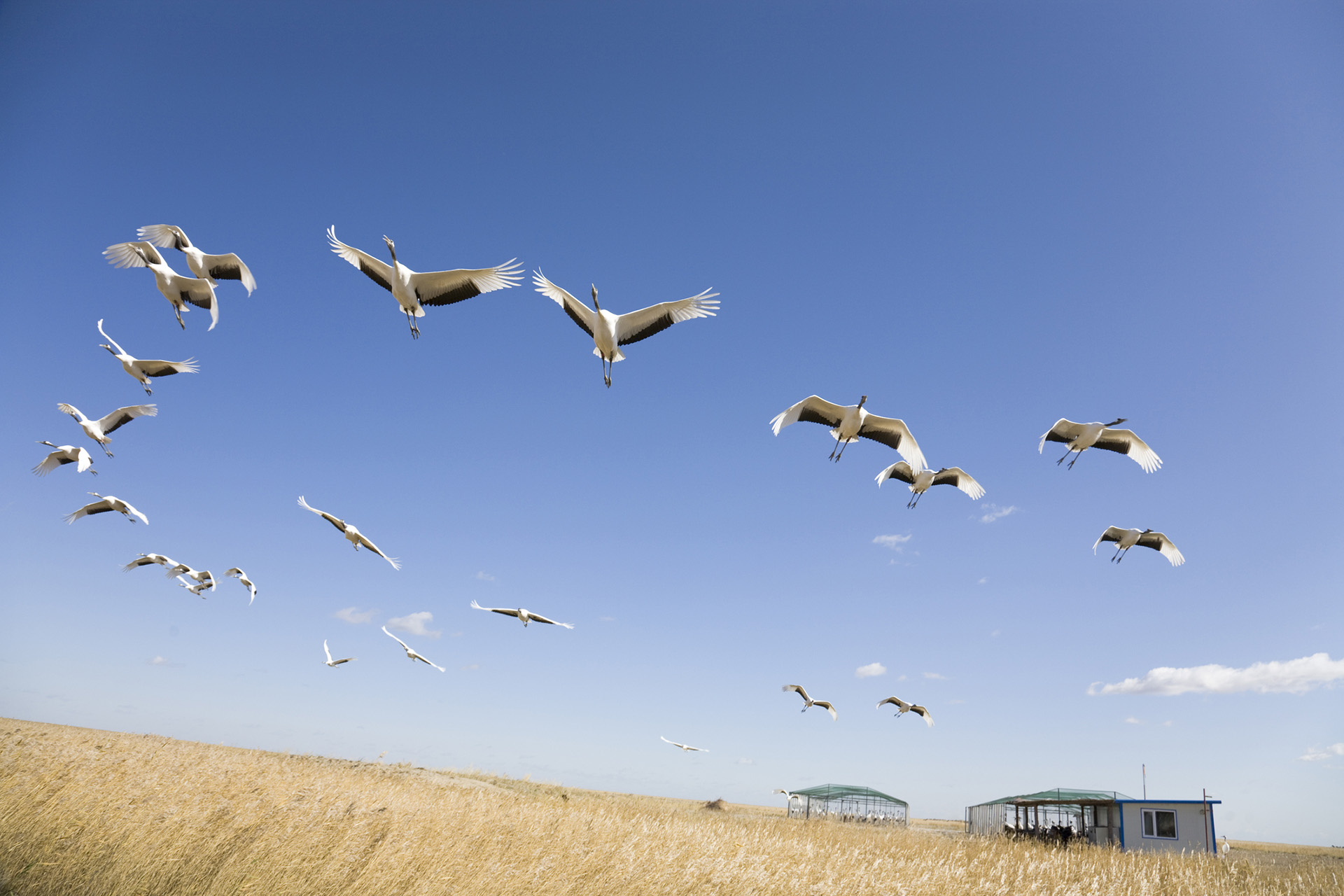
-
-

Wild About Butterflies Poster
2025-12-05
The brilliance of our many butterflies adds beauty to any garden. The vibrant orange and black of monarchs or the dazzling tiger stripes of swallowtails add contrast among the blooms. Other species may lack some of this glamour but are welcome visitors none the less for the gentle cheer they bring.
-
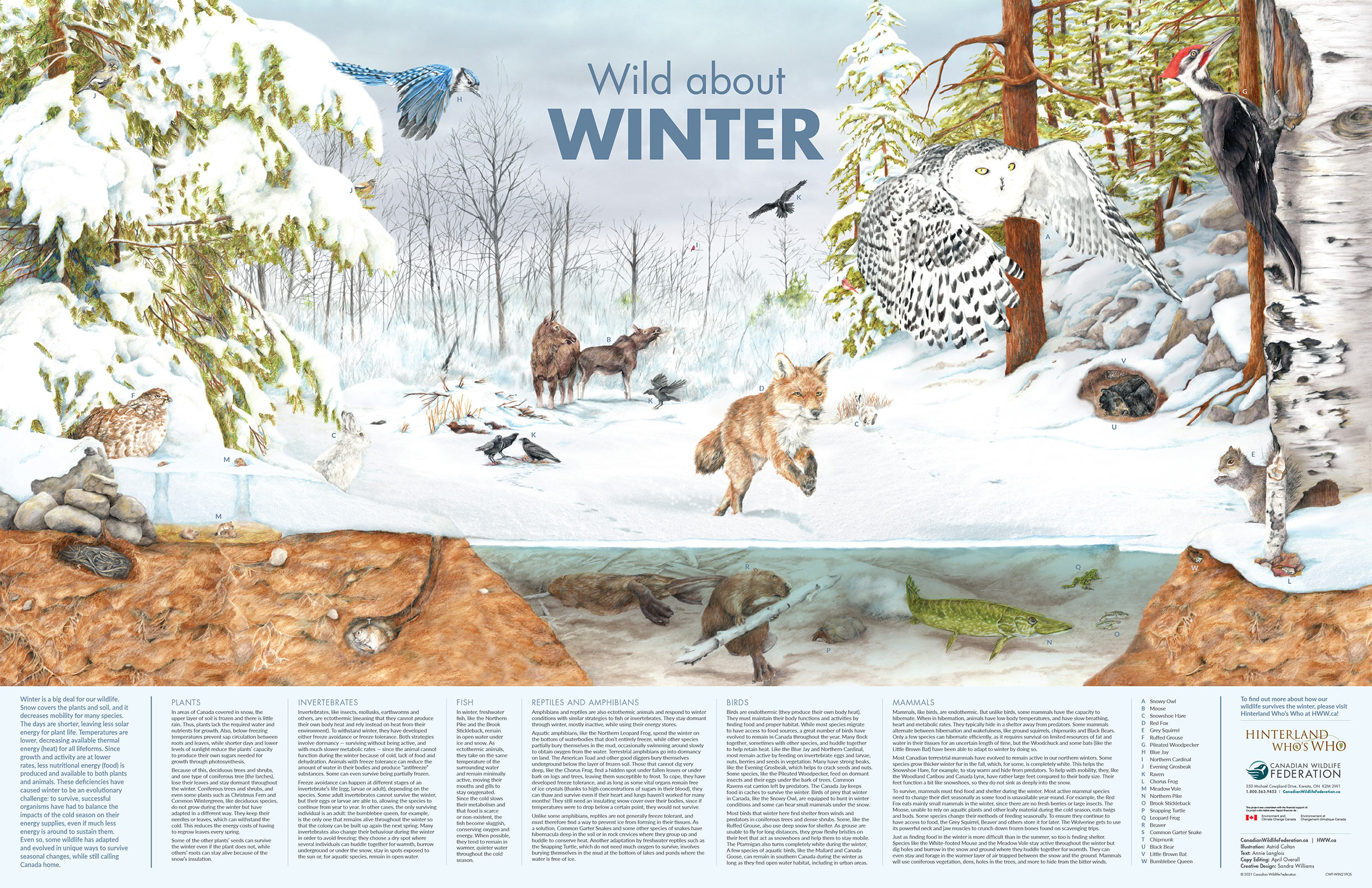
Wild About Winter Poster
2025-12-05
Winter is a big deal for our wildlife. Snow covers the plants and soil, and it decreases mobility for many species. The days are shorter, leaving less solar energy for plant life. Temperatures are lower, decreasing available thermal energy (heat) for all lifeforms. Since growth and activity are at lower rates, less nutritional energy (food) is produced and available to both plants and animals. These deficiencies have caused winter to be an evolutionary challenge: to survive, successful organisms have had to balance the impacts of the cold season on their energy supplies, even if much less energy is around to sustain them. Even so, some wildlife has adapted and evolved in unique ways to survive seasonal changes, while still calling Canada home.
-
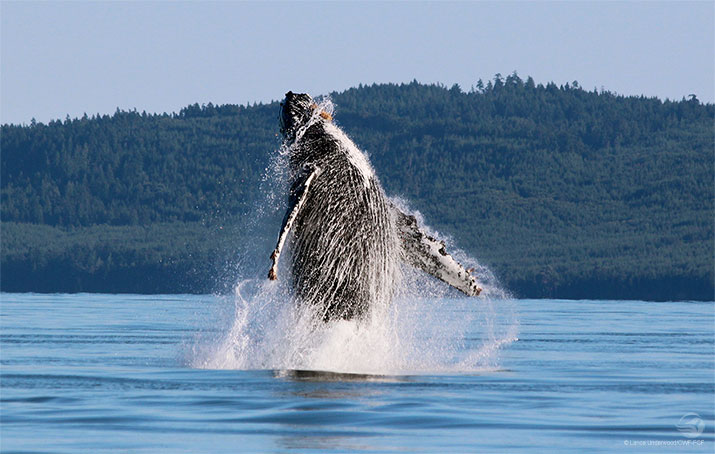
WILD Webinars
2025-12-05
With topics relating to conservation, wildlife and habitat, we provide a relevant online learning platform, typically for grades four to six but of benefit to any age.
-
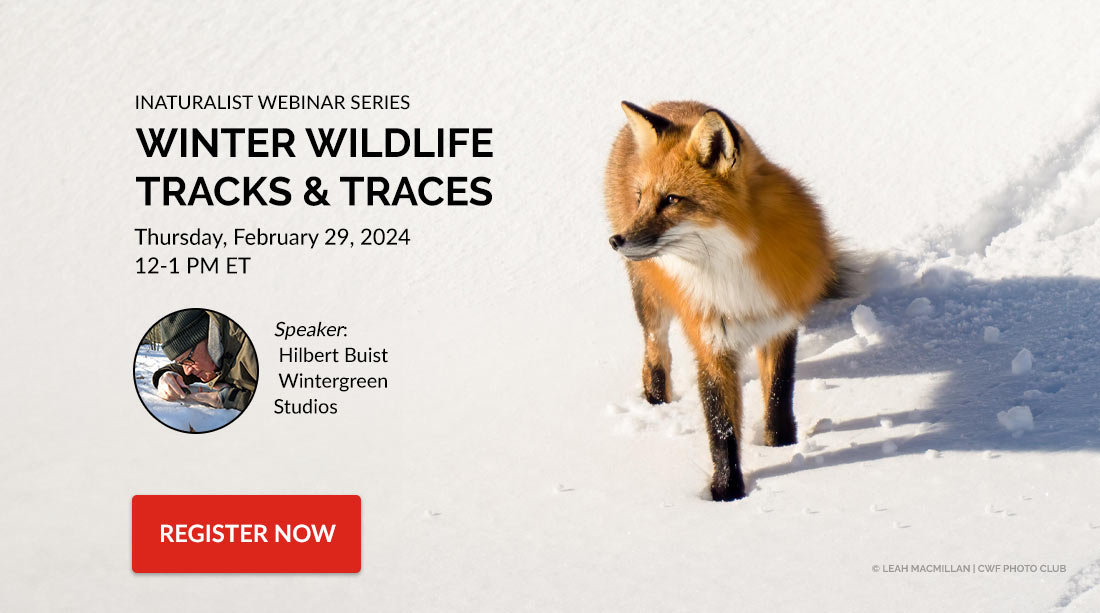
Winter Wildlife Tracks & Traces
2024-02-29
Explore the wide world of winter wildlife in your yard, down the street, in your local park or your favourite hiking wilderness by what they leave behind! Find out how birds and animals move and survive in the winter by examining their tracks and trails, browse and beds and scrapes and scat. Discover the difference between tracks of domestic dogs and cats and the wildlife who live among us but we hardly ever see.
-
-
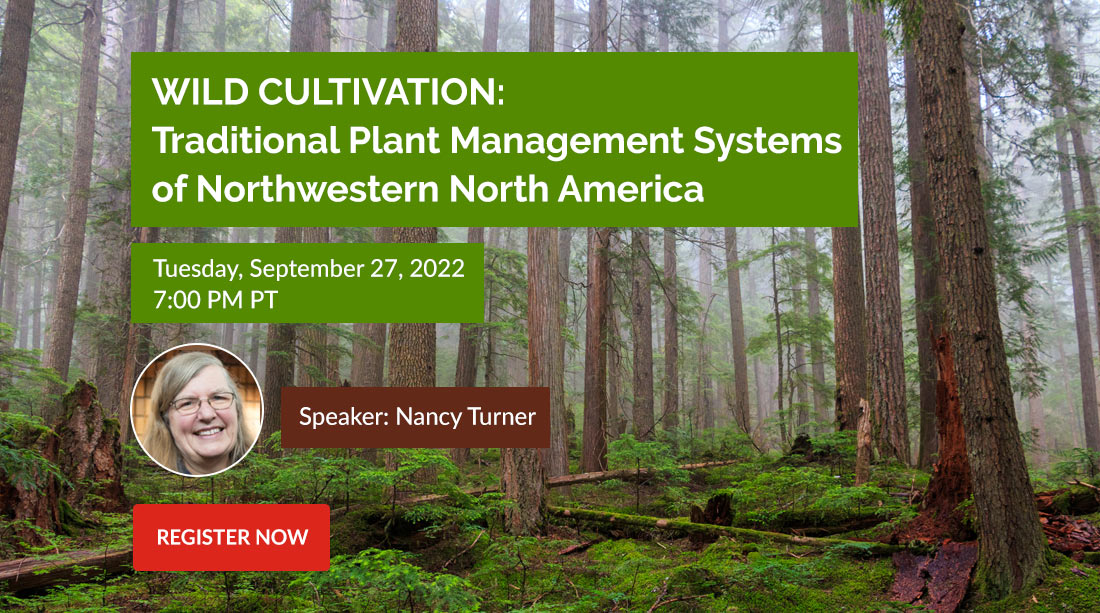
“Wild cultivation”: Traditional Plant Management Systems of Northwestern North America
2022-09-27
Please join CWF Tuesday September 27 at 7:00 p.m. Pacific Time (10 p.m. Eastern Time) for a very special presentation with Nancy Turner, an award-winning ethnobotanist who has worked with Indigenous Elders and knowledge holders in western Canada for over 50 years. Nancy will share her insights on how the cultural values of the Indigenous Peoples in the Northwest have enhanced both the health of the land and their harvests. We hope you will join us for this special event! About Nancy Turner: Nancy Turner is an ethnobotanist, and Distinguished Professor Emerita, School of Environmental Studies, University of Victoria, Canada. She has worked with First Nations elders and cultural specialists in northwestern North America for over 50 years, helping to document, retain and promote their traditional knowledge of plants and environments, including Indigenous foods, materials and traditional medicines. Her two-volume award-winning book, Ancient Pathways, Ancestral Knowledge (July, 2014; McGill-Queen’s University Press), integrates her long-term research. She has authored or co-authored/co-edited 30 other books, including: Plants of Haida Gwaii; The Earth’s Blanket; “Keeping it Living” (with Doug Deur); Saanich Ethnobotany (with Richard Hebda), and Food Plants of Coastal First Peoples, and over 150 book chapters and papers. Her recent edited book is Plants, People and Places: the Roles of Ethnobotany and Ethnoecology in Indigenous Peoples’ Land Rights in Canada and Beyond (2020). She has received a number of awards for her work, including membership in Order of British Columbia (1999) and the Order of Canada (2009), honorary degrees from University of British Columbia, University of Northern British Columbia and Vancouver Island and Simon Fraser Universities.
- 0
- 1
- 2
- 3







